


Crusader Kings II: Dark Ages is one of the most curious and developed strategies of our times. As it often happens with such productions variety of possibilities is very large. This guide helps in catching them up, because in such a full of details game you can get lost. Even experienced strategists may have problems at the beginning. In this guide you will find not only basic rules but also ideas how to use them. But it's all is only a tip of a iceberg.
The most popular problems and doubts are included in the section Problem? which is in majority of chapters. Thanks to that, no strategist will have any problems with mastering the Crusader Kings II. Amount of available options will stop be frightening and become an useful tool for a player. This guide's assumption is make gaming more pleasant and intuitive.
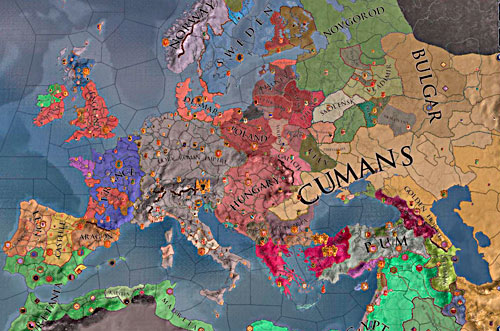
Guide's content:
For make text more clear, some things were marked with colors:
Green - abilities, features, laws
Brown - persons, titles, positions
Orange - buildings and its upgrades
Maciej "Czarny" Kozlowski ()
Crusader Kings II was thought as a sandbox what means that only from player depends what will be his goal. There is nothing against playing as a poor, devout count who cares only about his small piece of ground, then you can develop your domain, support sovereign and think about bright future of your children. If it isn't fulfill your ambitions, you can play as one of monarchs or even the emperor himself, but then you have to care about large intrigues, inside wars and making advanced politics.
As you can see, the game gives you lot of freedom: you can play both as a blood thirsty monster who desires only for new lands and subjects and as a wise, proud lord who gains influence thanks to clever marriages and conspiracy. Your country can be ruled with an iron fist and bribes or common distribution, every way has its pluses and flaws. Depending on your playing style you'll obtain proper nickname, from "great" to "mad".
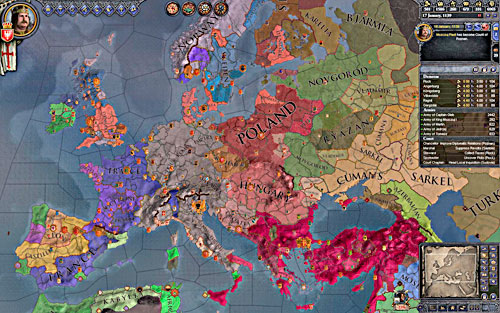 History can be changed.
History can be changed. Game's philosophy is very curious and original - it doesn't base on ruling a country but on developing your house. If it extinct (you have no legal descendants), the game is over. So one of the most difficult part of the game is to provide a worthy life to your clan. When you character dies, you continue the game from the perspective of his descendant. So it's not only about gaining as much power as you can - you also have to assure it to your children.
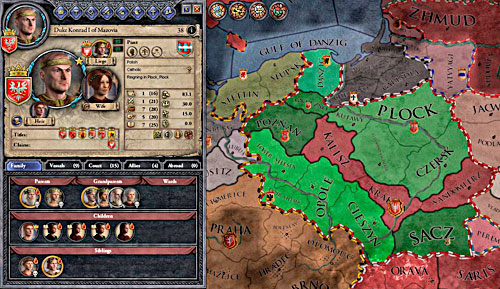 Maybe there'll be no Teutonic Knights in Poland?
Maybe there'll be no Teutonic Knights in Poland?Regardless of that you play as a emperor or a count, you have to think about the way of growing into power. Only then you'll be only to fight with others and don't get eliminated. It has to be marked, that raising children and planning some of their moves (like marriages) is a quite fun itself. Other things are explaining to child that he shouldn't attack other children and other is a determining quarrels between the members of a House. Who knows, maybe you'll have to kill one of them? Choice, as always, is yours.
Beginning the game, you can choose one of the hundreds available characters: from counts, dukes or kings to the emperors themselves. But variety of contest doesn't end on it, you can choose random historical period (from between 1066-1337) and geographical region. Every choice has direct influence on the shape of the play and possible challenges: you play different as a earl in divided Ireland and different as a Byzantium ruler who has to fight with hordes of pagans. The historical period itself affects the political situation on the map, for example from 1218 you meet Golden Horde and from 1225 Teutonic Knights. So depending on what kind of style of a game you like most, choose the more appropriate option for you. Below you'll find lot of advices and suggestions which should make your decision easier.
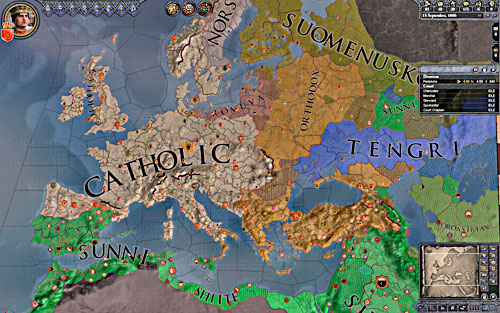 Catholics and Orthodoxes are the only available factions.
Catholics and Orthodoxes are the only available factions.So, start from the fact that you can play only Christian rulers. In practice it means that you can't play as a Muslim or pagan, bit nothing stands against playing as a heretic. From the obvious reasons (no legal descendents) you can't also play as a Church Leader. It's also meaningful, because to get rid of someone in the hereditary line it's enough to nominate such person a priest, you don't have to kill him. It's wider described in the chapter Heredity.
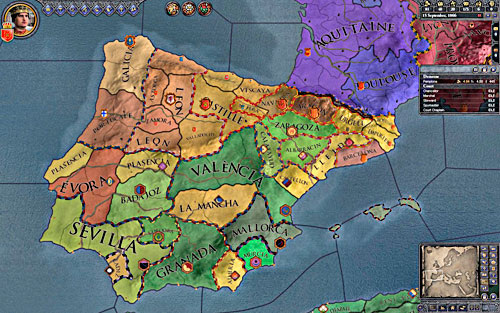 Iberian Peninsula is the most politically dangerous place in Europe - a perfect place for us!
Iberian Peninsula is the most politically dangerous place in Europe - a perfect place for us! Also choice of a region affects type of play greatly. Countries and lands on the border of Christianity (Iberian and Appeninian Peninsulas, Byzantium) are propositions for players who like more aggressive politic and constant wars (mainly with infidels). Those who prefer more peaceful ways may think about more central localization of their lands, like in Sweden, Holy Roman Empire or France. The state between are countries like Poland, Hungary and Denmark which have both potential of peaceful development (Christianity civilization) and free expansion (closeness of infidels).
Count is a worst situated from all available characters. Such person has usually one to few estates (counties) and are addicted from some sovereign, who can force his will. Your beginning options are rather small, you can develop your estates, build new structures, declare wars to others, participate in sovereign's rules by voting and slowly strengthening your position. The biggest counts' advantage is a fact that they have their own, personal army and they don't have to rely upon vassals. In other words: monarchs and dukes can have bodyguards only if they are counts simultaneously.
Another count's value are finances. Counties produce quite big profit and estates of higher level (duches, kingdoms and empires) almost nothing. That's why every monarch has at least one county.
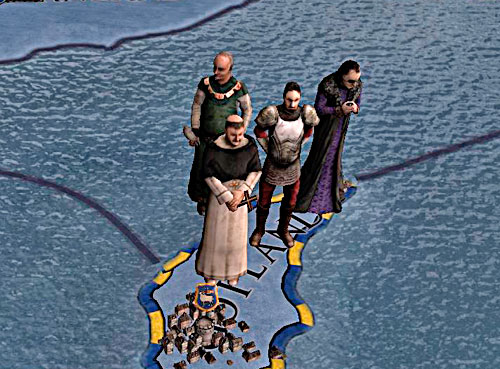 Another plus: count's clerks can concentrate on developing all his domain (for example one county).
Another plus: count's clerks can concentrate on developing all his domain (for example one county). Counts are a good choice for beginners. Not much responsibilities let you learn the game in calm way. It's also easy to reach honours, because monarchs rather eagerly make marriages with counts Houses counting on taking over your domain. Count is also a curious proposition for those who likes challenges, because there is nothing better than starting as a count and finish as emperor. Such type of promotion is possible but it won't happen without special diplomatic abilities and clever marriages and sometimes assassinations. Armed attacks won't succeed: the sovereign can crush you easily.
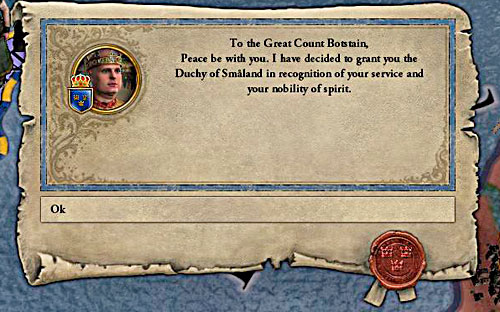 Counts are meaningless so monarchs give them privileges very often
Counts are meaningless so monarchs give them privileges very oftenThe basic problem during playing as a count is his small meaning in the world. Little amount of army and moneys excludes an expansion and lack of estates, spreading your authority. It's also dangerous to stand against your sovereign - if he isn't glad of you, he may declare a war what will end in only one way. In case of counts who have only one province, you need to be sure that your subjects won't rebel. If they take over the palace, there'll be a coup (and you'll die in tortures). How not let this happen and lead your House to the victory, you may read in a Riding on a Top: Count chapter.
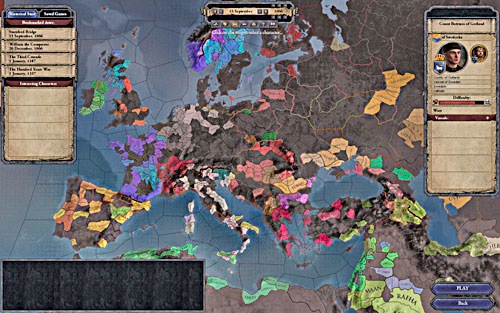 Counties anno domini 1066.
Counties anno domini 1066.Counts for beginners:
Scottish, French, Burgundian, Scandinavian.
Counts for advanced players:
German, from east Europe and Balkans.
Counts for experts:
Spanish, from southern Italy and Byzantium.
Duke has a domain consisting of few counties which all together are called duchy. There is no upper limit of possessed duchies, because they aren't count into demesne size (look at: Basics: Resources) and thanks to that they aren't an obstacle during reigning the country. Most of dukes are subordinate to some monarch, but it isn't usually a problem. Although lack of independence you can make rather complex foreign policy and, what is more, count on your lord's support. Competences of a duke are rather wide, you can vote as an elector, wage a war, be in funds and even refuse an obedience to your sovereign what'll give you an independence.
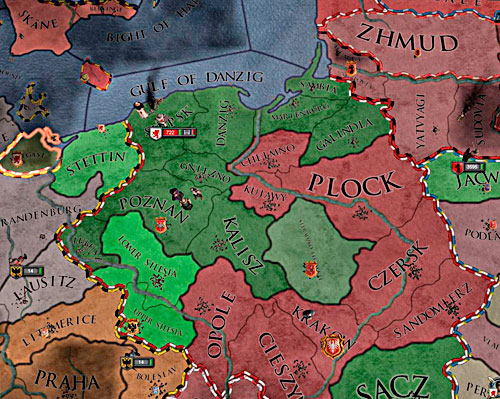 It happens that dukes (green) collect more power than a monarch (red).
It happens that dukes (green) collect more power than a monarch (red). Internal politics isn't too challenging on this level, but far more complicated than in a case of playing as a count. Duchy's lord has to care about subject's trust, without them he is no one. He can rule only thanks to his subordinates like counts, mayors and bishops etc. Without them, duke will be out of not only army, but also moneys (only counties generate meaningful amount of them). Preserving peace in your country is a very important part of the game.
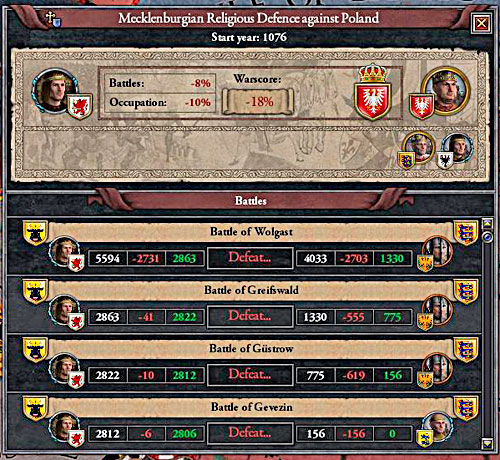 Sovereign's wars are also his vassals wars.
Sovereign's wars are also his vassals wars. As dukes are important figures, they can easily cumulate the power, both thanks to the marriages or the military strength. Keeping balance between internal and external politics is a key to the success. If you provide a peace in your domain, you may count on expanding it. Big plus for playing as a duke is an assurance in a person of your sovereign, who can help you in a case of fatal loses on the front (king also takes care about rebellions). On the other hand, if your relation with the monarch is bad, you can predict war or assassination. Another flaw is a fact that sovereign can recruit part of your troops in any moment and use it to complete his own goals. You have no influence on that, it depends on your relation with the sovereign and the law. You can read how to handle this in a chapter Riding on a Top: Duke.
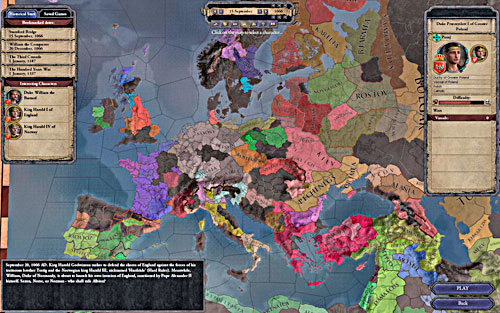 Provinces in 1066.
Provinces in 1066.Dukes for beginners:
French, Polish, from Gaul and Scandinavia.
Dukes for advanced players:
German, from eastern Europe, Italy, British Islands and Balkans.
Dukes for experts:
Spanish, from south Italy and Byzantium.
Kings are rather the most important characters in the game. There are also emperors who are able to control monarchs indeed, but their power is rather weak. King's possibilities are really huge. Besides all privileges which all lower status persons have, they are noble. Most members of the House have a title of "prince" or "princess" what makes marriages easier (everyone wants to have some blue blood in the family). Monarchs can control dukes and force them theirs will instead of conquering them. Kings as the only ones besides emperors, can decide about investiture (nominating Church's clerks) and define level of crown authority (look at: Laws: Royal Laws).
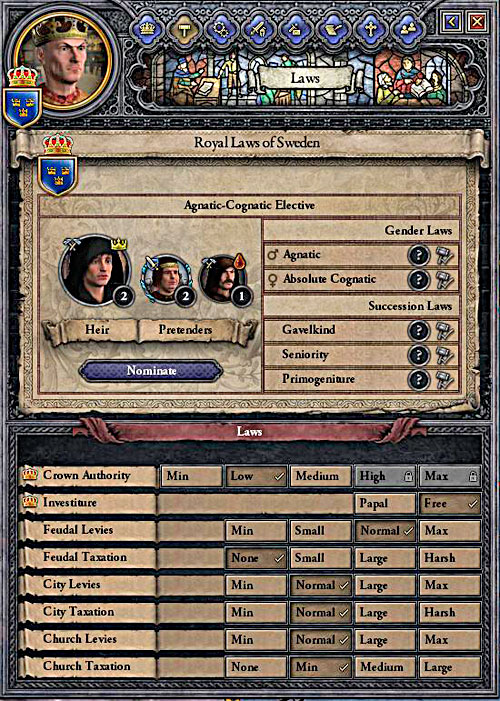 Only crowned heads can decide about investiture and crown authority.
Only crowned heads can decide about investiture and crown authority. Issue of heredity in case of monarchs is very complex. It can have different forms from primogeniture to an election (in other persons it's usually the gavelkind - right, in due to the oldest son has a superior authority over the rest, and the fortune is divided equally among them). Playing as a king or queen you have to always remember about assuring a crown to your children. Also crown authority is used to this task - it's a tool defining hereditary rules comfortable for you. The most important here are the rules of succession which are described in the House: Succession.
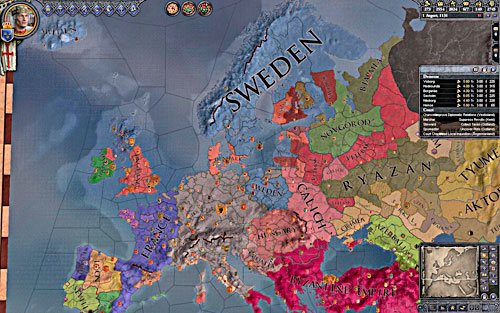 One king can have few crowns but he can't be superior to other monarchs.
One king can have few crowns but he can't be superior to other monarchs. Although monarchs have lot of power, they have to deal with a possibility of losing it. All his subjects want to stab him in the back, because everyone of them has own ambitions and goals, some for sure wants to take over the crown. So internal politics is as important as an external one for the king, because he have to control his vassals and look after in a many ways to limit their power. There are various ways you can do that: long and exhausting wars, assassinations, bribes and estates' disposing. The last one is the most dangerous, because it can lead to the situation that the vassal will have more power than a king himself. That's way we have to care that they have a good opinion about us. Also laws are useful, but there are double-edged (look at chapter Laws). How to rule your kingdom properly is described in a Riding on a Top: King chapter.
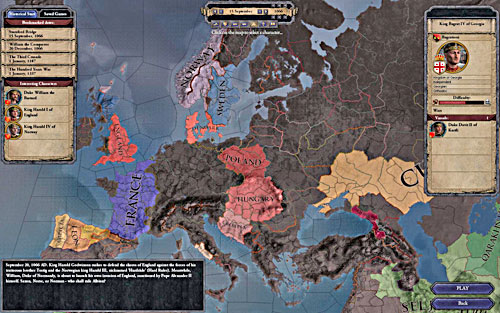 Monarchs aren't numerous but very important
Monarchs aren't numerous but very importantKings for beginners:
French (before a Hundred Years War), Polish, Hungarian and Scandinavian.
Kings for advanced players:
Croatian, Scottish, from Balkans (in later period of a game).
Kings for experts:
Spanish, English (in 1066), Georgian and from Jerusalem (during crusades).
Emperors are the highest level within heroes of Crusader Kings II, both at the power range and difficulty. German and Byzantium Empires are so huge, that managing them is quite a challenge. It's not about the size of it itself but also about number of vassals (every has its own ambitions). Such state of things allows emperors make a little of attention to the external politics. Their main issue is keeping the crown and life, because they have powerful enemies inside the Empire. It touches especially lords of Holy Roman Empire: their authority is weak and their vassals ambitious and powerful.
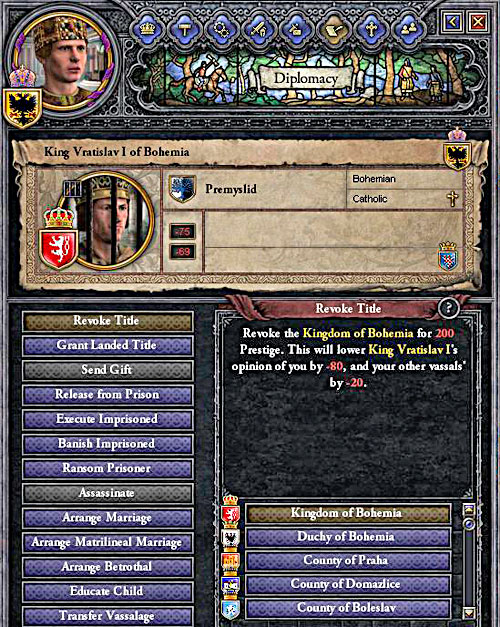 Emperors can not only take over crowns but also changes monarchs into vassals.
Emperors can not only take over crowns but also changes monarchs into vassals. The basic problem during playing huge empires is a assure the power to your descendants. You can make it only according to the election laws, but those require permissions from electors, who have no interest in strengthening central power. That's why an emperor has to be clever as a fox and strong as a lion, because he won't handle this issues without all webs of intrigues and creating many exhausting, mainly internal, wars. But killing the electors won't solve the problem, because the right to vote will go to their descendants and imprisoning won't take away from them it. As you can see, playing as an emperor is a proposition for very patience and tough players only.
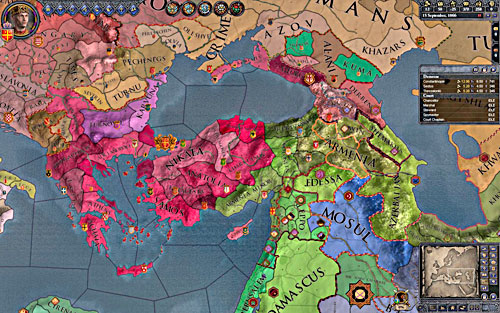 Emperor's land is divided between several dozen of vassals. Sometimes it's hard to handle this.
Emperor's land is divided between several dozen of vassals. Sometimes it's hard to handle this. What you receive in return? Mostly an opportunity of ruling over kings. Emperor can conquer every kingdom and addict its ruler from him, just like the king force it to the duke. But in such case you have to count with another problems. Vassals of defeated king will be pas problematic as those in your Empire. That's why sovereign should care about creating some smaller domain which will be directly addicted from him. I mean group of counties and duchies from which emperor will gain money and army. More about this you can find in Riding on a Top: Emperor.
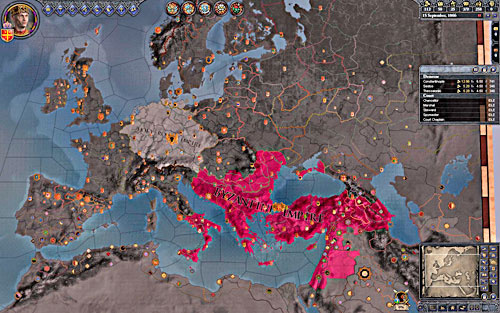 There are only two playable empires. You can't create new ones.
There are only two playable empires. You can't create new ones.Empire for advanced players:
Byzantium Basileus
Emperor for experts:
Germany Kaiser
Besides sandbox mode of game, Paradox's programmers prepared also a number of smaller campaigns, what means some particular persons and problems you should handle. Most of campaigns have a really big level of difficulty, what makes them a challenge for those bored with building their own domain.
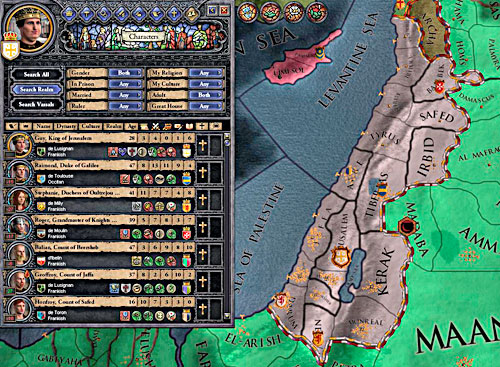 Although scenarios suggest choice of persons and kingdoms, there is nothing against choosing other ones.
Although scenarios suggest choice of persons and kingdoms, there is nothing against choosing other ones.
Available campaigns:
- Stamford Bridge
- Wilhelm the Conquerer
- The Third Crusade
- A Hundred Years War
Solutions to all scenarios you can find at the end of this guide.
As in every strategy from Paradox, in Crusader Kings II you have to use resources to develop your domain. But on the contrary to most games you do not operate on wood, stone or food but on some symbolical resources affecting hero's opportunities. The list of all goods gathered by the player you may find in the upper right corner of the screen.
 From left: wealth, prestige, piety, demesne size, realm size and score.
From left: wealth, prestige, piety, demesne size, realm size and score. Wealth - measure of actual richness of the character. Kind a currency using which you can solve most of problems in the game. Every county generates some amount of cash, depending on quality and fortune of infrastructure and governor's abilities. The biggest moneys you can gain from cities smaller from bishopric and the least from castles. You also pay soldier's pay in gold: be careful with mercenaries, because they can rip every treasury. During the game pay attention to having at least 50 coins, what is a cost of an assassin who often is a best way to solve problems. How to gather gold is described in the chapter Economy.
Prestige - measure of fame and character's meaning. For this resource you can buy many different things: it's required for a chancellor who fabricates documents, calling up the antipope and many actions resulting from random character of a game. You gain prestige thanks to the victorious battles, random events, won wars and some amount of it is also generated by possessed and depended estates. High prestige affect also your vassal's attitude. In the moment of character's death all his prestige is added to the score. So it's a crucial resource.
Piety - defines level of religiosity of the character, affects esteem he has within an elite of the Church. Piety points are given mainly for interactions with Church persons (especially the pope). They are required for example for divorces or asks for cancelling the excommunication. You gain piety also thanks to conquered and depended bishopric, personal features of the character and his storyline choices. But the most piety points you can get in co-operating with the Church (crusades, distribution of land to the priests). The last one is even profitable if you can give an investiture, what allows you to choose personally next administrators for your churches 9it also decreases pope's meaning as a political opponent). In the moment of death, all piety points are added to the score, like in the case of prestige.
Demesne size - sum of all cities, bishopric and castles you have. Duchies, kingdoms and empires don't count in. Every character has a limited amount of estates he can control. If he cross it over, his lands will be tormented by bandits, thieves and other problems. There are two ways of increasing this limit: distributing the land to your subject or a marriage. The crucial thing is not letting a woman to have a land: after a marriage it will belong to her husband (unless the marriage was made in a matrylinear way - look at the chapter House: Succession).
Realm size - sum of the cities , bishopric and castles possessed by the player and all his vassals. This measure has no real influence in the game, but it was observed that the higher domain, the bigger chances for profitable marriage.
Score - sum of a piety and a prestige of all characters you've played during the single game. The only one goal of score is to defining the quality of a House, because at the end you can compare your result with the Houses judged by the Paradox studio.
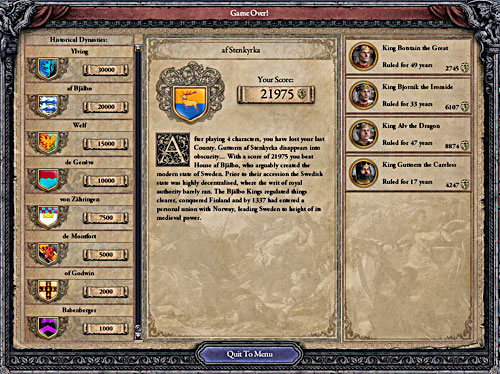 Sum up screen after the end of the game.
Sum up screen after the end of the game.
I have problem with understanding the basic rules. What to do?
First of all, read slowly and with understanding this whole guide. Here you have almost every dule described: from those basic to those complicated. It's recommended to read it in a sequence of chapters, but sometimes it's better to start from a section Glossary.
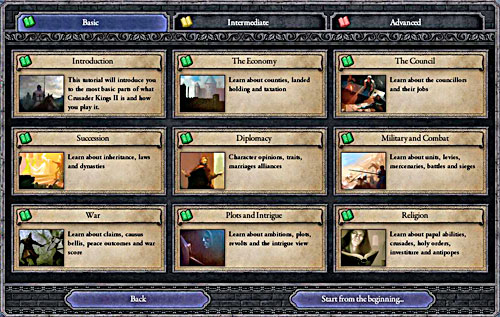 There is a very useful tutorial in a main menu.
There is a very useful tutorial in a main menu.Besides, basic rules were also described in the instruction added to the game and in the tutorial. In this guide you'll find mostly things which are lacking in those places and how to use them.
Family is all, not only in the Italian mafia, but also in the Crusader Kings II. During the game you control representatives of the House. It's not hard to find out that caring about family's future is a absolutely base of a success. Player should steer his hero and members of the dynasty in a way of protecting his lands from the civil fighting and separatism. It's not an easy task, and you'll find detailed advices further.
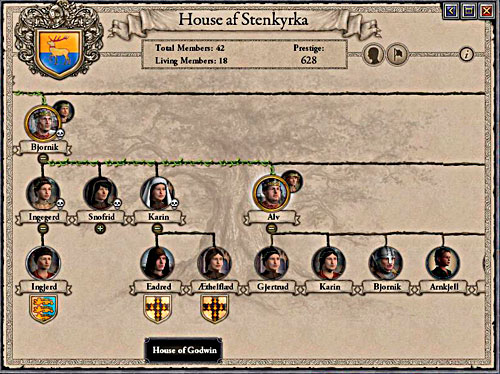 If a man decided on the matrylinear wedding, his children will belong to the wife's House.
If a man decided on the matrylinear wedding, his children will belong to the wife's House. You are aware how the new children come out on the world: the same happens in the world of game. But the important thing is to plan vital forces of main hero and your subjects in a proper way. Persons with small chances it's best to isolate or put aside (e.g. calling up homosexual or priest), and the most hedonist guard against temptation, because bastards can fight for the crown very hard.
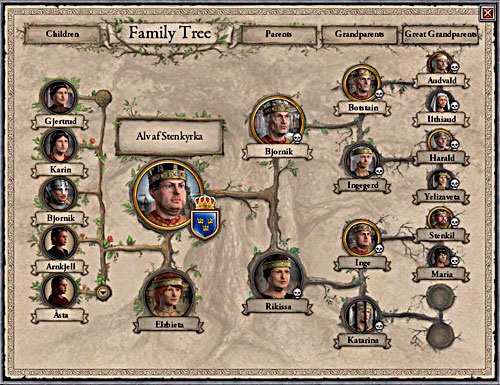 Remember about the roots!
Remember about the roots!But unfortunately dynastic politics is a two-edged. On the one hand, having big family provides you a lot of marriages (so allies and opportunity to aspire for another crowns) but on the other hands it stimulates House's members to fight between them. It becomes problematical especially when you play a long time a some in a row. In such situation there are lot of candidates for a crown, because those aren't only sons but also their cousins, uncles etc ( at least in the primogenitural model - look at Succession). That's why it's good to bet on the minimalism: have a lot of daughters and only few sons.
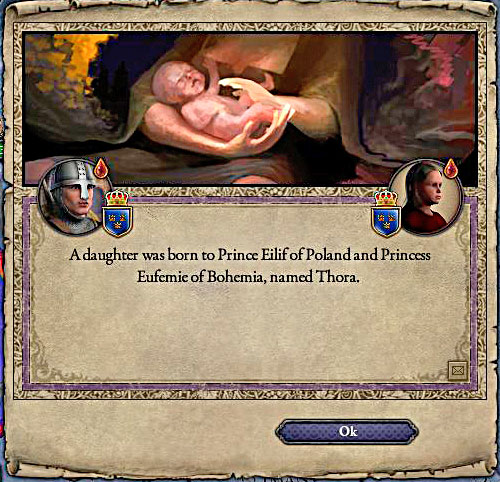 Children from normal marriages inherit the House after the father.
Children from normal marriages inherit the House after the father. You never know what will be the child's sex, it's generated randomly. So it's worth to save the game a moment before birth and loading until you'll get the sex you want. Usually it's better to have daughters than sons, because they have smaller rights to the throne what makes them less dangerous (if you didn't choose Absolute Cognatic Succession model, look at the Succession). Women additional advantage is a fact, that thanks to marriages they can provide very useful allies. It's very important to not let them have any lands, because after their wedding you lose them for the benefit of their husbands (to avoid that, you can use proper protection - look at Laws chapter).
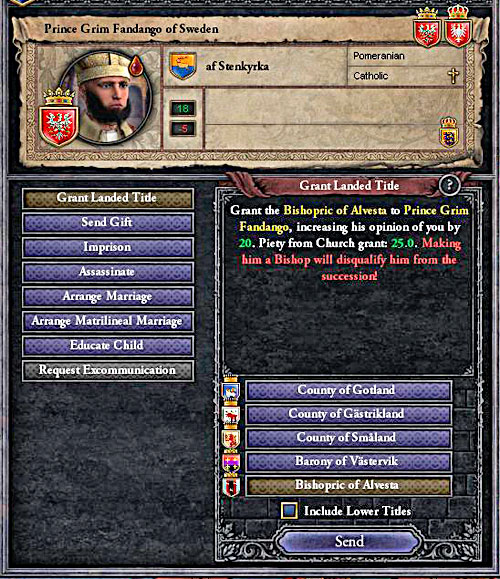 Confering a bishopric is the easiest way of eliminating someone from the succession.
Confering a bishopric is the easiest way of eliminating someone from the succession. About sons: it's enough to have one or two. First option secures you from a fratricidal fights, but has an option of defeating if the only one descendant will be murdered. The second option is profitable in a case of danger of assassination or when the one son is for example ill. Two men in a house is a big problem, you may be sure that the family will grow across, increasing a number of uncles, cousins, nephews and other potential candidates to the throne. That's why you should nominate your younger son for a bishopric, he'll have no legal descendants in that case. If the firstborn died, you would take from the second one all the bishop's estates and give others. Then the celibate won't be obligatory.
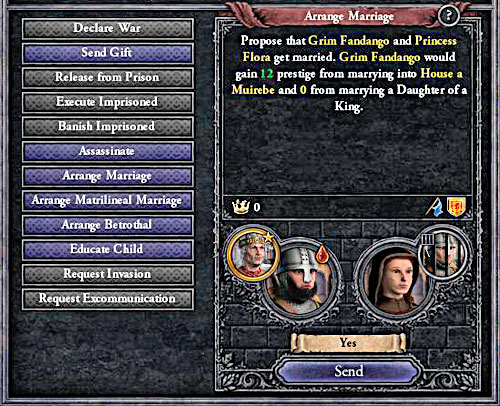 The same son can make a marriage after confering a bishopric and still develop the House.
The same son can make a marriage after confering a bishopric and still develop the House. About the quality of the family stands not only number of members, but also theirs abilities and statistics. Children inherit only part of attributes after parents, many of them depends on upbringing. So very important is educating you descendants. More about this you'll find in chapters Diplomacy: Children's Education and Characters: Individual features.
Giving a power to the descendants is one of the most game's element. The most comfortable situation is of course, when the crown come straight from the king to the oldest son, without any voting and additional problems (like fratricidal fights). Unfortunately, the reality of Crusader Kings II is rarely comfortable and steady. Characters constantly throwing the logs under the player's legs, forcing him to think and balancing between influence zones. It's even more problematic since the succession laws can be changed only after completing six assumptions:
* actual ruler didn't change any succession law earlier
* he has reigned at least from 10 years
* there is a peace
* there is no regency
* vassals aren't fighting between themselves
* all vassals have positive opinion about the sovereign
Completing all of this assumption is a hard task, so in the Problem? section you may find few useful tips.
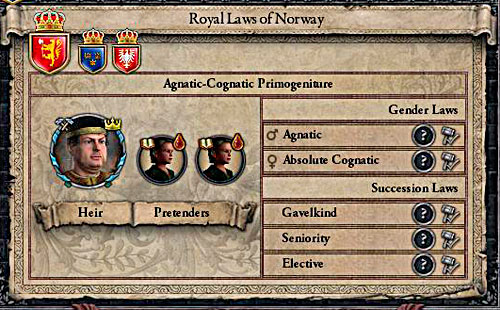 Many kingdoms mean many political systems.
Many kingdoms mean many political systems. Every kingdom you possess can have individual succession laws. It means that the king of Poland and Lithuania can subordinate to the primogeniture in one and to the feudal elective in the other. Each of those countries is treated separately, there is even no common laws about the heir's sex. Its consequences is a fact, that after taking the power in particular domain, you have to usually try to make a proper position for your descendants.
There are no doubts, that some political systems are more profitable for the monarch than the others. On next pages you'll read about all available succession laws. This issue is often problematic for the players, so I'll pay an attention to it.
Primogeniture is a rule according to which, the oldest son of the monarch takes all of father's titles. It's the most comfortable option from the available (of course from the player's perspective), but it causes much of rumors between monarch's sons. This fact gives a reason to have a minimal number of masculine descendants and few daughters (jump to the chapter House: Basics). Primogenitural model meets also a big aversion of nobles, so it's possible to realization only in countries with strong central power.
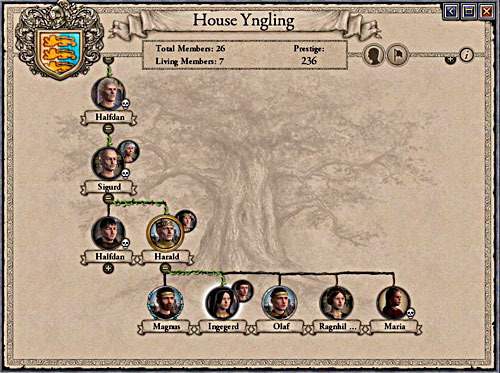 Son of Ingegerd and her husband (player) will inherit the throne after murdering Magnus, Olaf and Haralda.
Son of Ingegerd and her husband (player) will inherit the throne after murdering Magnus, Olaf and Haralda.Primogeniture is the simplest and the most intuitive system of succession, useful not only for kings but also for players who want to climb on the career levels. If this system is the actual one in the country, it's enough to marry one of ruler's daughter and then kill all her brothers and older sisters. In that way the second or the third generation you will gain the crown. More about it, you'll find in House: Marriages.
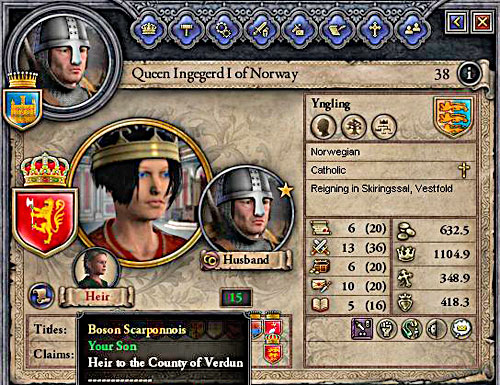 Thanks to the marriage with the queen of Norway, poor count may provide a crown of Scandinavian country to his son.
Thanks to the marriage with the queen of Norway, poor count may provide a crown of Scandinavian country to his son. Primogeniture requires high or absolute crown authority.
Seniority is a law according to which the oldest member of the family inherit all titles of the dead sovereign. It's very uncomfortable rule, because makes the oldest one is a successor and white-haired characters tend to die quickly what causes a chaos in the country. All the more that during the few first years of new ruler's reign there is a bigger probability of vassal's rebellion. In such case, the greatest danger for the player is his oldest son, who will try hard to take over the power and without hesitation starts civil war or coup d'etat. What is curious, often it's profitable to let him win, because the young has a chance to change the political system if that's why he began the war.
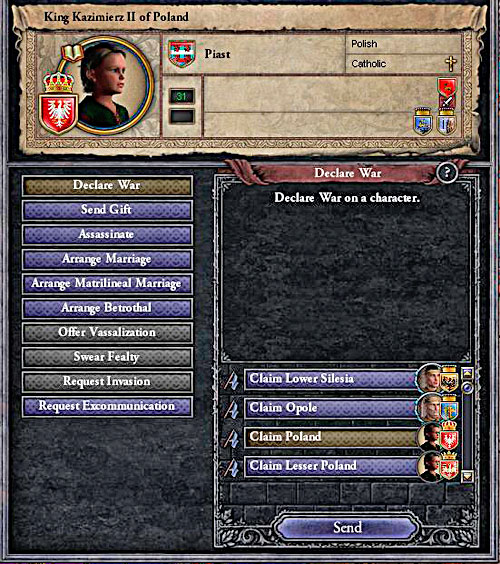 If you aren't patience enough to slaughter dozen members of the family, you may begin the war for the rights for your favorite one.
If you aren't patience enough to slaughter dozen members of the family, you may begin the war for the rights for your favorite one. Taking over the power in such country is rather problematic (if you want to make it in the peaceful way). Usually you have to follow the family tree of the House you are interested in and then find the common ground (moment, when the man from your House and the woman from the chosen one have a marriage). Next you have to count all persons above this point. All those persons should have been killed or distributed a bishopric. Then you should get rid of all men in this House. Only at this point taking over will be possible, what, as you can see, isn't that simple. What is more, the situation is even more complicated if the country has a agnatic succession law. In such cases the only way is the matrylinear wedding, which is rarely acceptable for the men. That's why an open war is often the better solution.
Requires medium, high or absolute crown authority.
Feudal elective is a rather common and simultaneously very problematic political system. Electors voting decides who will seize the power after the sovereign from all the vassals (ruling family members and king's council are also taken into consideration). Such fact makes the crown going from one House to another, what plunges the country in the chaos.
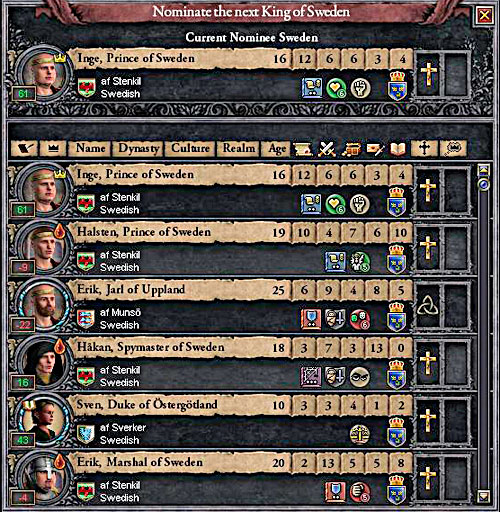 Electors are not only landowners but also members of the ruling family.
Electors are not only landowners but also members of the ruling family. Electors are always the persons standing a level lower than the ruler. So when it's about king's succession the electors are all dukes, archbishops and doges. Similarly: about dukes decide counts, village headmen and duke-bishops and about counts: majors, barons and bishops. The only exception are emperors who have to take into account not only votes of kings but also dukes with the biggest amount of lands. Besides all those people, right of vote and election have also members of the ruling House.
Description of all feudal ladder you may find in Glossary: Titles.
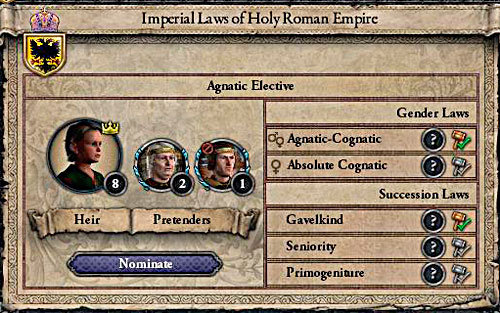 In big countries election is the worst possible political system - you have to change it quickly.
In big countries election is the worst possible political system - you have to change it quickly. If the ruler has a big authority within his vassals, elective system isn't his biggest problem, because everyone will vote just like he wants to. It's much worse if there are different groups of agents of other monarchs in the country. There is no chance for agreement and losing of the crown is almost sure. In such way you should change the system or bribe electors with moneys and land distribution. Despite pretences the first way is much more profitable.
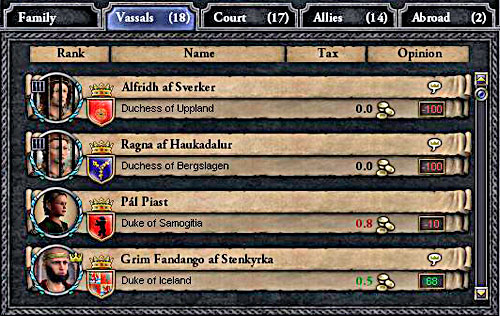 Imprisoned electors still have a right to vote (an icon of the crown at the right).
Imprisoned electors still have a right to vote (an icon of the crown at the right). Taking over the country with such system is quite a challenge. Family links has almost no meaning in this case, it only means that the player can be a one of the electors or ruler's relative. It results from this that if you're playing as a duke inside a kingdom with such political system, gaining a crown should be relatively easy. In worse situation are the Houses outside the kingdom, because they cannot be electors and seizure the power is almost impossible (at least to the moment, when they become a ruler's vassal).
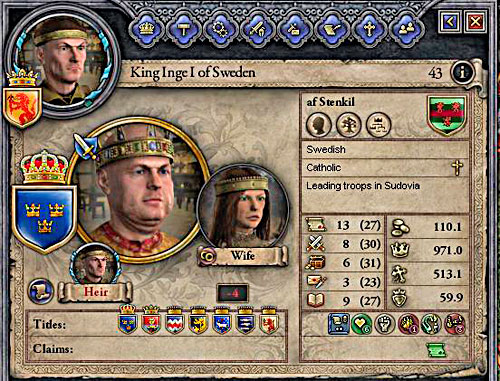 If you're an elector, you should convince counter candidates of you and then kill the king - the crown will be yours.
If you're an elector, you should convince counter candidates of you and then kill the king - the crown will be yours. Requirements: none
Gavelkind is the most common way of inheritance. It divides father's land on parts for every son, but the oldest one is a sovereign (e.g. first-born became a king and his younger brothers dukes). It's much more comfortable than the seniority and election but less profitable than primogeniture. The basic problem here is a size of the family. The more men descendants, the more dismembered the kingdom is. To prevent it, you should develop your House properly ( House: Basics). Some plus of gavelkind is a fact that the ruler can possess 30% more estates without penalties to the prestige for sons without land.
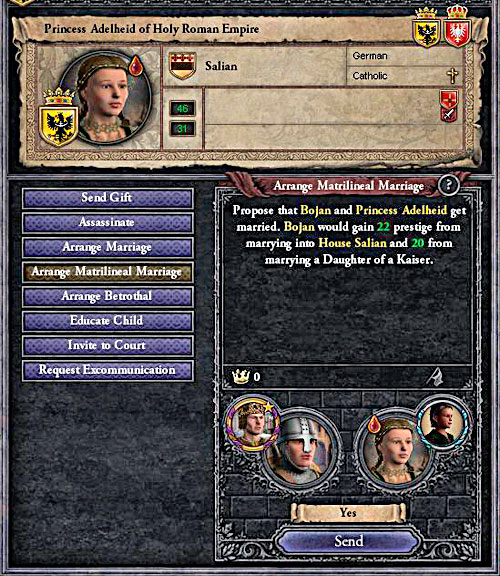 1. Invite third rate duke of Croatia on the court. 2. Arrange the matrylinear marriage between him and your daughter. 3. Kill all the older brothers of the prince. 4. Play as a prince's son, who is a Croatia king.
1. Invite third rate duke of Croatia on the court. 2. Arrange the matrylinear marriage between him and your daughter. 3. Kill all the older brothers of the prince. 4. Play as a prince's son, who is a Croatia king. Gavelkind isn't a problem for players who try to takeover the power thanks to the marriages, just do like in the case of the primogeniture (screen above). After gaining the crown, it's worth to strengthen the position of your House.
Requirements: none
A law, according to which only men can inherit. It's the most comfortable option from all, because it protects the kingdom from the enemy's intrigues. It's not hard to see that the kingdom with such political system can't pass to the other House thanks to the marriages. Unless you agree on matrylinear marriage, what is a very stupid idea.
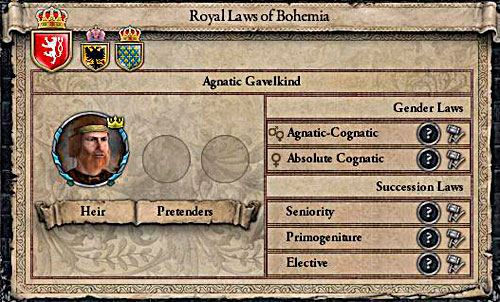 Men succession makes good in all political systems.
Men succession makes good in all political systems. The biggest flaw of such succession is a great risk, because when all of your masculine members of family dies you'll lose the rights to the kingdom in which agnatic succession is obligatory. So be careful and have at least two masculine descendants (House: Basics).
According to this law, women can inherit only in the situation when there is no masculine descendants. It's the most common preference of the sex, which guarantees safety to the family but makes enemy's intrigues easier. Thanks to that rule acquiring the crown is relatively easy, it's enough to marry king's daughter and kill all her brothers and older sisters.
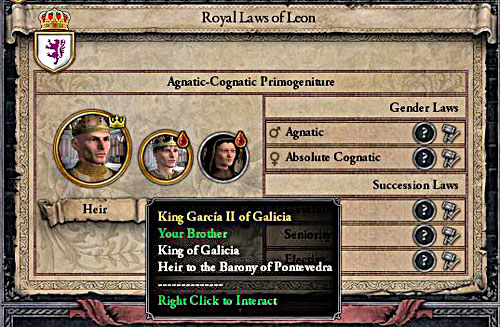 On the Iberian Peninsula accumulating power thanks to the marriages is a simple thing.
On the Iberian Peninsula accumulating power thanks to the marriages is a simple thing. According to that law, women inherit the crown at the same rules what men. Only characters with Basque culture can take this option, but it isn't any quality. The main problem with the absolute cognatic consist in that just few men agrees to the matrylinear weddings, which are the only ones profitable for a player in this situation.
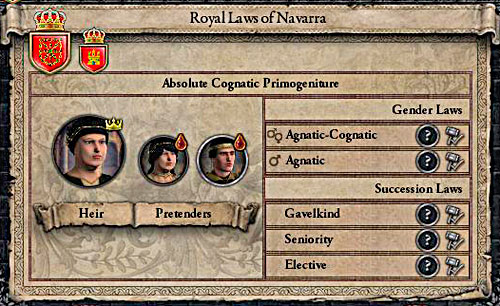 Woman-heir is a problem. Always.
Woman-heir is a problem. Always.Especially problematic is a situation in which there is a queen. If she had a normal wedding, all her children will inherit house after the father. As you can easily imagine, such situation may lead to the instant failure. On the other hand, if you play the character from the outside, in such way you may easily expand your territory.
Crusader Kings II offers few ways to the victory. To get a fame and honors you don't have to make wars or care about economy, you can sacrifice to the diplomacy. It's known that the pen is stronger than the sword, and this game confirms it. It's much easier to seize the kingdom with the smiles and daggers than in a military encounter. The crucial thing are marriages, the best expansion tool that have been ever invented. But to use it correctly, you need to know some basics.
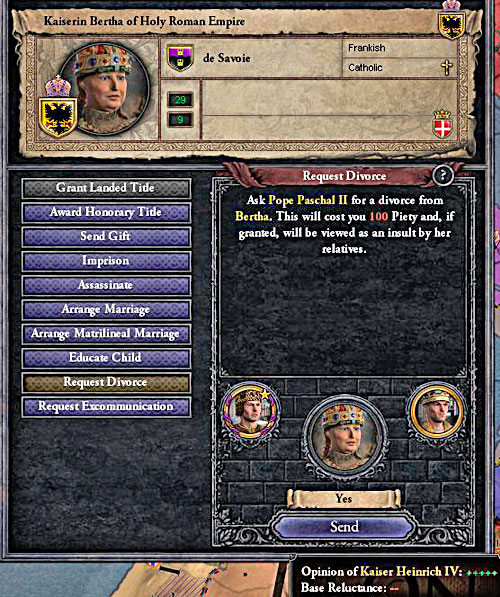 Every wedding should be considered, pope rarely agrees to the divorces.
Every wedding should be considered, pope rarely agrees to the divorces. There are three types of marriages: normal, matrylinear and betrothal:
Normal - the most common one. Wedding takes place between two adults, and children inherit the House after the father. If the wife possesses any land it goes to the her husband's House after her death (unless the law states say different).
Matrylinear - takes place also between adults, but children inherit all titles after their mother. Men rarely agrees to such weddings, because they have no profits from it. What is important, after the husband's death all his lands goes to the wife's House, what explodes the order in the kingdom.
Betrothal - it's almost normal marriage but between teenagers (or between a teen and an adult). Some plus of a betrothal is a fact, that you can easily convince your sovereign of. He'll agree sooner on sending his three years old daughter than the adult princess. Another advantage is that you can cancel betrothal what causes decreasing an authority in the cheated family, but it's better than the divorce or assassination.
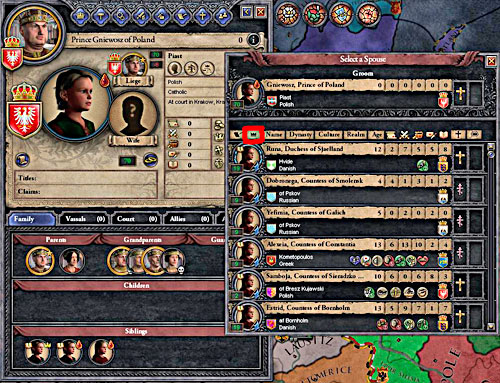 During choosing the spouse you can use filters.
During choosing the spouse you can use filters. Marriage is the easiest way to gain honours, but mainly titles, not the land. If the countess marry the king she becomes a queen consort, so the person without rights to the throne. Similarly: if a baron marry the queen, he won't become the king (and his son will) but only a king consort (look at: Glossary: Other titles).
Getting a duke title means so far that it makes the diplomatic relations easier. But much more important are possessed lands, so during planning the marriages take into account what the particular character has and if it gives perspectives for gaining more power for your House. Crucial is also an issue of alliance. Good marriage provides alliance with the secondary persons (look at Diplomacy: Alliances). How to cumulate estates thanks to the marriages, you can read in the next chapter.
Intercepting the power with your own House isn't difficult, but it's time In this chapter you will find the method according to which you may easily and comfortable take over the honours without any battle.
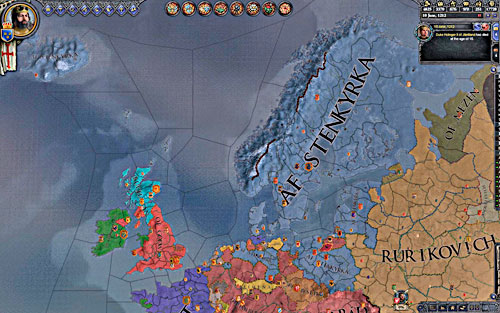 House of Stenkyrka that is how to become the king.
House of Stenkyrka that is how to become the king.Main character of this story is a count Botstain of Gotlandi, poor noble standing on the lowest feudal level. Due to few clever tricks, he achieved the highest honours, including the Norway's crown. Here are his steps:
1. At the beginning Botstain decided to marry the Norway princess, Ingegerd, daughter of the king Haralda. Besides chance for a throne it assures an alliance with the old monarch (screen below).
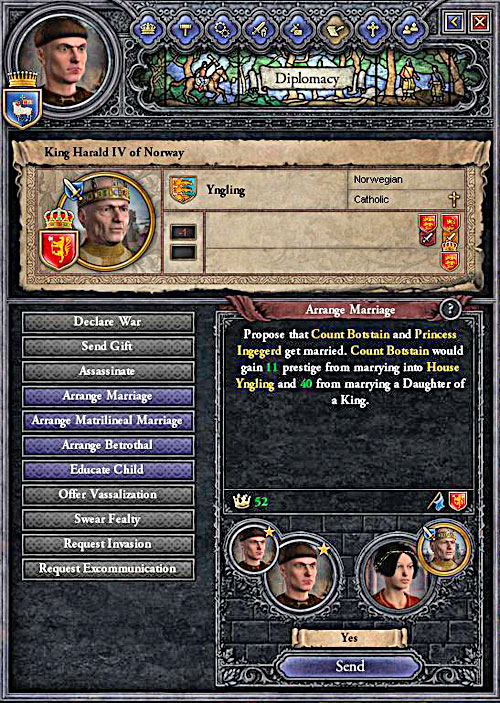 Beauty and the beast.
Beauty and the beast.2. Following years of Botstain's reigns in Gotland give him a title of duke of Smaland (he got this after the intrigue) and few children with the firstborn Swenik (screen below).
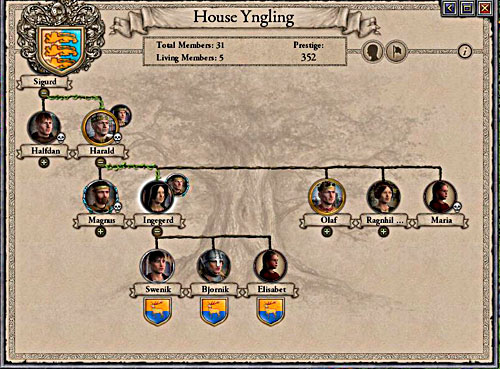 After Harald's death, the crown of Norway went to the Olaf, Ingegerd's brother.
After Harald's death, the crown of Norway went to the Olaf, Ingegerd's brother. 3. Observation of the chart above leads to the simple conclusion: in Norway we have election system because after Harald's death (reminder: father-in-law of the main hero) crown goes not to the eldest member of the family nor to the firstborn son (in both cases: Magnus). If there would be a primogeniture or principate in Norway, it would be enough to kill king's Olaf children and then him. Ingegerd (main's hero wife) would take the power then and the problem will be solved. Unfortunately, election forced other solution: bribing all the electors. When they decided that after Olaf the Ingegerd will take the reigns, there was nothing to do besides killing the king.
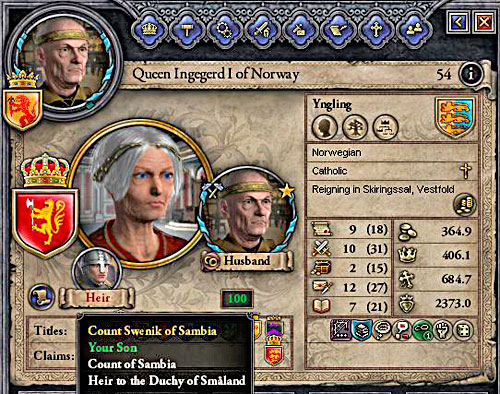 Years are passing by.
Years are passing by. 4. Ingegerd has seized the crown after murdering the king. It was only half a success, because Norway still isn't in hands of Botstain's House, but in his wife's (and even this until the moment of her death, when electors will choose the new ruler).
Norway crown would be the Botstain's House only when the its masculine heir will take it (thanks to the election or changed succession law). This person would be son of Ingegerd and Botstain, Swenik, who achieved the crown thanks to bribes. It was possible because he was related to the queen and he could be considered as a heir during election (Succession: Election).
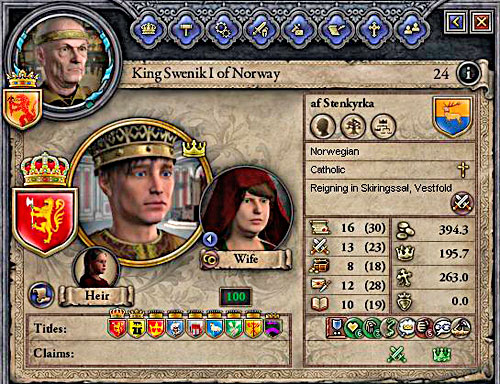 Daggers in the human's smile.
Daggers in the human's smile.5. After Ingegerd's death, Swenik took the crown of Norway. In this moment you just need to wait until the old Botstain dies and continue the game as a young, vigorous lord of the north. The first new regulation of the monarch was changing political system from an election to the principate, what solved the problem of future descendants.
I can't get marry, because the characters say that they "desire a better alliance".
It one of the most often problem that occurs in the game and there is rarely sth we can do. Even if you're a lord of the world you may hear this answer from the poor countess. Probably is kind a bug in the game, it's hard to explain it in other way.
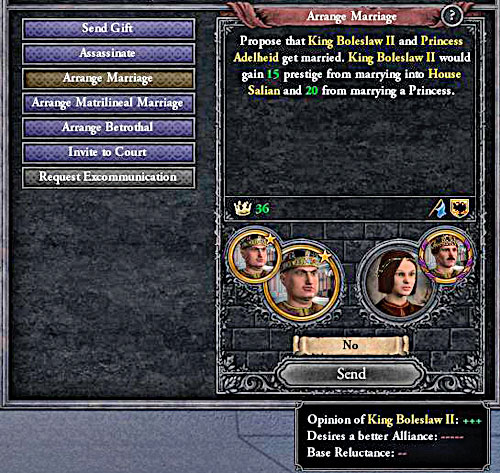 If the girl is stubborn, nothing helps.
If the girl is stubborn, nothing helps. Sometimes works the following trick: bribery, land distribution or upgrading statistics. But it works only sometimes in some particular cases.
I didn't inherit any title although I was a firstborn of the king. What happened?
Probably, the political system in this kingdom is an election or seniority, they are described in the chapter Succession. If there was a war before the father's death, maybe someone else took the crown. In such situation lurk into the family tree of a new monarch and check how much justified such action was.
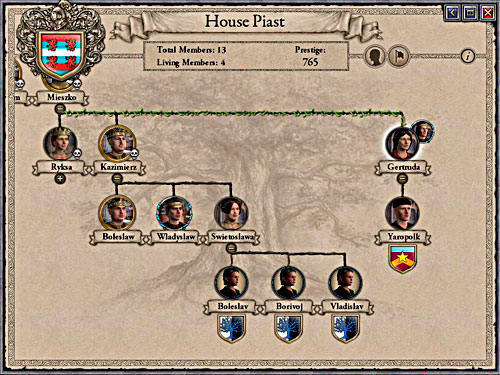 Family trees are real inheritance maps.
Family trees are real inheritance maps.
Crusader Kings II is somehow more a RPG than the strategy, because the human relations are the key to the victory. From what monarch you are depends almost all shape of the game. If you have to handle the strong opposition, there'll be internal wars, intrigues and murders. Sovereign who can count on subject's support, may manage his estates freely and think about expansion, not only diplomatic one, but also a military (the more support, the more army he get from the vassals). Every character has a window with his opinion among the vassals nearby the portrait.
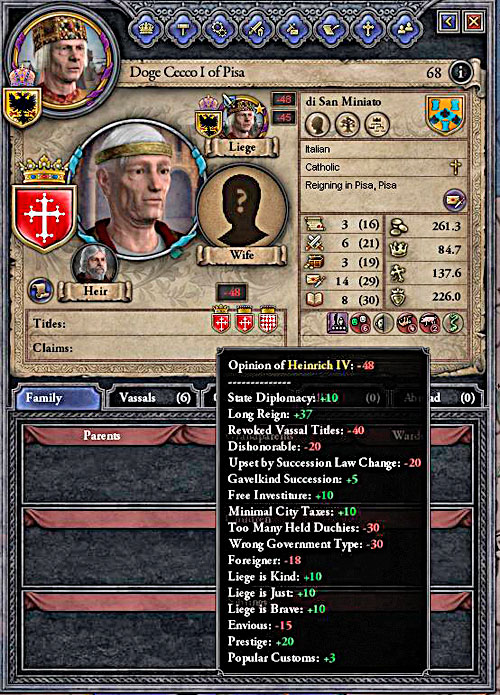 On vassals opinions affect many various factors.
On vassals opinions affect many various factors. And as far as providing the peace in the small countries isn't difficult, it grows to the level of challenge with the bigger empires. On character's opinion/authority affects many various factors from which every has meaning. There is no secret in fact, that it's much easier to lose support than to gain it, so read carefully all statements and make choices carefully. Most of them decrease trust of your vassals, but wisely played may assure you a success.
What can negatively affect on human relations? Besides random events like accusation of heresy, among all matters mainly issues connected with titles, estates and interactions. Obvious is that the imprisoned or insulted character won't be happy. If the sovereign decides to punish his vassal in unfair way (e.g. taking his lands away) all of the rest vassals also lose their respect to the ruler. Remember about that, because few unconsidered decisions may lead to the breaking the kingdom. Generally, taking the land away isn't a good idea, because both victim and his descendants will try to take it back, what may lead to the rebellion. So you should do that only when the vassal has to any lands (he is a danger) or he has only one estate. Although, even in such cases you should consider the appropriation and, first of all, do it only when it's justified. The reason is important, because it decreases the negative factor to the relations with the rest of the vassals (look at: Intrigues: Prisoners).
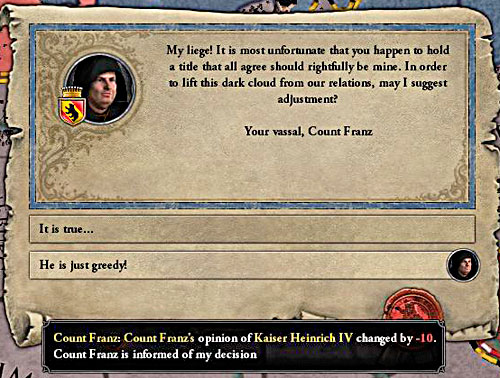 Vassals often claim sovereign's lands.
Vassals often claim sovereign's lands. Another matter important for the general image of the rules is a his demesne size. If the ruler cross it, vassals won't be happy. Similarly with the lands not counting into the general pool of lands, for example duchies and kingdoms. If you have few of them, vassals start demand them, what can be really destructive for the kingdom. In such case it's good to give additional lands to the heir. If it is impossible or uncomfortable (heir would have more lands than the father), you may distribute the lands to the vassals. It crucial, that they not consist of the their counts. In other words: you should care that the vassal has no rights to the counts in the given duchy . It's important as far as the fact that cumulated estates are more dangerous during the civil wars, because they generate more army and rebel all together. Rebelled vassal can recruit army only from his counts, not duchies. It's clearly seen during the game: owner of few duchies is less dangerous than the owner of few counts, because he has smaller military potential.
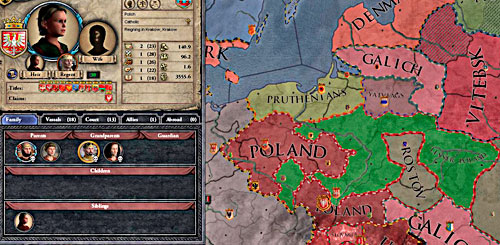 Awarding somebody with a duchy with his counts ends effects usually the civil war.
Awarding somebody with a duchy with his counts ends effects usually the civil war. Others factors that affect dissatisfaction among the vassals may be: loses of honour, excommunication, awful personality or short period of reigns. From all those problems only excommunication is easy to solve, you just need to ask pope to cancel it or call up antipope (look at: Religion: Antipope).
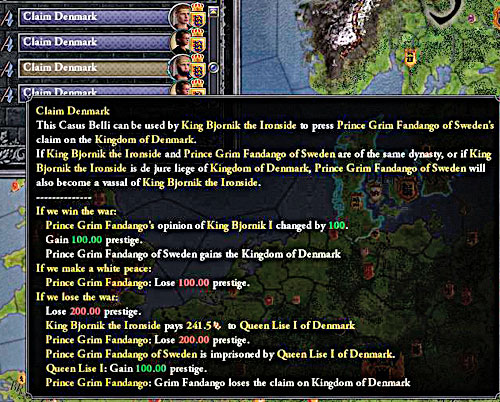 It's worth to make wars also if the crown is due to the descendants of the main hero.
It's worth to make wars also if the crown is due to the descendants of the main hero. What factors make the ruler being good seen by the vassals? Besides described distribution of the lands, it's worth to mention about the war for vassal's lands (screen above). If any of your subject has claim to any territories, you may do 2 in 1: assure vassal the power over the debatable terrain what improves your relation. Some minus of this solution is a fact that the respect marker changes when the war ends. So it may happen that the vassal rebel in the moment you're fighting for his rights. More about such wars you may find in the chapter Military: How to declare a war?
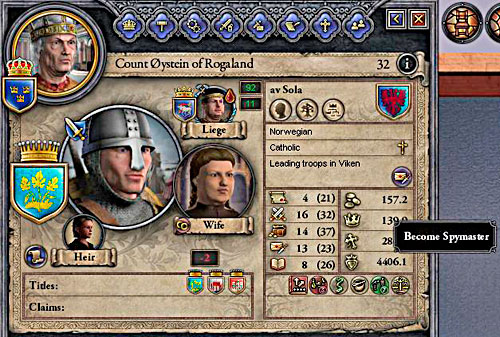 Vassal's ambitions are seen in his screen.
Vassal's ambitions are seen in his screen. Other ways to please your subjects are easier: you can bribe them, award with a title (look at: Characters: Titles), make them a part of a Council (look at Council), use the chancellor or fulfill one of desires. This last element is especially curious: many of characters dream about some privileges, like finding the proper wife or gaining the crown (screen above). Skillful accomplishing those desires may easily remedy even the big crisis in the kingdom.
 You can invite only characters with no lands.
You can invite only characters with no lands. But what to do, when all the mediation methods failed, most of vassals sit in the dungeons and sovereign has too many estates? In such cause, the only one possible solution is inviting foreign characters on the court and award them with the lands. You can do it on two ways: by clicking Intrigue button and choosing the proper person to invite (the person is generated randomly) or ask some courtier from the other kingdom (the screen above). The second one is more profitable, because you gain a character with the past and sometimes with the rights to the particular land. It's especially useful, when you think about expansion, you may fight for those lands (Military: How to declare a war?).
 Icon of clenched fist informs about possible rebellions.
Icon of clenched fist informs about possible rebellions. If you want to get rid of the problematic vassal and you don't want to imprison or kill him, you can pass him to one of your subjects (if they have higher rank). It's quite useful in a situation when one of yours barons wants to rebel and the civil war would be uncomfortable. In such case the best is to give him under the power one of dukes (screen below).
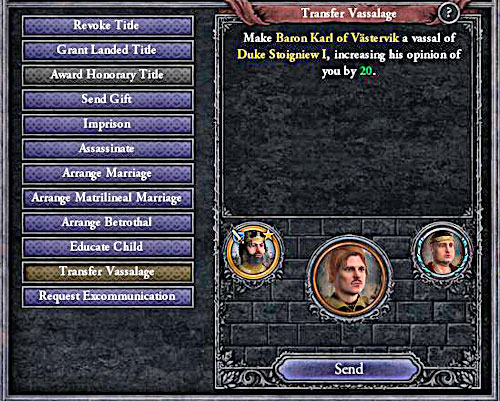 Relocation is a very humanitarian way of eliminating from the public life.
Relocation is a very humanitarian way of eliminating from the public life. It's little harder when the subject hates you very much, in such case even relocation may not help. Under such circumstances don't hesitate and kill, imprison or take his lands away.
One of a way to please your subject's anger is distribution of Honorary Titles. They differentiate from the Landed Title that there is no connection with lands/estates, they are only signs of respect. It's very cozy method, because you have no lose and it increases incomes, prestige and vassal's happiness.
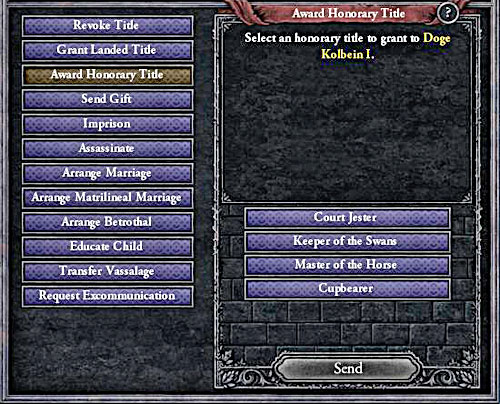 If bribes aren't enough, it's worth to distribute few titles.
If bribes aren't enough, it's worth to distribute few titles. Every title is unique, what means if you award one character with it, another one can't be awarded with it until the death of the first one. Most of title upgrades your relations with subordinates, but one, Court Jester, decreases them. So be careful and don't nominate some important person with that title. Unless you want to provoke him to rebel.
Below you find all titles. Values in gold and prestige are conventional, because it varies on the size of all country.
Honorary Titles:
Title
Action
Court Jester
Bonus to salary (in gold): +0,06
Monthly prestige: -0,03
-10 to opinion
Master of the Hunt
Bonus to salary (in gold): +0,02
+10 to opinion
High Almoner
Bonus to salary (in gold): +0,02
+10 to opinion
Keeper of the Swans
Bonus to salary (in gold): +0,03
+10 to opinion
Master of the Horse
Bonus to salary (in gold): +0,06
Monthly prestige: 0,01
+10 to opinion
Cupbearer
Bonus to salary (in gold): +0,15
Monthly prestige: 0,01
+15 to opinion
Seneschal
Bonus to salary (in gold): +0,20
Monthly prestige: 0,02
+15 to opinion
Every character has a number of statistics describing its virtues and flaws. All those values affect the game, ones influence interpersonal relations, others on the course of battles and next influence the spy actions. Proper personal politics is very meaningful for the kingdom's development, it's obvious that military men should be good soldiers and priests to be distinguished with the good education. Statistics are affected not only by the inborn values (inherited from parents) and acquired abilities (look at: Traits) but also by many external factors like excommunication and education. It means that the characters of the personages will change as the time passed by and the perfect spy may change in a total manta within few days. That's why you should follow character's statistics.
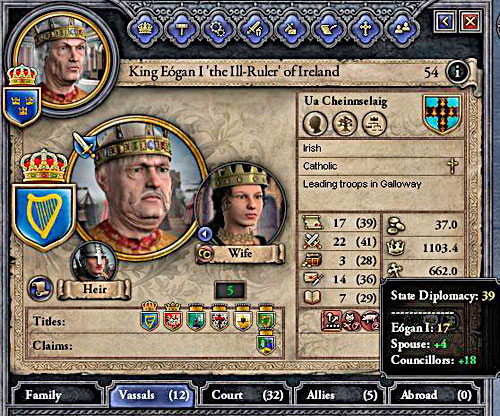 General value of the attribute is a sum of three persons' abilities: character, his wife and proper councillor.
General value of the attribute is a sum of three persons' abilities: character, his wife and proper councillor. Characters ruling some lands besides their personal attributes have also bonuses from spouses and councillors (screen above). Final value of the feature is shown in the brackets.
Below you can find the list of all features with the description:
Diplomacy - one of the most important feature of the main hero, affecting his opinion between other characters. It also the most important for the Chancellor.
Martial - affects directly the course of battles, increasing soldiers' morale. Important for the Marshal.
Stewardship - important feature of every lord, increasing income in gold. Increases effectiveness of the Steward.
Intrigue - the most important for the Spymaster. Chance for an successful coup you may increase by building spy network.
Learning - crucial for the Court Chaplain because it influences his actions' effectiveness. What is more, it increases speed of technological development in lands depended on you.
As far as the features decide about the success of the character's actions, the traits affects on the statistics. For example if the hero is cruel (trait) it'll increase his abilities (statistics) of Intrigue but decrease his Diplomacy. All traits you gain during the lapse of time, but some of them can be inherited. You may decide about your character's development only when you steer her or you're his (look at: Diplomacy: Education of children).
Traits:
Name
Comment
Effect
Ambitious
Ambitious rulers can achieve more
+2 to all features
Arbitrary
Justice has no secrets for you.
-2 to Stewardship
-1 to Learning
Attractive
Being cute is good!
+1 to Diplomacy
Bastard
Bastards aren't taken into the consideration during elections.
-1 to Diplomacy
Brave
Bravery is a virtue for the warrior.
+2 to Martial
Bubonic plague
Group and infectious sentence of death.
-7 to Health
Celibate
Not only for priests.
+1 to Piety (monthly)
No chances for descendant.
Clubfooted
Inborn flaw decreasing your mobility.
-1 to Martial
Content
Happy, easier to control.
- 1 to Intrigue
+0,5 to Piety (monthly)
Craven
Cowards aren't good soldiers.
-2 to Martial
Cruel
Cruelty is rather common in the middle-age.
+1 to Intrigue
-1 to Diplomacy
Crusader
Veteran of crusades is a symbol of a good warrior.
+2 to Martial
Cynical
Never enough of cynics.
+2 to Intrigue
-0,2 to Piety
Deceitful
May be useful but also dangerous.
+3 to Intrigue
-2 to Diplomacy
Depressed
If you don't want to live, everything is hard.
-1 to all features besides Learning
-5% to chances for descendant
-1 to Health
Drunkard
Second cup?
-2 to Stewardship
Duelist
Toying with weapon may be lethal.
+1 to Martial
Dwarf
Small persons are called "dwarfs".
-1 to Martial
Excommunicated
You are out of the Church.
-5 to Diplomacy
Fair
It's very effective against the other sex.
+1 to Diplomacy
Falconer
It's not only great fun, but also a respected ability.
+1 to Diplomacy
Gardener
Gardening is your favorite hobby!
+2 to Stewardship
Genius
Genius are commonly respected.
+2 to all features
Gregarious
Good mediator.
+2 to Diplomacy
Harelip
Harelip can be frightening.
-1 to Diplomacy
Hedonist
Partying and depravity are your favorite hobbies!
+20% chances for a descendant
-0,5 to Piety (monthly)
Homosexual
Shameful feature.
-15% chances for a descendant
Honest
Honesty can be both plus and a flaw.
+3 to Diplomacy
-2 to Intrigues
Huchback
Huchbacks aren't too attractive.
-1 to Martial
Hunter
It's joy worth of kings!
+1 to Martial
Ill
It's often a death sentence, there are rarely doctors in the middle-ages.
-1 to Martial
-10% chances for a descendant
-2 to Health
Imbecile
An idiot.
-2 to all features
Impaler
No one likes sadists.
+1 to Intrigue
Inbred
Frequent marriages within one House causes births of small monsters.
-3 to all features
-30% chances for a descendant
-1,5 to Health
Incapable
If you were seriously hurt in head or are old, it'll affect your lifestyle. Persons with this trait rules through the regents.
-6 to all features
-30% chances for a descendant
-3 to Health
Infirm
No chances for respect or glory.
-3 to all features
-30% chances for a descendant
-1 to Health
Just
Just is one of the biggest ruler's values.
+2 Stewardship
+1 Learning
Kinslayer
It was revealed that the person killed a member of the family.
-3 to Diplomacy
Legitimized bastard
Legitimized bastards are taken into account during succession but the flaw of iniquitous birth remains.
-1 to Diplomacy
Leper
Leper is horrible, untreatable disease. Often deathly.
-2 to Diplomacy
-20% chances for a descendant
-2 to Health
Lisp
Lisp doesn't help in communication.
-1 to Diplomacy
Maimed
Maimed heals very rarely and often lead to the death.
-2 to Martial
-2 to Health
Measles
Measles is unpleasant and quite dangerous disease.
-1 to all features
-20% chances for a descendant
-2 to Health
Mystic
Mysticism requires big skills, you have hide it before the Inquisition.
+1 to Intrigue
Paranoid
You have enemies everywhere - or you just think so.
+2 to Intrigue
-1 to Diplomacy
Pneumonic
Pneumonic is not only for smokers.
-2 to all features
-4 to Health
-50% chances for a descendant
Poet
Poetry is not only a key to women's heart but also useful diplomacy tool.
+1 to Diplomacy
Possessed
Possessed person behaves in weird, often harmful way.
Random effects, growing during the time.
Pregnant
Woman is pregnant.
The child will be birthed.
Quick
Dodgers have easier life.
+1 to all features
Scholar
Reading develop your imagination.
+2 to Learning
Shy
Shy persons aren't good diplomats.
-2 to Diplomacy
Slow
You're not the clever one.
-1 to all features
Smallpox
Powerful disease which kill almost half of infected.
-3 to Health
Stressed
Stressed heroes have problems with doing things.
-1 to Stewardship and to Intrigue
-10% chances for a descendant
-1 to Health
Strong
Physical power is not only respectable but also very useful.
+2 to Martial
+1 to Diplomacy
+10% chances for a descendant
+2 to Health
Stutter
Stuttering isn't a diplomat's feature.
-1 to Diplomacy
Syphilitic
Visits in brothels may end in very bad way.
-1 to all features
-20% chances for a descendant
-2 to Health
Trusting
Naivety may be funny, but it's rather dangerous.
+1 to Diplomacy
-2 to Intrigue
Tuberculosis
Not very lethal but dangerous plague.
-2 to Health
Typhoid Fever
Infectious disease.
-3 to Health
Typhus
Very dangerous, often deathly disease.
-3 to Health
Ugly
Fuuuuu!
-1 to Diplomacy
Weak
Weakness is a reason of being mocked. Maybe some war-training?
-1 to Martial
-5% chances for a descendant
-1 to Health
Wounded
Participation in tournaments, hunts and wars may end with an accident.
-1 to Martial
-1 to Health
Zealous
Fanaticism gives you enemies among fidels and allies among people of the Church.
+2 to Martial
+1 to Piety (monthly)
Sins and virtues:
Name
Comment
Effect
Charitable
Kindness increases popularity.
+3 to Diplomacy
Chaste
Virtuosity means marital fidelity, what decreases chances for bastards.
-15% chances for a descendant
+0,5 to Piety (monthly)
Diligent
Diligence is always profitable.
+1 to all features
Envious
Envy people detects intrigues easier but aren't popular.
+2 to Intrigue
-1 to Diplomacy
Gluttonous
Gluttony costs.
-2 to Stewardship
Greedy
Seemingly greedy isn't...profitable.
+10% to tax income
-1 to Diplomacy
Humble
Modesty and humility are very important for priests.
+1 to Piety (monthly)
Kind
Being kind earns you a subject's' love.
+2 to Diplomacy
-2 to Intrigue
Lustful
Lust being useful when you want many of descendants, but the Church doesn't like it.
+20% chances for a descendant
-0,25 to Piety (monthly)
Patient
Patience is a virtue for every ruler.
+1 to all features besides Martial
Proud
Vanity may be irritating but it gives you and ambition.
+0,5 to Prestige (monthly)
Slothful
Being a lazy man is a big flaw.
-1 to all features
Temperate
Moderation is a important virtue for every money-owner.
+2 to Stewardship
Wroth
Spitfires and their surroundings don't have an easy life.
+3 to Martial
-1 to Intrigue
-1 to Diplomacy
Besides skills you have thanks to your birth and education there are also some types of personalities to which your hero is ascribed in his 16th birthdays. Those types depends mostly on possessed attributes but also they come out from the mentor's character. Every type of personality has a few levels of advancement which affect hero's profile. List of all regularity you may find below.
Diplomats:
Name
Bonuses
Naive appeaser
-1 to Martial
+1 to Diplomacy
Underhanded rogue
-1 to Martial
+3 to Diplomacy
+5% chances for a descendant
Charismatic negotiator
-1 to Martial
+1 to Intrigue
+6 to Diplomacy
+1 to Learning
+5% chances for a descendant
Grey eminence
-1 to Martial
+2 to Intrigue
+9 to Diplomacy
+2 to Learning
+10% chances for a descendant
Warriors:
Name
Bonuses
Misguided warrior
+1 to Martial
-1 to Learning
+0,5 to Health
Tough soldier
+3 to Martial
-1 to Learning
+0,5 to Health
Skilled tactician
+6 to Martial
+1 to Intrigue
+1 to Stewardship
-1 to Learning
+0,5 to Health
Brilliant strategist
+9 to Martial
+2 to Intrigue
+2 to Stewardship
-1 to Learning
+0,5 to Health
Stewards:
Name
Bonuses
Indulgent wastrel
-1 to Diplomacy
+1 to Stewardship
Thrifty clerk
-1 to Diplomacy
+3 to Stewardship
+5% chances for a descendant
Fortune builder
+1 do Martial
-1 to Diplomacy
+6 to Stewardship
+2 to Science
+10% chances for a descendant
Midas touched
+2 do Martial
-1 to Diplomacy
+9 to Stewardship
+2 to Science
+15% chances for a descendant
Intriguers:
Name
Bonuses
Amateurish plotter
+1 to Intrigue
-1 to Stewardship
Flamboyant schemer
+3 to Intrigue
-1 to Stewardship
Intricate webweaver
+1 to Martial
+6 to Intrigue
+1 to Diplomacy
-1 to Stewardship
Elusive shadow
+2 to Martial
+9 to Intrigue
+2 to Diplomacy
-1 to Stewardship
Theologians:
Name
Bonuses
Detached priest
-1 to Intrigue
+1 to Learning
Dutiful cleric
-1 to Intrigue
+3 to Learning
Scholarly theologian
-1 to Intrigue
+1 to Diplomacy
+1 to Stewardship
+6 to Learning
+5% chances for a descendant
Mastermind theologian
-1 to Intrigue
+2 to Diplomacy
+2 to Stewardship
+9 to Learning
+5% chances for a descendant
My subjects keep rebelling, what to do?
The easiest thing is to take a look into the chapter How to care about human relations. If you didn't find a sufficient answer there, you would consider amount of lands you possess. If you have more than two duchies every next gives -10 to relations with vassals. Also having a kingdom may be irritating for your subordinates.
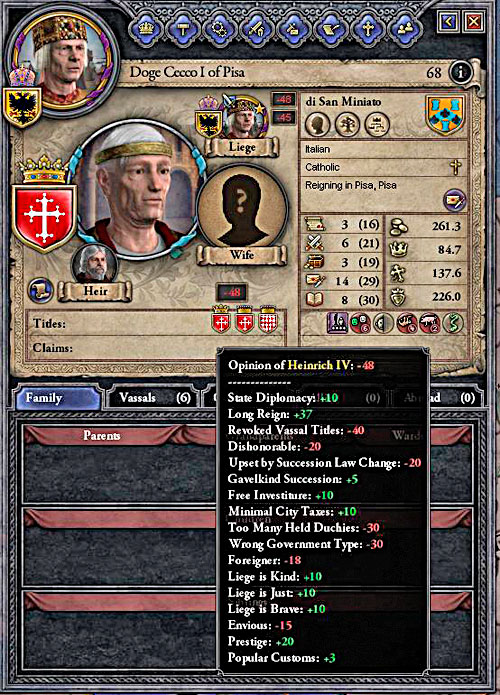 All characters show clearly what they are dissatisfied.
All characters show clearly what they are dissatisfied. The most often a desire for the crown of particular kingdom have its citizens (especially if you're "stranger"). Particularly frequently those are dukes having lands in the troublesome kingdom. You can solve it by titles distribution: to persons who want them (it'll calm them, but may be problematic in the future) or to someone completely else (hatred will concentrate on him).
Player has only three resources (money, prestige, piety), he doesn't have to care much about the development of the infrastructure, because this is mainly vassals' task. This general view is very simplified, and because of that it doesn't let you to advanced management. As it turns out, economic issues are presented in a curious and complex way. All of your lands can be developed by not only building new structures like cities, castles and churches but also by upgrading the existing ones (for example with walls or marketplace). Also technological level of particular land matters, because only adequately advanced lands can be developed. What is important, your incomes will be different depending on how well expanded particular province is and what is a relation between you and land-owners. Also the land's steward affects this (e.g. bishops are not good in managing castles). Also number of middlemen and natural conditions are important! So as you can see, economical issues aren't as easy, as you may thought.
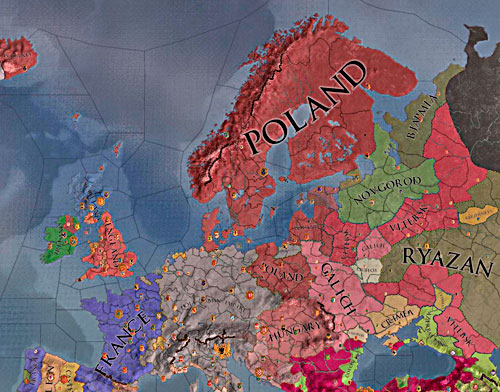 Big number of lands doesn't mean big income. Far more important is a managing your lands.
Big number of lands doesn't mean big income. Far more important is a managing your lands. I should begin from the fact, that the only one source of your income are counties (duchies, kingdoms and empires don't generate an income). Admittedly, some lower level structures (cities, castles and churches) gives you some money, but it's not a sufficient amount. For instance king possessing a village will neglect it and gain only a small percent of incomes which would earn a mayor (proper steward).
It has to be noticed that crucial thing is having as many counties as you can. They give you moneys thanks to which you can function deftly. You should be careful and not cross the demesne size, because if you do, the income will decrease.
Of course dukes also gain some part of subjects' incomes but only if they're not kings. If you're a monarch, the duchies give no real income besides the prestige. Underline once again: kings do not gain any moneys thanks to the duchies and kingdoms.
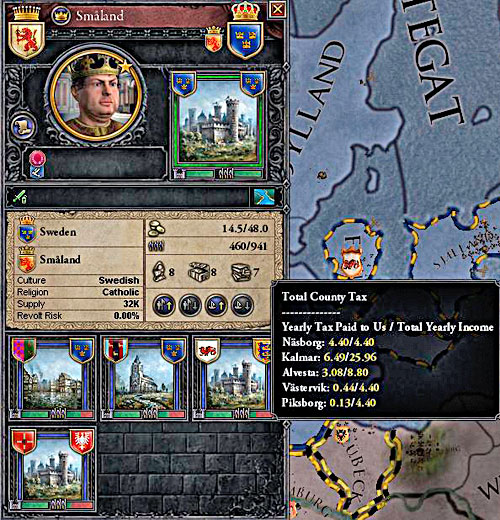 Only a small percent of incomes goes to the king, the rest stays in the middlemen's hands.
Only a small percent of incomes goes to the king, the rest stays in the middlemen's hands. But whatever you may look, the gold is only one resource. What about others?
A number and quality of your lands has almost zero meaning for piety points but it matters greatly for the prestige. Every estate generates some points of prestige monthly (the bigger land, the more points). In practice it means that kingdoms give more than duchies and those give more than the counties. Also how much particular land is depended on the player matters: those directly yours will produce more prestige than those which are indirect (e.g. you're a king but the particular county belongs to your subordinate count). Although, creating kingdoms or duchies from the counties isn't always profitable. The more land you have, the more dissatisfied and desired for the estates your subjects become. And this affects not only income but also safety of the country. That's why it's good to limit an amount of higher titles you have to minimum. For instance, being a king of Poland you shouldn't create the Lithuanian kingdom from your terrain on the east, because they're depended on you as a matter of fact. It would be profitable if there was no chance for rebellion or you were going to share your domain on two equal parts (e.g. for your sons).
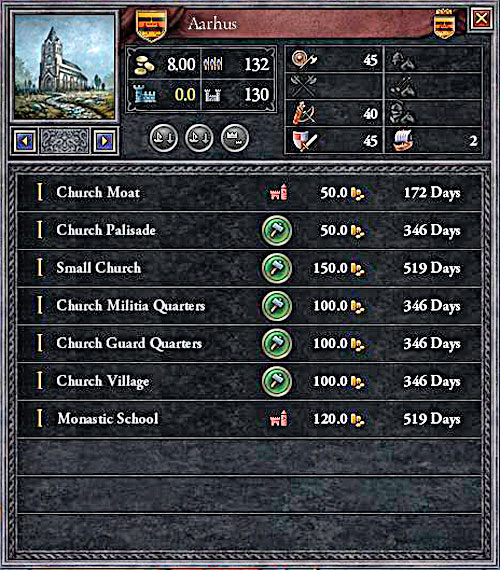 As it is seen, the bishoprics don't increase your piety.
As it is seen, the bishoprics don't increase your piety. Piety, the third resource, is generated by the interaction with the people of the Church. The most of it you may gain thanks to the crusades, fighting with infidels and land distribution for clergy. In this last case you must be careful, because bishops have their own politics and if you don't have a investiture law you won't be able to nominate them by yourself (what opens you on the external influences).
About how much moneys the count can provide decides not only the fact of possession but also level of development and existing laws (look: Laws: General laws). Important is a number of castles, cities and bishoprics and their development. Every from the mentioned structure provides other profits. Fortresses guarantee lot of warriors but not lot of money whereas cities provides lot of gold and big fleet but only few soldiers. Bishoprics are in between, assuring both gold and warriors.
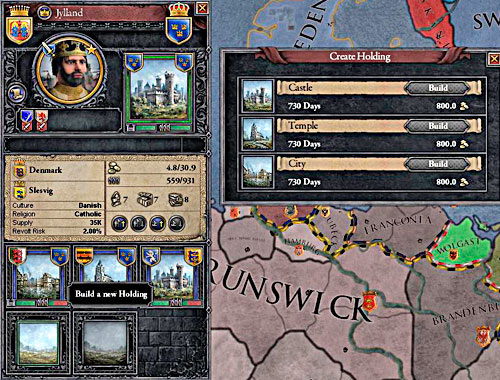 To build a new structure you have to mark the count and then click on the empty place in the province screen.
To build a new structure you have to mark the count and then click on the empty place in the province screen. In every county (also dependent on indirectly) you may construct new structures, but every next will be pricier about 100 coins. Usually it's worth to develop your counties as much as you can, thanks to which you may create strong country. But remember not to award your subordinates with too many expanded lands at once (it's preferably that one character doesn't have more than one city/castle/church) because sooner or later it will be dangerous. What is important, it's more profitable to develop your lands than those belonging to your vassals. In such way you avoid middlemen, what maximizes your incomes.
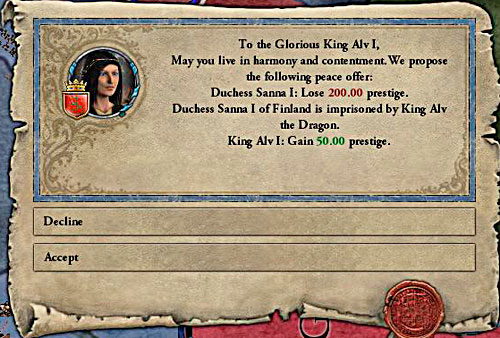 The main structure is always the most important one, upgrading its is very profitable.
The main structure is always the most important one, upgrading its is very profitable. Built cities, bishoprics and castles may be developed on various ways. Different cultures and religions have other bonuses and structures, but all are depended on the technological level of the county. The higher it is, the better (and pricier) buildings you may have and the longer time it takes to construct them. If you don't have lot of money, you should focus on upgrading those existing structures, because many of them are cheap and very useful. Particularly it's worth to upgrade main structures (in the right upper corner of the county window, screen above) because they are ascribed directly to the player and can't rebel. It's crucial during civil wars, since it let you generate high incomes and big armies despite war chaos.
 If the vassal rebelled and was defeated during the war, you can take away one of his land.
If the vassal rebelled and was defeated during the war, you can take away one of his land.But sometimes happens that despite advancement and structures, the income from the county isn't satisfactory. Reasons can be various. You need to remember, that if the estate belongs to the vassal, your incomes will be always smaller. Even so, it's not always good idea to take the land from the vassal, because it may end with a rebellion or a civil war. The problem doesn't exist if the character was a traitor and attacked you. In such case you can rob him without any consequences (look at: Intrigues: Prisoners).
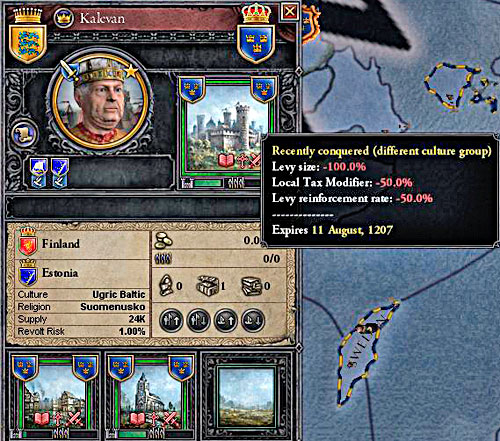 Game always informs you what the incomes are low.
Game always informs you what the incomes are low. Other factors that affect incomes from the province, are internal reasons like culture, religion and dissatisfaction. If the county was recently conquered, the citizens won't want pay to the new ruler. Similarly, when your culture or religion is different. Problem with war solves automatically: after some time peasants get used to you. It's a bit worse in case of religion. To convert citizens you have to send there a court chaplain to begin proper actions (Head Local Inquisition). While with the culture you can do nothing. Sometimes population will take your customs, but it's rare. Alternatively you may send there a steward who has a same culture as the citizens, but it's dangerous. During a war, he will have a strong support there.
I don't have a money, what to do?
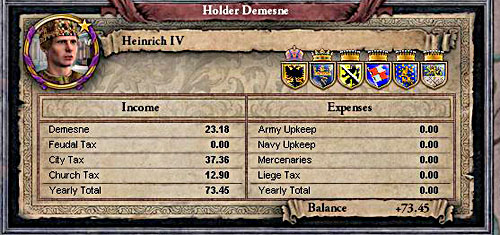 Information about incomes you may receive by clicking into the shield of one of your lands.
Information about incomes you may receive by clicking into the shield of one of your lands. First of all, invest in building increasing an income. It's a big investment which pay itself back very quickly. Other solution may be gaining lot of counties, from which every produce some income. And if even this is not sufficient, you may support yourself with laws, especially those concerning taxes. It's also worth to check why our earnings are so small: maybe it's because of big armies, mercenaries or the character of possessed lands (weakly inhabited, citizens are infidels). More details in the chapter Economy: Developing of lands and increasing incomes.
Is it possible to create new landed titles?
Of course. If you have a territory which is included into some bigger duchy and which hasn't been legitimated yet, you can create such duchy (the same with kingdoms).
 Creating new titles is often profitable.
Creating new titles is often profitable.If the duchy is created and you have most of its territory without having a title of duke you can takeover this title from the actual owner. It requires lot of money and piety points, but it's worthwhile. It's done just like creating the new duchy, so by clicking on the territory and choosing proper option.
Is it possible to erase a title (e.g. kingdom)?
Not anymore. One of patches eliminated this possibility (earlier it was a bug in the game).
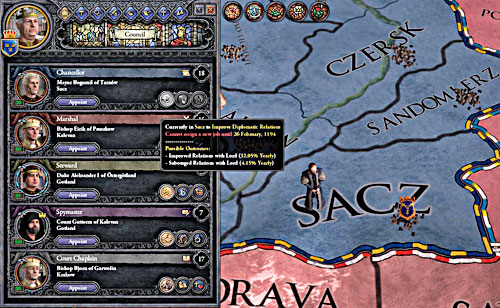 About where the problematic noble lives informs his crest (on the map and the profile).
About where the problematic noble lives informs his crest (on the map and the profile). Improve Diplomatic Relations - his basic ability. When the player send a chancellor to the terrain where unfriendly person lives, he can count on improving relations after a year. Agent try to persuade the persons with the highest rank at the beginning, but if he fail, he'll try that with the less important ones. If the chancellor fail completely (small chances for that), he'll alienate the particular person to him and his ruler.
Fabricate Claims - very interesting ability which allow on creating demands (casus belli) where there is non. If the chancellor will be send to the county outside his ruler's domain, he'll try to fabricate some documents thanks to which he'll be able to declare a war about the problematic land. It requires lot of money and piety points and links with the big risk. If the agent is caught, your target may imprison him, kill or even declare a war to you. So it's rather simply but problematic way of expanding your territory. Usually it's better to use marriage. More about that you may read in the chapter Military: How to declare a war?
Sow Dissent - relatively useful but often underestimated way of putting the country in order. This ability spoils relation between a ruler of chosen county and his subordinates. It's very handy when you want to get rid of or weaken inconvenient rulers without murders or war. Count who has to fight with his own vassals doesn't have a time and opportunities to harm you. In some situations he may even lose the war with subjects and all his influences and sometimes even all the county. Unfortunately, sow dissent is easily detected, so it's not always profitable. Others abilities of the chancellor are usually more useable.
The most important feature: Diplomacy
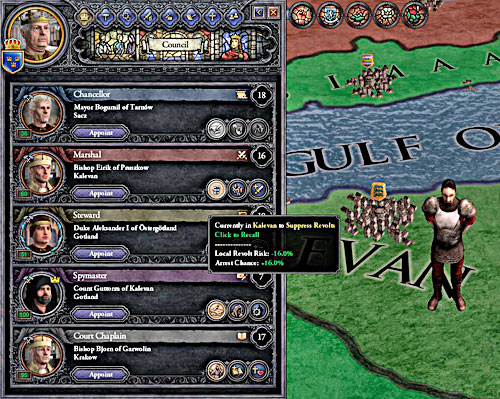 Chance of suppressing revolt is as big as the risk of being arrested.
Chance of suppressing revolt is as big as the risk of being arrested. Supress Revolts - one of more useful abilities, which let to decrease a risk of rebellion. It's worth to use particularly in the recently conquered places. Sending the marshall to them is profitable, but be careful: he may be imprisoned.
Train Troops - ability guaranteeing increasing a number of troops that can be recruited in the chosen county and their regeneration. Especially useful during long, exhausting wars, in which support may be crucial. Training is preferably to make in places which recruit the most soldiers. The big flaw of this ability is a fact that very often the marshall participates in wars personally. In such case he can't make any missions and trainings. Another disadvantage is a fact, that the nobles living in the particular county won't be happy when somebody will rush into their land. They can throw marshall out of their domain.
Research Military Tech - the least useful ability of this hero, affecting only the speed of developing technologies in the chosen county. It's worth to use it only when you are not at war and there is no risk of revolt. What is worse, there is a possibility that the marshall will be harmed during his work. So you have to consider carefully all for and against before you use this ability.
The most important feature: Martial.
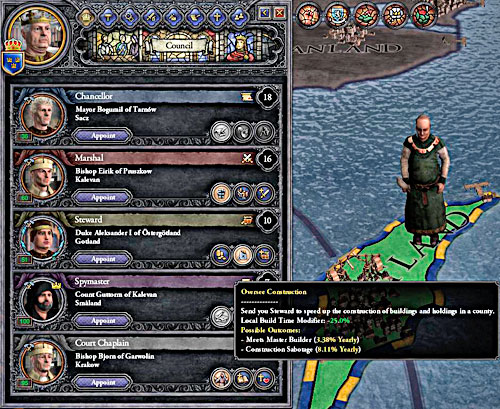 Steward is the best at supervising the building. Besides that he is not very useful.
Steward is the best at supervising the building. Besides that he is not very useful. Collect Taxes - it increases an amount of money you collect during the year. Despite pretences it isn't a good choice, because chances for steward being robbed are much bigger than the chance for collection the money.
Oversee Construction - it accelerates greatly the speed of constructing the buildings. Particularly useful with the most advanced structures form which some requires dozen of years to be completed. Another plus is a fact that steward may meet the great architect. But there is also a danger that during the works something will go wrong and constructing time will be longer (fat chance for that).
Research Economy Tech - increasing the speed of researching inventions connected with the economy in the chosen county. It brings profits slowly but there is no risk connected with that.
The most important feature: Stewardship
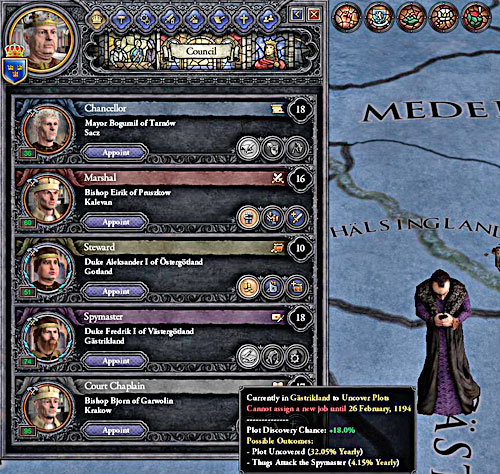 Spymaster is the most useful member of the Council.
Spymaster is the most useful member of the Council. Uncover Plots - definitely the most important ability of the spymaster. It lets you detect subject's intrigues. If your agent find the conspiracy, he'll inform his ruler. After finding plotters you may imprison them or told them to leave their plans. Independently from the county in which spymaster is, he discover plots from all the kingdom. But his actions are risky, because conspirators may kill or imprison him. If you don't have a spymaster you can't look for intrigues (look at: Intrigues).
Build Spy Network - ability increasing chances of successful coup in the chosen county but connected with the big risk of detecting the spymaster and discourage all vassals in this region. Particularly useful when you need to kill somebody. After an outrage you need to recall the agent to not be detected.
Study Technology - on the contrary to the rest agent's abilities this is connected with sending him outside the ruler's domain. When the spymaster is there, he'll try to sneak in and steal technologies for his sovereign. Of course, it's connected with some risk: if the agent is detected, your relations with the target will be much worse.
The most important feature: Intrigue
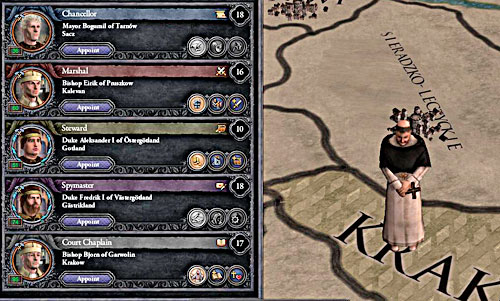 Chaplain is essential during expansion on the fidels lands and to fight with the heresy.
Chaplain is essential during expansion on the fidels lands and to fight with the heresy. Head Local Inquisition - it gives small chance of converting the county or big of converting the person in it. It's very important ability, without which expansion on the fidels' territory won't be possible. Of course, such actions aren't always subtle and delicate and are connected with the risk of heresy and attacks on the chaplain himself. Nevertheless, it's the most useful ability of this character if you have some provinces with the faith other than yours.
Research Cultural Tech - increasing greatly speed of technological development in the chosen county. It also gives a chance of finding a philosopher (prestige bonus for money). Using this ability means, that the chaplain has to say, that sb is a heretic, and not always it's true. In such case you have to decide if you put the suspected into the jail or ignore the denunciation.
Improve Religious Relations - nice ability which allows you to increase the respect with which you're treated by the people of Church in the chosen county. Of course sometimes chaplain may enraged those people instead of securing their support.
The most important feature: Learning
Laws are very useful tools, thanks to which you can control your lands and define the rules of reigning them. Every change of it meets the reaction of subjects. If the ruler decides to make law harsher you may be sure that your subjects won't be happy. That's why you always have to prepare well: not only by persuading characters but also by gaining an army and moye, thanks to which you'll be able to defeat further opposition.
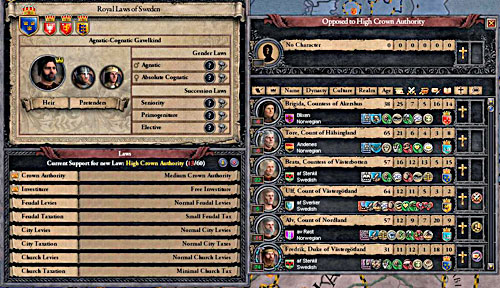 Some of subordinates is against - you need to convince them or kill (imprisoned still can vote).
Some of subordinates is against - you need to convince them or kill (imprisoned still can vote). Laws can be divided onto three categories: concerning succession, royal and normal. First ones were described in the chapter Succession, the rest you will find below. In case of two last you need to remember that ratifying them requires agreement of majority subjects. Special situation force royal laws, because they take into consideration only vassals from the "kingdom de jure", what is not necessarily real borders of the kingdom. In the bottom right corner you find special filter, thanks to which you can get to know borders of such kingdoms. After that you need to convince persons to your ideas with bribes, title and land distribution. More about that you can find in the chapter Characters: How to care about human relations?
Royal laws (marked with the icon of crown) can be changed only by kings or emperors. Ratifying of new regulation is made like in the case of normal laws, by majority of voters. But the voters are only vassals from the "kingdom de jure", what is not necessarily real borders of your kingdom. Royal rights mostly define range of ruler's competences, so they're not only crucial but also controversial. Any change of rules is connected with constant annoyance of all vassals. So after changing, be prepared for war. If you change the law of investiture from papal on free you have to take into account also reaction of the pope (orthodoxes can't change this law).
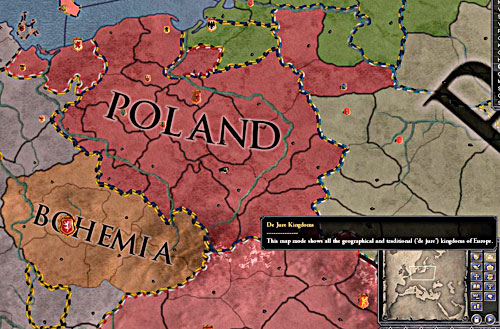 Kingdoms de jure usually have nothing in common with those real ones.
Kingdoms de jure usually have nothing in common with those real ones.
Crown Authority:
Level
Modifiers
Effects
Remarks
Minimal
+5 to opinion of all subjects
Player can't call up army's leaders and take lands from subjects.
Vassals can fight between themselves.
Landed titles can leave the domain via marriage
Vassals can have external wars
The worst of levels, causing that there are constant internal wars in the kingdom. Your freedom is very limited especially in the case of seizing the lands (win in civil war has no effect). The only possible political systems are election and gavelkind.
Low
Vassals have to provide a ruler with at last 10% of theirs army.
-5 to opinion of all subjects
Player can't take lands from unfaithful subjects with impunity, but he can seize lands of his subjects (with minus to the reputation)
Vassals can fight between themselves.
Landed titles can leave the domain via marriage
Vassals can have external wars
This level allows for rather comfortable playing, but still it has many flaws. Subordinates can fight with each other, thanks to which they often cumulate lot of lands, what can be dangerous for you.
Available political systems are election and gavelkind.
Medium
Vassals have to provide a ruler with at last 20% of theirs army.
-10 to opinion of all subjects
Player can take lands from unfaithful subjects with impunity, but he can seize lands of his subjects (with minus to the reputation)
Vassals can't fight between themselves.
Landed titles can leave the domain via marriage
Vassals can have external wars
The most comfortable level of authority. Guarantees quite big freedom for the player with simultaneously decreasing the subject's autonomy. Big plus is a ban of internal fights. And your decisions will be unchangeable.
Available political systems are election, seniority and gavelkind.
High
Vassals have to provide a ruler with at last 30% of theirs army.
-20 to opinion of all subjects
Player can take lands from unfaithful subjects with impunity, but he can seize lands of his subjects (with minus to the reputation)
Vassals can't fight between themselves.
Landed titles can't leave the domain via marriage
Vassals can have external wars
Very profitable but risky level. Although profits from banning leaving the lands outside the domain are good, the price is very high: much dissatisfaction of the subjects. So it's a proposition only for small kingdoms and players who are keen to the primogeniture.
Available political systems are election, seniority, primogeniture and gavelkind.
Maximal
Vassals have to provide a ruler with at last 40% of theirs army.
-30 to opinion of all subjects
Player can take lands from unfaithful subjects with impunity, but he can seize lands of his subjects (with minus to the reputation)
Vassals can't fight between themselves.
Landed titles can't leave the domain via marriage
Vassals can't have external wars
Very unprofitable choice. It guarantees the same profits like the high level, but is connected to bigger dissatisfactions. Prohibit of external wars isn't that good, because vassals usually behave reasonable by attacking only those enemies that they can beat (and enlarging their and their ruler's domain).
Available political systems are election, seniority, primogeniture and gavelkind.
Investiture:
Type
Modifiers
Effects
Remarks
Papal
Divorces and asks about cancellation of the excommunication cost 50% less
Only pope can nominate bishops.
You can't let the pope decide instead of you, because the head of the Church has its own politics, which is often against yours. It may happen that your kingdom will fall apart because of few sent rebelled bishops. Another flaw is fact, that all of taxes collected by the people of the Church is given to the pope.
Free
Vassals being Church's clerks respect you more (+25)
All vassals having bishoprics respect you more (+10)
Pope is dissatisfied (-30 to relation)
You can freely nominate bishops and their descendants. If you don't, the pope will make it.
This choice improves your relations with vassals, especially with the clergy. What is more, a free investiture let you nominate deputies of bishops: if one of them rebel, you can kill him and replace with the more faithful one. Crucial is fact, that taxes from the people of Church goes to you.
General laws concerns subjects' duties to their monarch: it touches not only matter of money, but also size of delivered army. Every law affect happiness of vassals, ones decrease it, ones increase it. Good ruler should manoeuvre between different zones of influence, guaranteeing himself safety but simultaneously draining vassals as much as he can. It's problematic, because every law requires convincing majority of voters - so winning over vassals is an essential task. After enacting new law, prepare to the rebellions: most of nobles will be dissatisfied, even if the law is profitable for them.
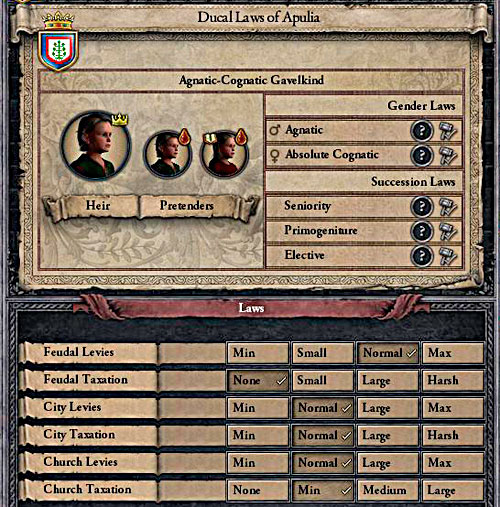 Every law has its consequences: both positive and negative.
Every law has its consequences: both positive and negative. Land owners who are concerned by laws you may divide on three categories: feudal lords, townsmen and priests. In first group are owners of castles and counties in which this structure is dominating one (is located in the right upper corner of the county's screen). Similarly: townsmen are ascribed to towns and urban counties and priests to bishoprics and Church lands. Important is fact, that if the law affects particular group, it'll work only on those who are directly subordinate to the player. So, if the county is urbaned and you're not the direct owner (e.g. you're king not a count) and the ratified law is a city taxation you'll receive taxes only from the main, urban building but not form the smaller, which are on the same terrain. It happens because the internal structures of county depends on the count and his subjects, not yours. Of course if the count tax his subordinates, he'll get an income from which a part will be sent to the king. So it's a pyramidal structure in which every middleman can establishes his own laws.
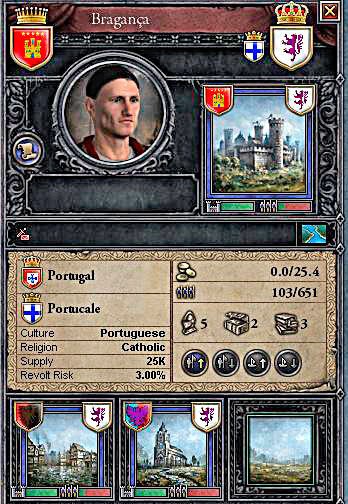 A castle is a dominating building in this province, so the count will be recognizable as a feudal lord.
A castle is a dominating building in this province, so the count will be recognizable as a feudal lord. The only way to obtain all incomes of all buildings in the county is nominate yourself a count (it doesn't collide with being simultaneously a king or duke). In that way you become the actual owner of the land and maximize your incomes.
Most of counties have feudal characters (dominating structure is a castle), often you meet also big metropolis (cities) and rarely Church lands (bishoprics). That's why you should focus on laws concerning feudal lords and townsmen.
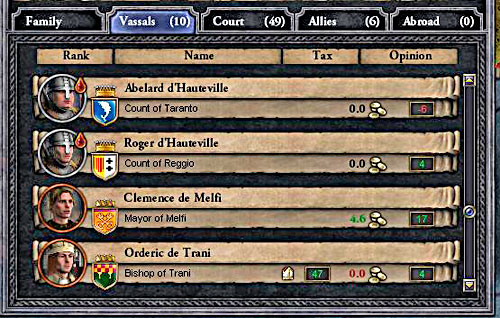
Title informs you to which group particular person belongs (look: Glossary: Landed Titles).
As it's not hard to guess, townsmen are the most eager to the tax concessions, but they don't agree to big exploitation of their troops. It's other way round with the feudal lords and bishops are golden mean. In the case of the people of the Church, it's complicated because they can pay taxes to the pope or the player (depends on type of the investiture and personal liking. You should direct your law politics in a way which provides you the biggest profits and the smallest risk of revolts.
Feudal Levies:
Level
Modifiers
Remarks
Minimal
Feudal lords keep at least 40% of their armies
+10 to relations with feudal lords
The least profitable option, guaranteeing big armies for owners of castles and counties with castles as a dominating structures. It's very dangerous in case of civil war!
Low
Feudal lords keep at least 30% of their armies
+5 to relations with feudal lords
Little better choice, but it doesn't allow you on a freely managing of army. Bonus to the happiness is hardly noticeable.
Medium
Feudal lords keep at least 20% of their armies
The most common level, which is a good compromise between amount of army and vassal's happiness.
High
Feudal lords give all of their army to the sovereign
-5 to relations with feudal lords
An optimal option: leaves no levies to the feudal lords, thanks to which you can take away all their armies (what prevents the rebellion). Unfortunately, it discourage vassals.
Feudal Taxation:
Level
Modifiers
Remarks
Non
Feudal lords pay no taxes.
Despite pretences it isn't such a bad choice. Castles usually generate less income than cities or churches so such sacrifice isn't hard/. It loses sense when most of your counties have a castle as a dominating structure.
Low
10% of taxes the feudal lord gains goes to the sovereign
-10 to feudal lords' happiness
Optimal level allowing to gain quite ice incomes at low dissatisfaction of vassals.
High
20% of taxes the feudal lord gains goes to the sovereign
-20 to feudal lords' happiness
Quite risky option portentousing many revolts and big dissatisfactions of feudals. Taxes won't compensate loses you'll have during civil wars.
Harsh
30% of taxes the feudal lord gains goes to the sovereign
-30 to feudal lords' happiness
Feudal lords will be so annoyed, that managing the county will be impossible, particularly if it's big. Definitely not worth.
City Levies :
Level
Modifiers
Remarks
Minimal
Townsmen keep at least 50% of their armies
+10 to relations with townsmen
Unprofitable choice which portentous many problems in case of civil war. Forces of mayors and doges will be at least equal with yours.
Normal
Townsmen keep at least 35% of their armies
Optimal option. You control most of armies, and the townsmen aren't dissatisfied. Cities provides the least army of all types of structures so small amount of troops doesn't make a difference.
High
Townsmen keep at least 20% of their armies
-10 to relations with townsmen
15% army's growth is almost unnoticeable and growth of townsmen dissatisfaction is very noticeable. Not profitable choice.
Very high
Townsmen keep at least 5% of their armies
-20 to relations with townsmen
Completely senseless option. You have lot of army but the discontent will be so high, that your kingdom will be in chaos.
City Taxation:
Level
Modifiers
Remarks
Minimal
15% of taxes the towsnmen gain goes to the sovereign
+10 to townsmen happiness
Cities generate the biggest income, that's why it isn't a good choice (especially, that mayors rebel rarely).
Normal
25% of taxes the towsnmen gain goes to the sovereign
Very good choice for those who are afraid of revolts and want to have big incomes.
High
35% of taxes the towsnmen gain goes to the sovereign
-10 to townsmen happiness
Very big earnings not always compensate the dissatisfaction of townsmen. It's profitable only when you aren't not afraid of revolts or you have enough army to fight it.
Harsh
45% of taxes the towsnmen gain goes to the sovereign
-20 to townsmen happiness
Few additional coins yearly isn't worth of civil war. Even after taking away the rebels' lands and distribute them to others, you have to take into consideration another revolt. Very unprofitable choice.
Church Levies:
Level
Modifiers
Remarks
Minimal
Priests keep at least 50% of their armies
+10 to relations with priests
Although bishoprics don't have a lot of troops there is more than in cities. That's why it's worth to demand from bishops more army than a half. Thanks to that we'll have an advantage during the rebellion.
Normal
Priests keep at least 40% of their armies
Very profitable option which provides majority of army and not annoy the priests.
High
Priests keep at least 30% of their armies
-10 to relations with priests
Proposition for those who don't have to be afraid of revolts or have little of Church lands.
Very high
Priests keep at least 20% of their armies
-20 to relations with priests
It's unprofitable. Only a small part of counties has a church character (small number of troops) and all bishops will be annoyed. Senseless option.
Church Taxation:
Level
Modifiers
Remarks
Minimal
Priests pay no taxes
+20 to priests' opinion
Option is profitable only when you have papal investiture in the kingdom, in such case all incomes go to the pope and you are respected by the priests. If you have free investiture, priests decide to who they want to pay, so it isn't that good idea.
Low
35% of taxes the priests gain goes to the sovereign
Very profitable when there is a free investiture and you're respected.
Medium
45% of taxes the priests gain goes to the sovereign
-10 to priests' opinion
It's hard to keep the priests' support at this level, so they'll probably pay taxes to the pope.
High
55% of taxes the priests gain goes to the sovereign
-20 to priests' opinion
Like above.
Land gives small income despite it's developed. What is happening?
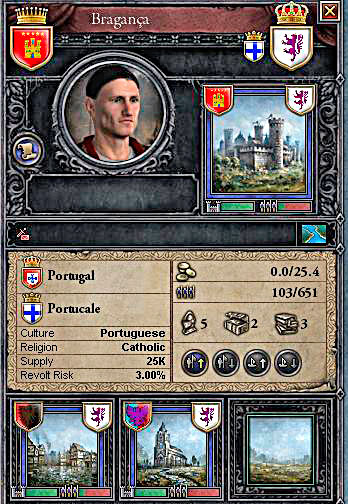
Feudal lords manage castles, townsmen cities and clerge bishoprics, look at Glossary.
Probably the building belongs to the unproper type of owner. If the castle is managed by the bishop, it just won't work properly. So click at the particular land and check it.
How convince people to your ideas?
It is described in chapters: Characters: How to care about human relations? and Riding on a Top: Duke: Election.
Some technology developed much slower than that Crusader Kings II shows it very clearly. To upgrade knowledge at some point you need to sacrifice many years of researches and sometimes also money and political influence. Bonuses you get thanks to that are noticeable, but they grow so slow, that you don't spot it. Another problem is a fact that every county has its own development level, so it happens that you have both civilised and developed lands and technological desserts.
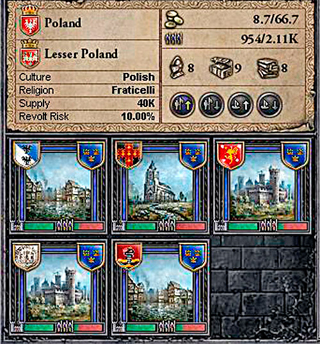 Sum of technological levels in the particular county is seen in its profile (icons of helmet, chest and books).
Sum of technological levels in the particular county is seen in its profile (icons of helmet, chest and books). Technologies divide on three categories: military, economic and cultural. First serves as an army upgrade: its resistance, attack and morale. Economy, as you can guess, increases your incomes from counties and more advanced structures (look at the chapter: Economy). Cultural technologies improve your relations with vassals and increase the amount of received piety and prestige points. All of those technologies are important, because they let us improve the kingdom.
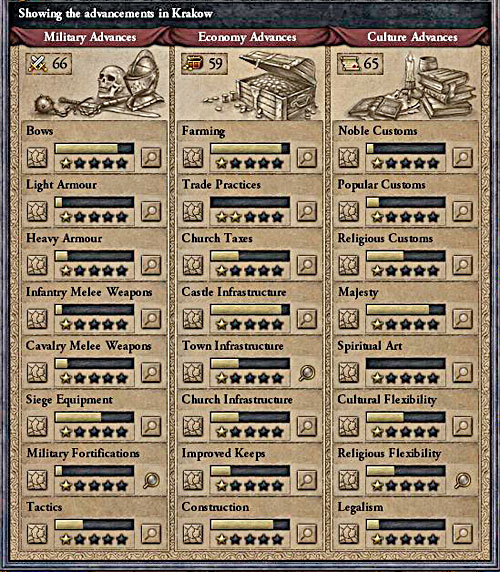 The more technologically advanced county, the bigger bonuses you receive.
The more technologically advanced county, the bigger bonuses you receive. How speed up discovering new technologies? The easiest method is choosing one topic on which your scholars should focus. You do it by clicking on the icon of magnifying glass in the window of technology (screen above). If it isn't enough you can support with the members of council, most of them have abilities which improves the tempo of discovering. Eventually if you have a lot of money you can build university (in the city) or school (in the bishopric). Those constructions are very expensive, but they improve the tempo of researches.
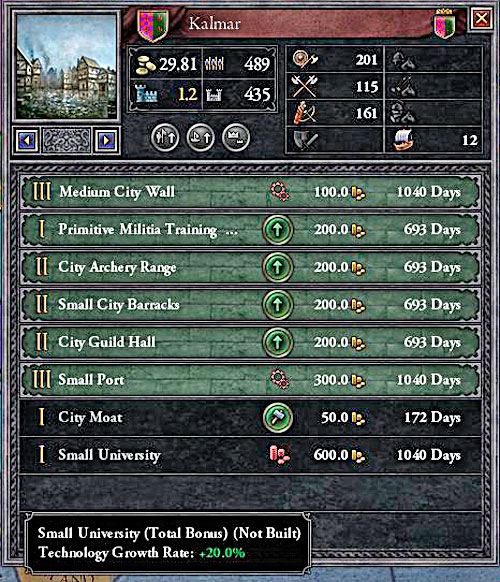 University is expensive, but sometimes profitable.
University is expensive, but sometimes profitable. During level ups of counties you can notice that it happens in slower and slower. It happens, because the more advanced estate, the more time takes to research new thing. Such issue tries to force you to concentrate on technologies, but much more important in this game are wars, intrigues and dynastic matters. Nothing bad will happen, if you leave the counties on their own. That's why it's more profitable to focus on the remaining elements of the game.
War is one of the most important element of every strategy game. Although in Crusader Kings II it doesn't matter that much, you shall pay attention to it. Medieval art of war is shown in this game in very detailed way. Unfortunately, as it happens in simulations, reality makes a lot of problems to the nowadays players. The most number of doubts cause an act of declaration of war, because it requires good reason (casus belli). To obtain such pretext, you can decide on one of possibilities which are described below.
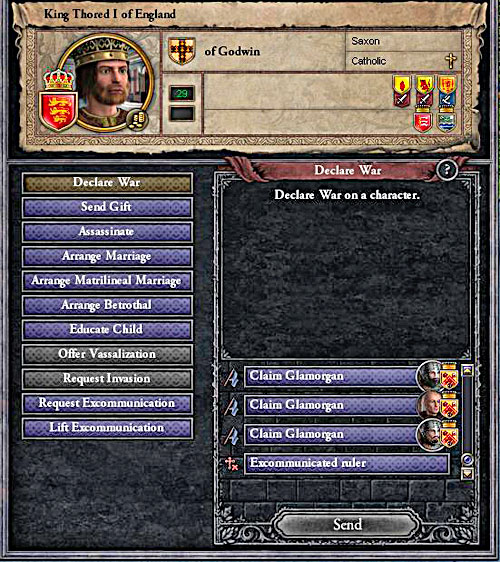 Every pretext is good.
Every pretext is good.The easiest method basing on sending the chancellor to the enemy land and usurp the power. It's described in the chapter Council: Chancellor. There is one flaw: you can seize only one county at once.
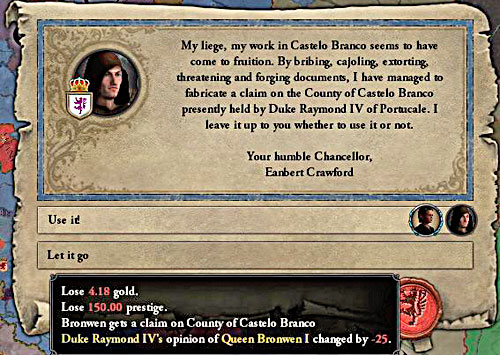 Fabricate claims costs many prestige points.
Fabricate claims costs many prestige points.If the holy father declare a holy war, all Christian monarchs gain a casus belli against that target. Another values of this solution is fact that you gain pope's respect and 500 piety points. It's described in detail in the chapter Religion: Crusade.
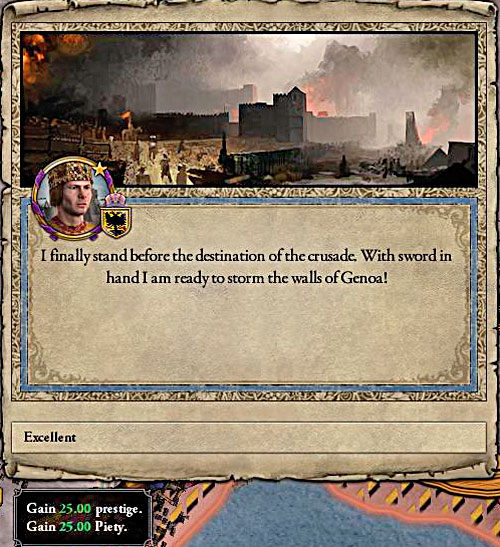 Not only success in the crusade is rewarded. Also most of sieges and even getting to the target.
Not only success in the crusade is rewarded. Also most of sieges and even getting to the target. If you have reasonable rights to the particular land, and you don't possess it, you can start a war in case of getting this place. Such claimants you may gain if you're one of the legal descendants of this territory or if someone took it from your parents. What is more, if any county leaves your kingdom, you can fight to regain it.
Another argument that can be used is an integrity of the country. In frames of the kingdom de jure an owner of its crown can fight for the lands that are out of his power (filter in the right bottom corner of the screen). An additional thing is usurping rights to some land. For instance, if you usurped rights to the Great Poland (duchy), he automatically gains casus belli against all terrains included in the de jure of this kingdom. Special statement informs you when it's possible.
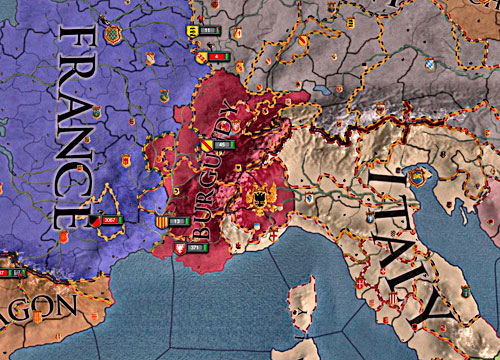 Owner of the Burgundy's crown can declare a war to everybody who have at least a piece of his de jure lands..
Owner of the Burgundy's crown can declare a war to everybody who have at least a piece of his de jure lands..Both player and his subjects can declare war thanks to intrigues. If in the bookmark Intrigue at the upper part of the screen an intrigue which goal is to change the political system, defeat the ruler or regain independence, it'll be connected with declaring a war. But remember that the goal of confrontation is clearly defined and you can't cross it. So if you're fighting for the change of the political system you'll gain only that (plus prestige, of course). Unfortunately such plans show up in the game very rarely.
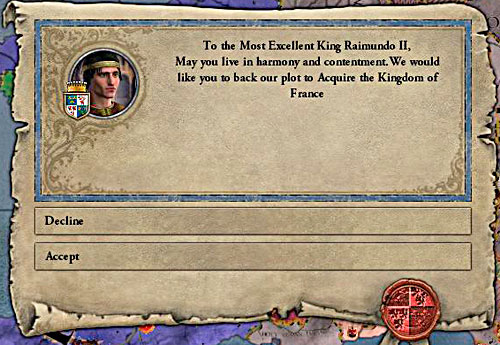 Sometimes NPC's convincing you to take a part in the war intrigue. It's worth to consider their proposition.
Sometimes NPC's convincing you to take a part in the war intrigue. It's worth to consider their proposition. If you have at least 250 piety points (500 in case of the emperor) you're catholic and not at war at the moment, you may ask the pope for the blessing for an invasion on the other, Christian country. Win in such war allows you to seize all domain of the defeated enemy but with two catches: enemy has to have more land than you, and all the operation depends on Holy's Father will.
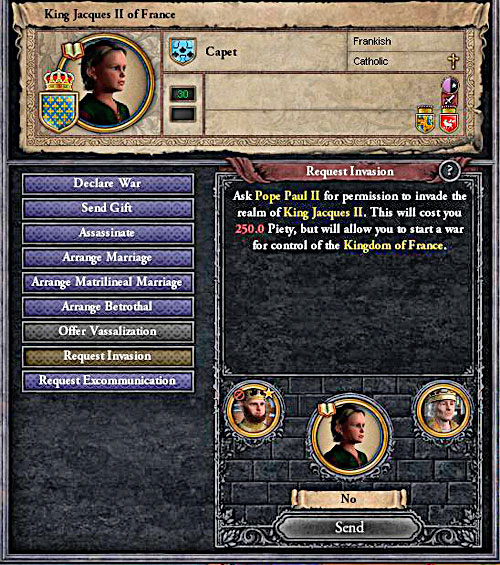 Pope rarely agrees to invasion.
Pope rarely agrees to invasion.If some monarch get excommunicated, every catholic can declare war at him. It's comfortable because if you're respected by the pope, you may ask about excommunication the chosen character. It is described wider in the Religion: Basics.
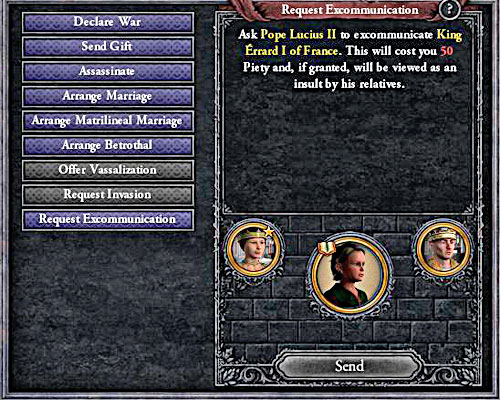 Persons who are adult members of the Church can be excommunicated.
Persons who are adult members of the Church can be excommunicated. If any of your subordinates have right to the particular territory, you can submit his demands and declare war to the actual owner. In the case of victory, the conquered lands go to the vassal, not to you. That's why such intervention isn't always profitable. On the other hand, it's cosy way, because it doesn't require much effort. You just need to Invite to Court one of descendants of the debatable province and declare the war in his name. If the achieved titles are not equaled with yours, you'll gain new subordinate with all his territory.
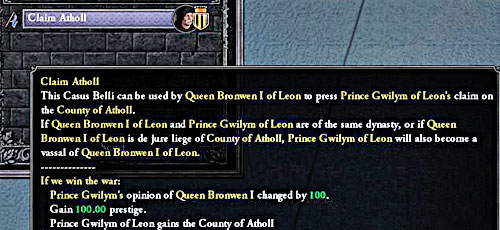 After win war it's worth to think about seizing vassal's lands.
After win war it's worth to think about seizing vassal's lands.If you want declare a war to the infidels, you can do it in every moment. Heretics aren't protected by any law, so you can conquer their lands with impunity. But remember to convert the heretic province after the winning.
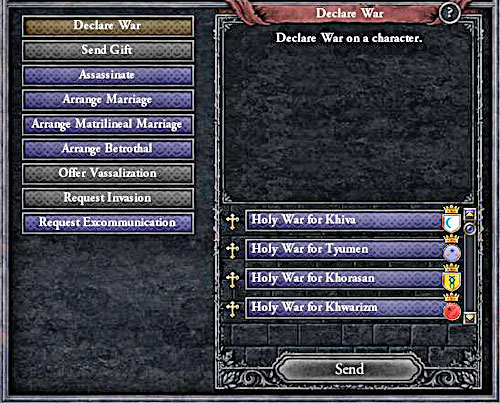 You can fight for all kingdoms too.
You can fight for all kingdoms too.The least profitable war is definitely war in defence of the faith. Rulers deciding on joining to the anti-muslim coalition can lose much things and gain only prestige and piety points. You don't get any territories in that way.
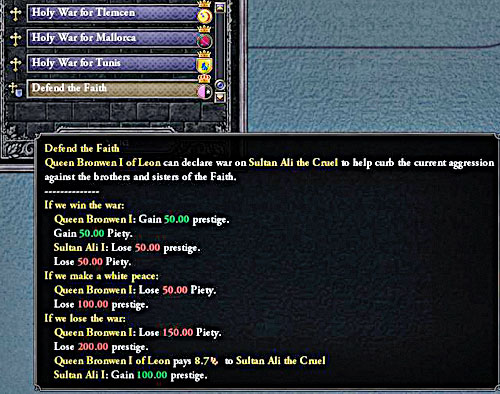 Costs overcome the possible profits.
Costs overcome the possible profits. If you're dependant from some ruler, it's worth to refuse obedience and fight for an independence. But be careful, because usually monarchs have more army, so it's a good idea to have some allies.
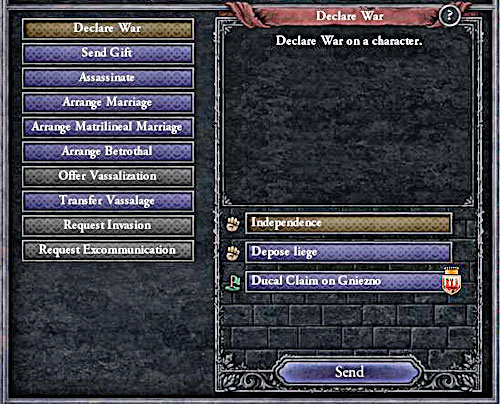 Usually it's better to take over the crown from the sovereign, than fighting for independence.
Usually it's better to take over the crown from the sovereign, than fighting for independence. If you're dependant from some ruler you can declare a war at him. If the rebels win, you or the legal descendant (so check it carefully earlier) will gain the crown. It's a problematic way of gaining the power, because it requires carrying out a brilliant military operation. Besides, it's more worthwhile to assassinate the monarch.
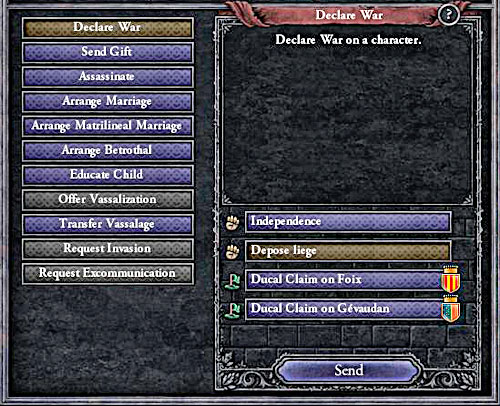 Duke can become the king, he jus needs to win the war.
Duke can become the king, he jus needs to win the war.
Every county generates some amount of troops. Its quantity you can increase thanks to proper buildings (look at: Economy: Developing of lands and increasing incomes) and laws (Laws) but also human relations matter. The more vassals like you, the more army they'll send you. The good ruler should balance between subordinates' respect and number of possessing lands. Only such combination let him gather big, unbeatable armies.
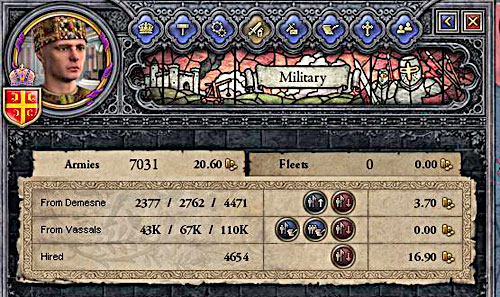 Usually vassals have more army than their sovereigns.
Usually vassals have more army than their sovereigns. Troops are being produced in every land you possess, also in those possessed indirectly. To hire warriors, you need to click on the chosen province and choose the icon of recruitment. If you don't like clicking, you can send messages to all warriors in the kingdom, by choosing the icon of an army in the upper menu (screen above). But you have to remember that armies, that wander through the land, are less eager. Their leaders will lose respect to the ruler, what may end with a rebellion. The small land owners get upset the fastest, and the most patient are kings and dukes. But even there do not trust them: tired soldier is an unreliable one. So when the battle dust falls, send boys to their homes. They'll get calm and ready to the next campaign.
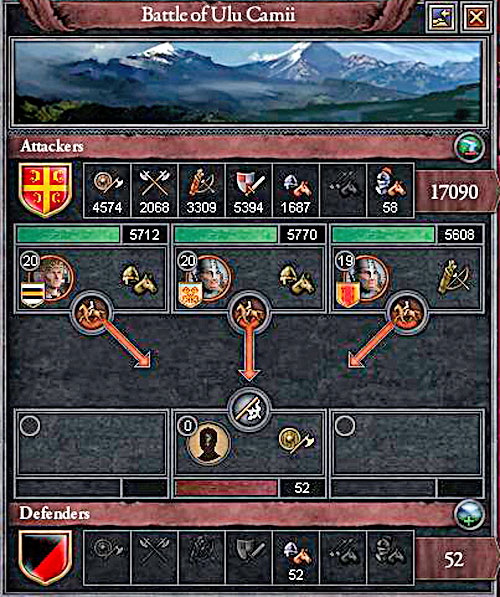 Defender gets a bonus to morale if he is fighting on the mountainous terrain. Attacker gets penalty, if he crosses the river.
Defender gets a bonus to morale if he is fighting on the mountainous terrain. Attacker gets penalty, if he crosses the river. To understand how particular types of troops works, you need to look at battle's course. It happens without your participation: about the result decide troops' number, quality and placing. You can divide your troops on three flanks before the battle, but it doesn't affect the course: it's better to keep them in one, strong wedge. Such solution solves also a problem of incompetent commanders. In the front of the flank the greatest generals from an army stands. So, more important than the formation is understanding a mechanism of struggling. In the first phase only shooters and little of melee fighters participate. Second phase is a direct encounter between all troops and the third one is chasing the defeated enemy.
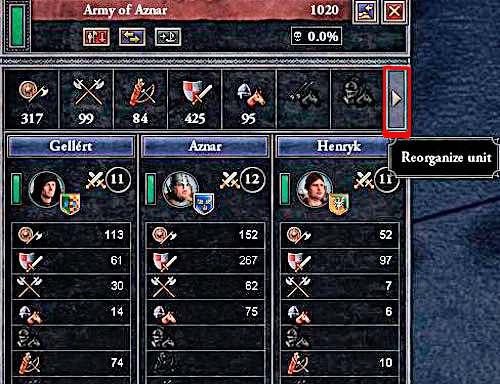 Flanks inside the army can be manipulated.
Flanks inside the army can be manipulated. For instance, if your enemy has bigger army it's not worth to send a lot of cavalry upon him, because its main usage is chase. It's better to bet on pikemen, light and heavy infantry and archers. In big number they should stand against enemy's rush and break his morale. Only then you can decide to send some horsemen who'll finish running opponent. Of course you can part and move your troops: it's special icon dedicated to it (screen above). Yet you can't move single formation (bowmen) but only whole groups (like Silesian Army).
Formations divide on few categories, which are described below:
 From left: light infantry, pikemen, archers, heavy infantry, light cavalry, mounted archers, heavy cavalry.
From left: light infantry, pikemen, archers, heavy infantry, light cavalry, mounted archers, heavy cavalry. Light infantry - base type of troops, quite well at all tasks with no specialization. In comparison with better troop it loses defence.
Pikemen - great in defence (lot of HP and strong melee), but totally bad in offensive and chasing.
Archers - they attack firstly, cause big damages, but then they almost don't participate in the battle. As they have little HP, they often dies (especially when chased).
Heavy infantry - very tough troop, melee only. Do not take part in the first phase of battle and chases.
Light cavalry - weak in the first phase, average in the second, but perfect in the third one. Despite pretences have quite satisfying number of HP.
Mounted archers - good in every phase, particularly in the first and third. It's typical troop for muslims, but Christian rulers can hire them as mercenaries.
Heavy cavalry - very tough unit, perfect at chases and melee. Unfortunately, they require high advancement of the castle what is a rare thing.
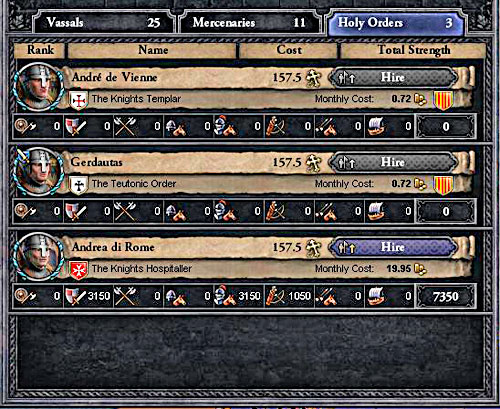 Orders appear at the late stage of the game.
Orders appear at the late stage of the game. How else you can divide troops? There are also mercenaries and knight orders. First ones consume huge amount of money, but they spring up immediately and numberous. But remember, that they serve only for money and without the soldier's pay they'll rebel. That's why sometimes it's profitable to send your mercenaries on death as first ones.
And knights orders are hired for piety points and can fight only against infidels (they decline fighting against believers of the same religion). Their big advantage is that they have no soldier's pay, if they're fighting on the heretic's land and you're a faith defender. Of course obvious flaws are recruiting only during crusades and jihads and that they're available only for catholics.
When you declared the war and gather proper forces, you can attack. Basically, military actions you can divide on two groups: defensive and offensive. During the defensive ones an optimal solution is to concentrate two big armies in one place and get rid of the enemy with them. It's hard because opponent has a tendency to wander through all the country. Despite that, with mentioned armies you can drive him to the corner.
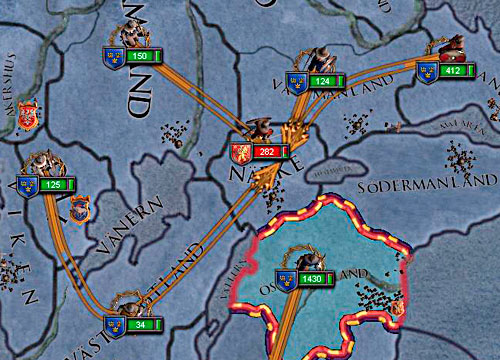 If there was no time to concentrate army, enemy can be surrounded also with the small forces. What matters, is slowing him down.
If there was no time to concentrate army, enemy can be surrounded also with the small forces. What matters, is slowing him down. It's important to determine the conflict the smallest possible numbers of battles. In such way you end the war quickly and with minimal loses. If enemy decides to make a wide front (attacks many provinces at once), the tactic mentioned above will be priceless: your armies will easily defeat enemy's troops. But if the opponent decides on attacking one, big army, try to avoid him and play with, he'll soon start losing men because of bad supplies at the enemy's lands.
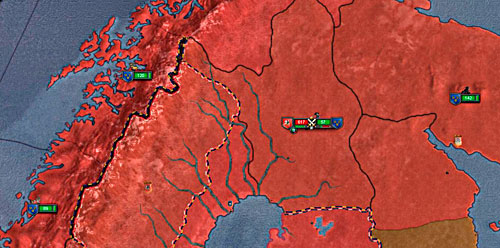 During deceiving an enemy, be careful and not let him catch any of your armies.
During deceiving an enemy, be careful and not let him catch any of your armies. It's the other way round, if you're an attacker. The perfect here is Blitzkrieg: attack enemy with few big armies which will get rid of his troops and then locate them among opponent's lands (screen below). Such way of struggling prevents cumulating enemy's army. Another value is fact, that this solution let you conquer all fortresses quickly: they'll be sieged at once so enemy will have a problem with saving them. If opponent gathers one big army, you should join as many troops it requires to have a number advantage. Then just beat him in the final battle (mercenaries are useful) and back to the kingdom's pacification.
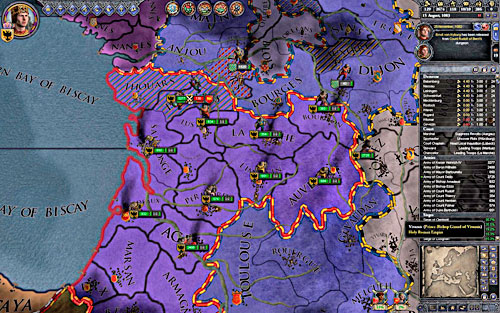 It's important to occupy all enemy's territory quickly.
It's important to occupy all enemy's territory quickly. The crucial stage of every campaign are sieges. Thos can be played on two ways: starving enemy or assault. First solution is much better because it minimalize our loses. But the flaw of it is its time: some sieges may take even few years. Another thing is that to starve sieged enemy, you have to have a bigger army, what is not always possible. So, when you're in the rush, it's worth to assault (sword icon in the window of the sieged province, screen below). During such operations, you have to look carefully at the fortress's advancement: the higher it is, the more loses you will have. Independently from the method you chose, attacked counties stop gathering armies only when you conquer all their buildings. Seize them permanently you can only at the moment of finishing the conflict and if it was what the war was about.
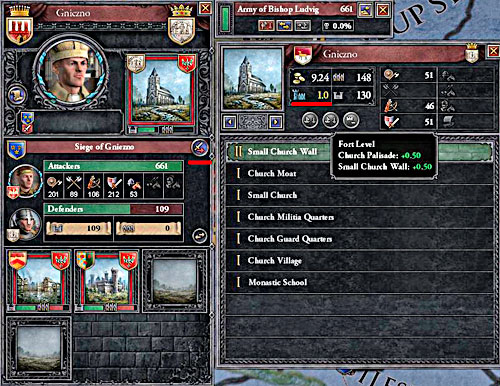 Icon of the an assault (from the left) and fort's level (from the right).
Icon of the an assault (from the left) and fort's level (from the right). During military operations you don't have to fight alone. You can call up for allies, if you have ones. Alliances are made thanks to marriages. When the conflict escalate, you can estimate if it's profitable to summon the support. Allies gain much more prestige than the normal participants, because they fight for someone other's business.
 Icon of flag means, that you can summon an ally.
Icon of flag means, that you can summon an ally. It's always worth to use additional troops, because sometimes they win the wars. Especially profitable situation happens when you're a count and you have some crowned friends: then they win the conflict and you gain lands. But if the computer player asks for help, it's rather not worth supporting him, because the only reward is prestige. Such refusal decreases your amount of prestige so, if an enemy is far away and can't harm you, you may agree and do not nothing.
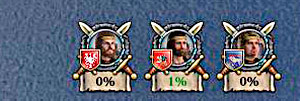 This war will last, no one has an advantage.
This war will last, no one has an advantage. Every war has to need with a peace. An icon in the right bottom corner (screen above) informs us who is winning. The biggest percentage value, the better is your situation. You can improve that state of matters by winning battles and sieges, and lose it by making all the way round. If you reach a 100%, you can force demands that were declared at the beginning of the war (in other situation you can only try to convince your enemy to). If non of sides can achieve an advantage, it's good to sign while peace, according to which status quo is kept. But what is important, in such case an attacker loses lot of prestige points and both participants have to take into account additional difficulties (are described in the menu of negotiating an agreement.
When the war ends, the truce begins which lasts 10 years. Breaking it is very expensive and that's why unprofitable. Computer payers never break it.
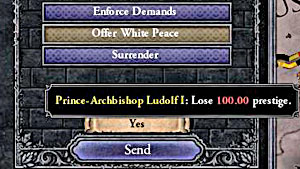 White peace is harmful mainly for an attacker
White peace is harmful mainly for an attacker
I was attacked by an enemy and I have no chances. What to do?
There are conflicts, in which you have no chances. In such case, you can do sth dishonourable: murder an enemy. It's very profitable, because if one of leaders dies, the war ends (wth status quo). It also good during civil wars, but beware of inheriting the estate by the person who doesn't belong to your domain. What is curious, murdering an enemy doesn't end the conflict if its reason is sth bigger (like defence against jihad) or moves to the descendant (son of the murdered man has the same demands).
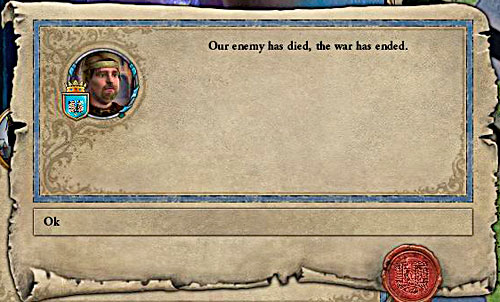 One blow can end the uncomfortable war.
One blow can end the uncomfortable war.
In the Intrigue bookmarks in the upper part of the screen, you can find few windows. Thanks to them you can steer your intelligence and counter-intelligence and mark out ambitions and decisions. This element matters greatly in Crusader Kings II. Without a web of spies and informers you'll be blind and deaf what'll make a victim of other players. That's why ability of quick detecting the conspiracies an hiding your owns is a base of your reigns.
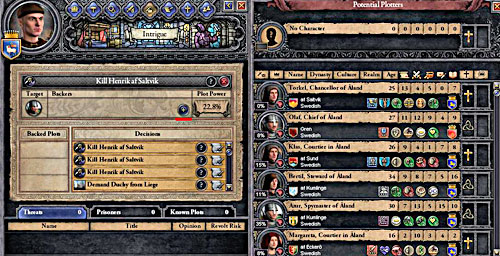 The more dangerous plots have not many supporters.
The more dangerous plots have not many supporters. In the upper part of Intrigue window you can find the bookmark of ambitions and plots. There you choose long-term plans, concerning particular persons and events. Such decisions can have various character: from wedding, through plans regarding your hero's career until the coups d'etat, including assassinations. The crucial is fact that, the more plot's supporters gather (you add them manually, screen above), the more possible that it'll success. Every next participant increases scale of an action and its effectivity. Of course, not every noble has to agree to take part in such plot: many of them will be against, so bribes are necessary.
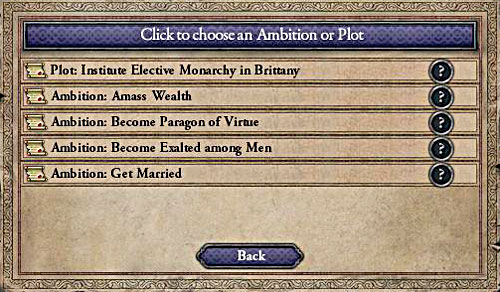 Only beginning ambitions differ. Later they are limited to assassinations.
Only beginning ambitions differ. Later they are limited to assassinations. Another detail is a fact that every person has his own court spymaster (Council) who can detect plots. If your conspiracy is discovered by your sovereign, he can imprison you with impunity (it doesn't affect your partners!) or ask for canceling plans. That's why you should act carefully, when you're an intriguer, and wisely, when you're a ruler. Especially the situation of the second one is curious: sometimes it's more profitable to let the plot happen, because they are good for the kingdom. Of course, plots can be manipulated in various way.
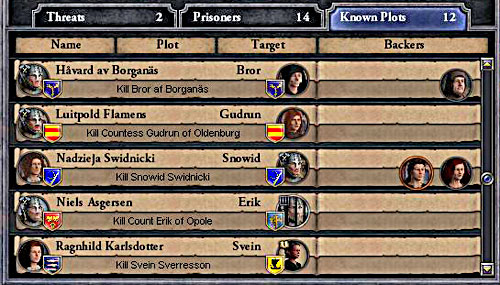 If the spymaster is good, all things will be visible.
If the spymaster is good, all things will be visible. Totality of discovered plot you can look through in the window of known plots (screen above. What is essential, the number and speed of discovering conspircies depends totally on spymaster's abilities and his ruler. You can't infiltrate your vassals if you don't have one.
Besides ambitions and plots, in the Intrigue bookmark you can make so called decisions. Those are single, usually expensive, actions with clearly described target. List of all decisions you can find below.

Decisions
Terms
Effect
Remarks
Hold a Grand Tournament
There is peace
Person has over 16 years
Prestige above 500
Costs 200 gold
+100 to prestige
+10 to vassals' opinion
Grand Tournament takes place
Very profitable decision, which allow on repairing your reputation. Another plus is fact, that during the tournament many random, positive events happen.
Invite Holy Man to Court
Costs 5 piety points
Person appropriate for the priestly service springs up on the court
Useful, if you don't have any priest and there is a bishopric to be cast. It also interesting when most of the clerge is against you: you simply replace them.
Invite Noble to Court
Cost in gold depends of your county size.
Knight springs up on the court
Unprofitable decision. It's much better to invite someone from the other country. This option is useful only when you're playing as a queen and no one want to agree on the matrylinear wedding.
Present Debutante
Cost in gold depends on your county size.
Woman in age proper to deliver the children appears on the court
Useful if any women want to wed your character. Otherwise, it's better to take some foreign woman, because it effects with alliance, social level up or perspective of new lands.
Hold a Feast
There is peace
You're not a prisoner and you can pay for the feast (costs depends on country's size)
It's november
At least 100 prestige points
The big feast takes place
+0,05 to prestige monthly, by year
Additionally several prestige points
Amount of gained prestige is ridiculous, and possible events totally random (negative also). It's not a profitable choice.
Hold a Summer Fair
There is peace
You're not a prisoner and you can pay for the feast (costs depends on country's size)
Months between may and august
At least 100 prestige points
There is a meeting with traders
+0,05 to prestige monthly, by year
Like above.
Go on a Great Hunt
There is peace
You're not a prisoner and you can pay for the feast (costs depends on country's size)
Months between september and november
At least 100 prestige points
You go for a hunt
Like above. In addition, you may be attacked by the wild animal and die during the hunt.
Buy Indulgence for my sins
Cost in gold depend on the county side and relations with the pope
You're not a heretic
+25 to piety
+10 to relation with the pope
Useful when you immediately need piety points (e.g. for hiring knight order) or you care about good relations with the Church. Of course, pope can refuse the bribery, what makes your reaction even worse.
It often happens that some character dependent on you makes some troubles: is no eager to help you during wars, want to rebel or is to ambitious. One of a way to make him away is to imprison him. If you catch one of your subordinate on plotting or he lose the civil war, you can arrest him without any consequences. In remaining cases you have to take into consideration a strong aversion of vassals. That's why you have to have strong proofs to avoid problems in all country.
 Chain icon informs you who can be imprisoned with impunity.
Chain icon informs you who can be imprisoned with impunity.Possibility of imprisoned character are very small. Such persons can't make any external politics, what mean no war declaration. It's essential information, because imprisoned vassal can refuse obedience to the sovereign. But it doesn't mean that the presence of the prisoner isn't a problem: he is still a legal owner of his lands. It means, that after his death those estates will be sign over to his descendants, and those for sure won't be happy about the prisoner's lot. The imprisoning also doesn't harm the vote possibility. If you have a election system (House: Succession) the prisoner can vote. It concerns also voting over laws (Laws).
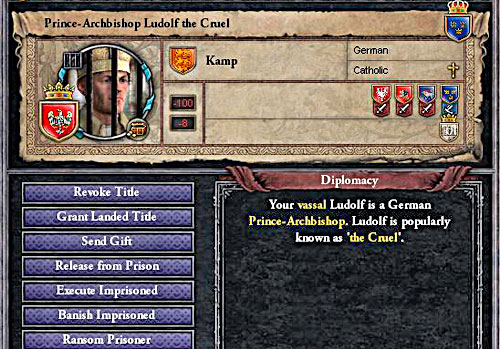 Even imprisoned, vassals may be problematic.
Even imprisoned, vassals may be problematic. What you can do with the prisoner? You have few possibilities:
* Release from Prison - increasing your opinion about 10. It's rather unprofitable and very risky option: it is not excluded, that the vassal will decide to stand against his liberator. This choice should be made only when you're sure about loyalty of the vassal, so almost never. What is curious, if you're vassals have prisoners, you can ask to release them.
* Execute Imprisoned - killing the prisoner fruits with aversion of all vassals (-10 to opinion) and lose of 20 piety points. It's much better to assassinate the prisoner. It costs 50 gold and is risky, but the work can be done quietly (look at Diplomacy: Assassination).
* Banish Imprisoned - exclude the character from the kingdom totally and simultaneously confiscates all of his titles and money. It's very perceived by all vassals (-40 to opinion) and is connected with the risk that someone clever will give a warm welcome to the exile and decide to fight for him (Military: How to declare a war?) So if you decided to banish your subordinate, you should kill him ASAP. Gathered in such way lands it's best to distribute among enraged vassals.
* Ransom Prisoner - it releases the prisoner if he pays adequate price. It's nice choice in case of powerful characters (moneys!), but risky also: released character for sure will stand against you quickly.
Plotters are ruining my plans constantly. How to get rid of them?
Crucial is hiring a good spymaster with high Intrigue. If he discovers the plot, you'll be able to imprison all participants or tell them to cancel the conspiracy. If they run out, load the game: civil war isn't funny. Eventually, if nothing else works, you can make an assassination, it'll solve your problem permanently.
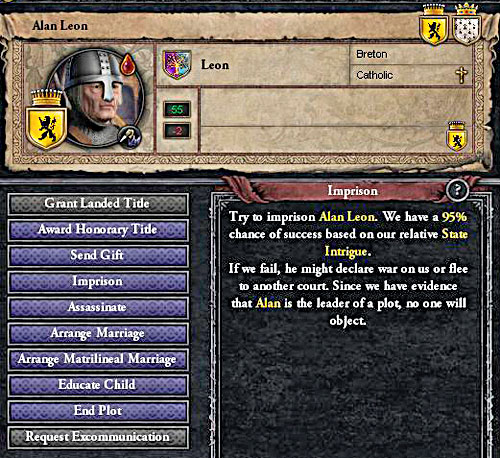 Imprisoning enemies is usually a good idea.
Imprisoning enemies is usually a good idea. My subordinates keep rebelling even though game doesn't inform me about the possibility of revolt. What is happening?
Probably your court spymaster isn't good enough to detect all plots. Changing him on a better model should work. If he finds a conspiracy, you need to just imprison plotters or interrupt their actions. If those are peasants who keep rebelling, you can solve thus problem by using marshall's ability.
If in the most of computer game the basic persuasion tool is violent, in the Crusader Kings II the diplomacy is essential. Thanks to mediation and talks you can achieve almost everything: from help in the war, through enemy's excommunication til the marriage or declaration of war. Range of possibilities is really big, what can astonish beginner tacticians. On the following pages of the guide you'll find many advices, thanks to which you can feel like an experienced diplomat.
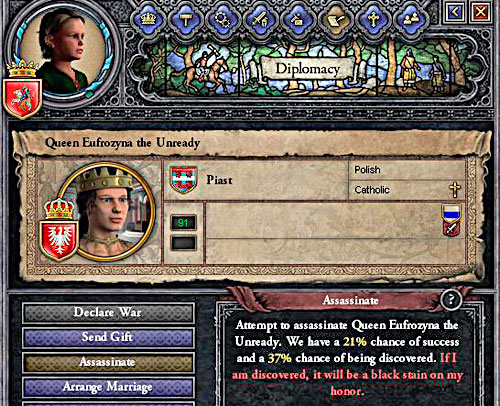 Politics is merciless: if its needed to kill your mother, you have to do it.
Politics is merciless: if its needed to kill your mother, you have to do it.As the art of diplomacy based on human relations, it's worth to acquaint with the Characters earlier. As the most important element of the game, diplomacy puts together with the remaining parts of the game, especially with the military and intrigues (more information in chapters Military and Intrigues). The dialogues are managed by clicking on the particular person and choosing proper options.
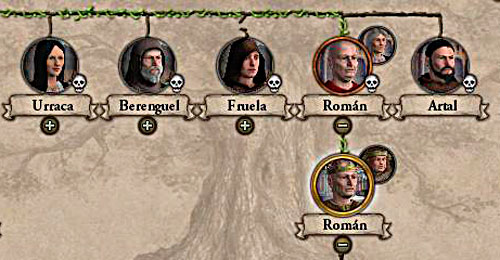 This king father was only a bishop. As you can see, the diplomacy does miracles.
This king father was only a bishop. As you can see, the diplomacy does miracles. Every person in the game has its own politics, even the teen counts. The world of Crusader Kings II pulsate with whole branches of intrigues, secret wars and long-term plans. It's constant, often non-declared war. Players, as its participant, has to make his steps faster than enemies and don't let them see his intentions. It's crucial to plan adequately to your strength: if you're not an important count you can't fight openly with the great emperor.
That's the goal of diplomacy: thanks to it the poorest courtier can achieve glory and the most powerful ruler can fall. Clever directing the dialogues is essential in being successful: without proper abilities and plans, you can do nothing. Luckily, all important things you'll find in this guide.
As it was mentioned, the game has no clearly definied goal. Despite that most of players tries to gather and keep as much power as they can, only few of them can be satisfied with playing as a count during the all game. That's why advices here are dedicated mostly to the players who want to cumulate as much glory as it's possible. In more details it's described in the chapter Riding on a Top.
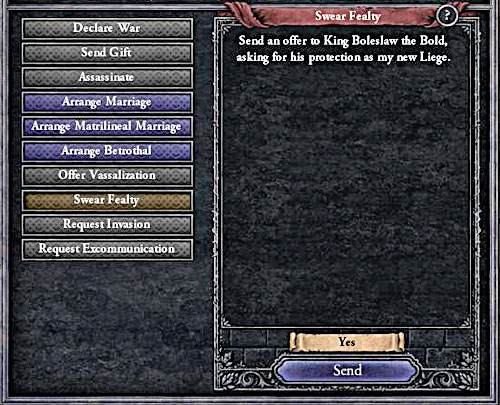 Rulers usually agrees to tributes, it increases their domain.
Rulers usually agrees to tributes, it increases their domain. The basic thing you have to do is defining a situation of your domain. Depending on you play as a king or a count the game will be different. Characters independent form the sovereign have to state for themselves. If they are attacked by an enemy and have no allies, they'll have to fight alone. Vassals are here in the more comfortable situation, because if someone attacks them, he'll automatically attack their sovereign (who will defeat them easier). That's why sometimes is good to make a swear fealty to some king (screen above). It guarantees safety against of external enemies. To do that, click the chosen monarch and chose the Swear Fealty.
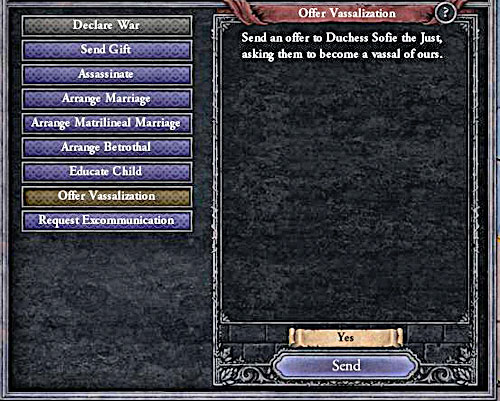 If the ruler is really strong, he can propose a vassalization to the weak counts.
If the ruler is really strong, he can propose a vassalization to the weak counts. Of course it's cozy only in some situations: if you attack someone, your sovereign won't do anything. Another detail is a fact, that the sovereign can take your lands. On the other hand: if you play as an independent character, what will protect you against invasion? Only two things, alliances and strong army.
Alliances are made thanks to the marriages. Thanks to the wedding with the prince/princess, you gain favour of its direct sovereign, usually brother or father. During looking for a wed, check who is his sovereign. Look carefully also on the flag color, the alliance will be made only when it's blue (screen below).
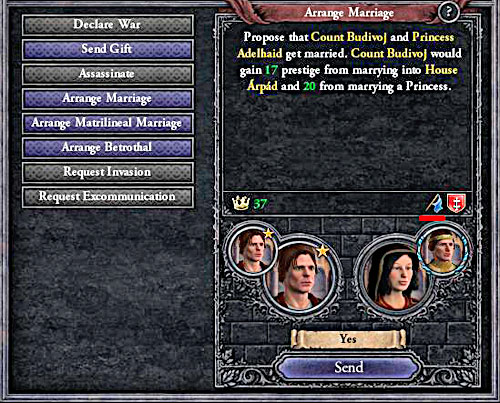 Flag means that the alliance with the prince whose portrait is over the young bride will be made.
Flag means that the alliance with the prince whose portrait is over the young bride will be made. When you decided on the wedding (House: Marriages), the alliance will be made in the day of wedding (not in the day of signing an agreement). Remember of course, that the allies can be treacherous: they can refuse to support you. Alliance ends when one of the sides dies, there is no possibilities to cancel it earlier (there can't be even a war). So wedding is not only a good way to increasing your military potential but also protecting of your backs.
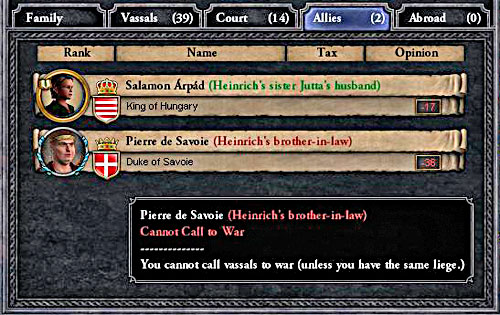 When you move the mouse over the ally, you'll see information about him.
When you move the mouse over the ally, you'll see information about him. Of course you can look through alliances in every moment: you just need to click on the character's profile and choose the bookmark Allies (screen above).
More information about wars you can find in the chapter Military. As there are few types of wedding, it's worth to look to the House: Marriages also.
Assassination is one of the most often and important diplomatic option. Thanks to one simple cut you can assure yourself the power (e.g. becoming a heir) or stop the uncomfortable war Military: Problem?). Killers are very powerful but dangerous tool: luckily, enemies use them rarely. As if the cost of one attack is only 50 gold, it's worth to use them ASAP. It's the easiest way of solving problems.
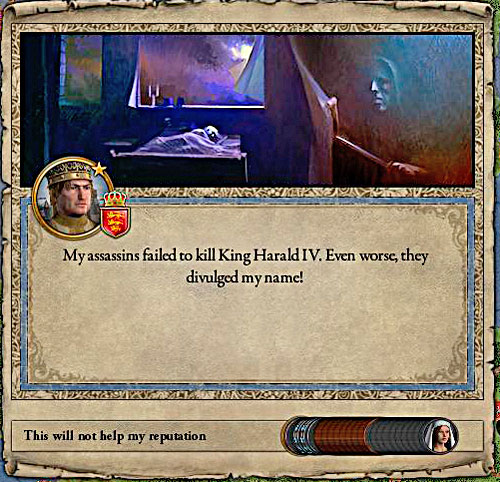 -10 to relation with vassals and -50 piety points. Assassins mistakes are very expensive.
-10 to relation with vassals and -50 piety points. Assassins mistakes are very expensive.The basic problem with assassination is fact, that they often fail. During making an attempt state intrigue (sum of player's, his wed and spy Intrigue)of attackers is taken into consideration and compare with the same statistic of the attacked person. Risk of the failure is big, and those are consequences:
* assassination succeeded - optimal option with no penalties.
* assassination succeeded, but the assassin got caught - although the attempt is a success, it's better to load the game and try once again. Enraged family of the killed person will hate you and all vassals will be disappointed. There is also a risk that the harmed House will try to assassinate you. What is more, you lose 50 piety points.
* assassination failed, but the assassin run away - only lose of 50 gold.
* assassination failed and the assassin got caught - the worst option. Attempt's target will be mad and, if he is rich enough, he'll send assassinates upon you. All of your vassals will be disappointed. You also lose 50 piety points. Better load the game.
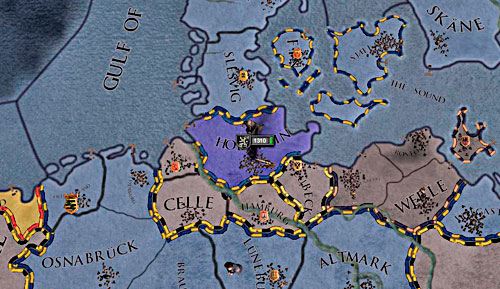 Inconsiderate assassination made that the Danish Holstein get into French hands.
Inconsiderate assassination made that the Danish Holstein get into French hands. What are practical usages of the assassins? Besides mentioned taking over the power and interrupting the war, also caring about order in the country is important. If there is a suspicion that part of vassals want to rebel, and you can't imprison them legally (Intrigues: Prisoners), an assassination is the best solution. But you should be careful in such cases, because it's easy to make the power goes to the inproper hands (e.g. other domain). In such situation regaining lands is very difficult and often requires a big war. (screen above).
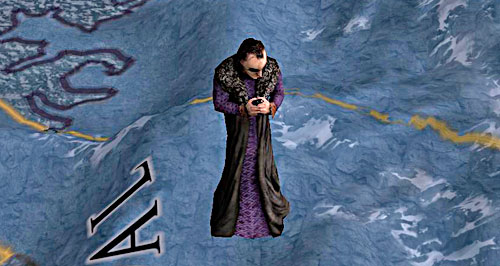 Use spymaster economically.
Use spymaster economically.To increase chances of assassination, you can support the killer with the spymaster. Thanks to his Build Spy Network ability, he can make the task easier. But remember, that an agent who is doing that, can't do anything else at the moment so the whole country remains vulnerable for a while.
One of the available diplomatic option is Educate child, what is important but often underestimate by the players. On the type of the child's mentor depends most of his abilities, traits and career. Part of child's statistics isn't conditional upon succession but upon his and his mentor's choices.
Your character can be both: if he's a child he needs a proper mentor, and when he is an adult ruler, he can educate young persons.
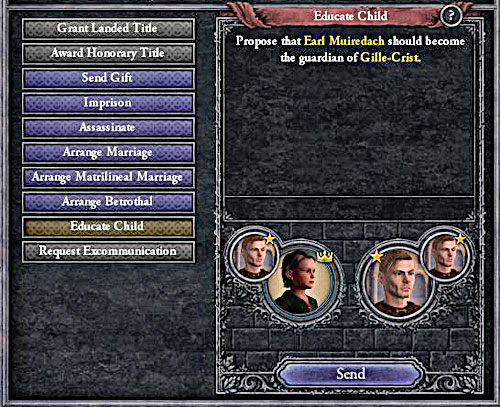 Educating your children makes you sure about choice of their features.
Educating your children makes you sure about choice of their features. When the child is six, you need to choose him a mentor. If you don't many vassals will volunteer to do that, and be offended when you decline such a proposal. That's why solve the matter of education by yourself. During choosing the teacher, look at his abilities (they should be the highest possible). It's often important to choose wisely: princess doesn't need mentor-warrior and the young prince should be educated by the talented diplomats, stewards or intriguers.
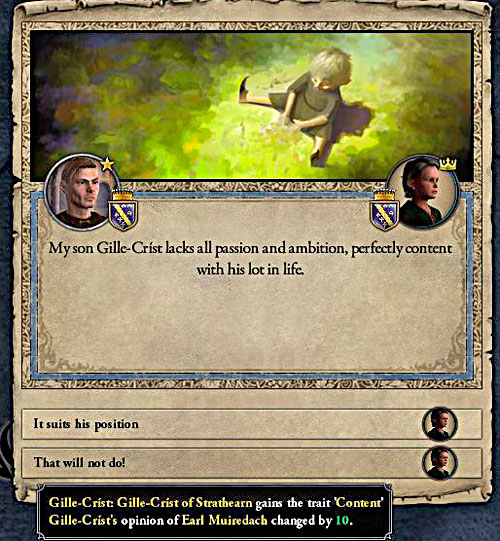 If you're mentor, you can manage your pupil' development.
If you're mentor, you can manage your pupil' development. Not without meaning are also traits and possibilities of career: there is a chance, that they'll be passed during the education. That's why it's very important to get to know their meaning and effects (Characters: Traits). When you're child's mentor, you can shape his personality, by choosing the proper dialogue options (screen above). Nevertheless, if you don't have high features it's better to give a child to someone more qualified.
As it was mentioned, every activity in the game links with the diplomacy somehow, because it's more a tool than a goal itself. To not repeat information that are on the other pages of the guide, below I put all diplomatic options and chapters when you can find them.
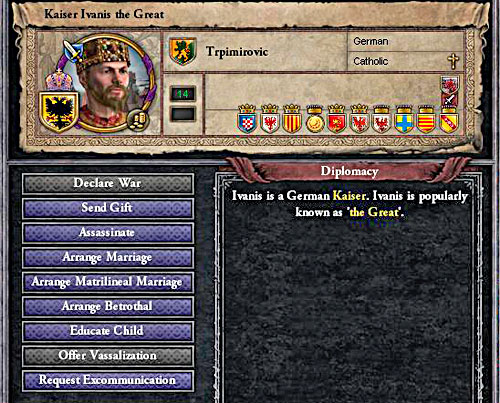 Diplomatic option are contextual, they change depend on with who you're talking with.
Diplomatic option are contextual, they change depend on with who you're talking with. Declare War - Military: How to declare a war?
Send Gift - Characters: How to care about human relations?
Assassinate - Diplomacy: Assassination
Marriages' options - House: Marriages
Educate Child - Diplomacy: Educate Child
Offer Vassalization/Swear Fealty - Diplomacy: Vassals and sovereigns
Invasion agreement - Religion: Basics and Military: How to declare a war?
Request Excommunication - Religion: Basics and Military: How to declare a war?
Taking away the title - Intrigues: Ambitions and conspiracies
Awarding the title - Characters: How to care about human relations?
Awarding the honorary title - Characters: Honorary titles
Send Gift - Characters: How to care about human relations?
Imprisoning - Intrigues: Ambitions and conspiracies, Intrigues: Prisoners
Assassinate - Diplomacy: Assassination
Marriages' options - House: Marriages
Educate Child - Diplomacy: Educate Child
Moving the vassal - Characters: How to care about human relations?
Declare War - Military: How to declare a war?
Awarding the title - Characters: How to care about human relations?
Send Gift - Characters: How to care about human relations?
Assassinate - Diplomacy: Assassination
Request cancelling Excommunication - Religion: Basics
Divorce - Religion: Basics
Negotiate a peace: Military: War campaigns
Call a support: Military: War campaigns
Concerning prisoner: Intrigues: Prisoners
Religion plays in the Crusader Kings II a big role. Crusades, jihads, excommunication, investiture, Church's schisms: those only few issues that you should look upon and which are connected strictly with the religious life in his country. Issues concerning religion are present at every stage of the game and not only by the points but also by various interactions, especially with the pope.
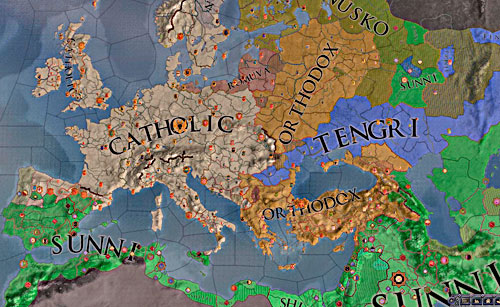 Catholicism is the most popular religion
Catholicism is the most popular religionThere are four big religions: catholicism, orthodox, shiism and sunni. Every of this cult has its own religion leader who decides about holy wars, divorces and many other things. Besides those religion, there are also smaller ones, pagan: but they don't matter much.
You can play only as a Christian ruler, so catholic or orthodox one. When you're believe of one of those, you can freely declare wars at infidels. It doesn't break the law among "equal" monarchs. In practice it means that catholic can attack every muslim and pagan, but to fight with the orthodox he needs a casus belli.
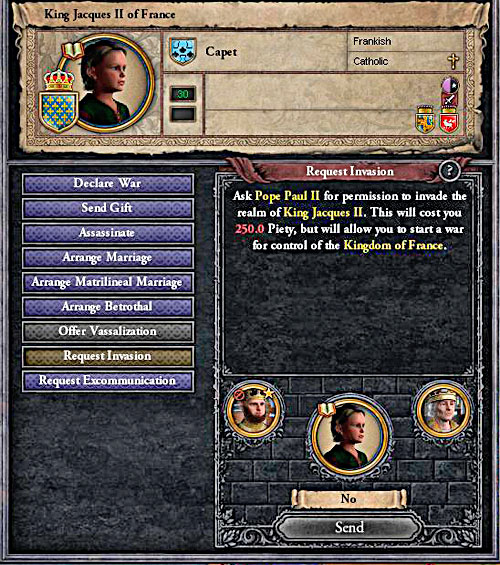 Pope can decide about whole kingdoms. Better not upset him.
Pope can decide about whole kingdoms. Better not upset him. Relations with the heads of the Church have crucial role in the religious development of the country and character. Those persons decide about excommunication, crusades and divorces, so it's worth to keep them satisfied. Below you can find list of all interactions you can make:
* Request Invasion - sometimes you want to attack fellow believer, but you don't have a proper casus belli. In such case you can ask pope or patriarch for a dispensation. If you're a catholic leader with at least 250 piety points (500 for an emperor) without any wars at the moment, you may ask the Head of the Church for blessing invasion on other, Christian country. Victory in such war allow you to get all domain of the defeated enemy with two reservations: defender has to have more lands than an attacker and the whole action depends on the pope's will.
* excommunication - another way to take over the power in someone's country is ask the religion authority for excommunicate an enemy. If the relations between the victim and the cult's leader aren't good, you have big chances for getting it. In such case, after excommunication, you can harm enemy as you like, because he stops being a member of the Church. Every other Christian will be also able to fight with him. And if you're excommunicated you can ask pope or patriarch for cancelling it, what usually requires shiny yellow arguments. An alternative is setting up your own cult, as it's described in the Religion: Antipope.
* divorce - if for some reasons you need to get rid of the wed, and you don;t want to assassinate him/her it's worth to ask pope or patriarch for a divorce. Religion leaders rarely accept such asks, and the act itself is expensive (100 piety points) and also it annoys family of the deserted one. That's why usually is better to kill a wed.
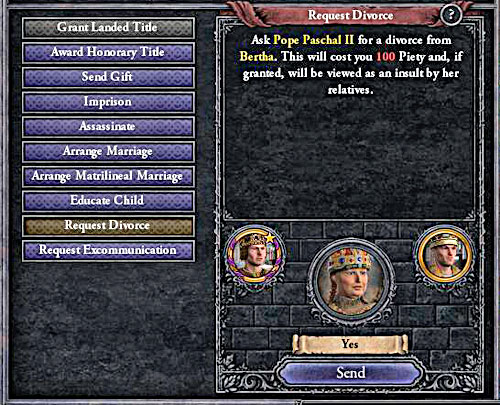 I should murder her.
I should murder her. Of course all characters in the game can negotiate with the religion leaders according to the same rules: so watch out enemy's plots. The most comfortable way to secure yourself is to keep good relations with the pope or patriarch or set up your own cult. The second option is usually even better, because the antipope is more submissive, what save you from additional problems.
As it was mentioned in Laws: Royal laws, an investiture is a law which affects directly on the possibility of nominating bishops and their taxes. If you have a free investiture you can decide personally about residents of bishoprics and collect taxes from them (if bishops agree). When the investiture belongs to the pope or patriarch, all decisions are theirs. It's not hard to guess that the first option is more cozy, but it dissatisfy the Head of the Church. It hasn't end with an excommunication or an open war: usually the religion leader limits to ask for the change of the law. Only in the moment of refusal, the difficulties begin. That's why it's worth to change some royal law just after getting the crown: after that you won't be able to change another one (but your descendant can).
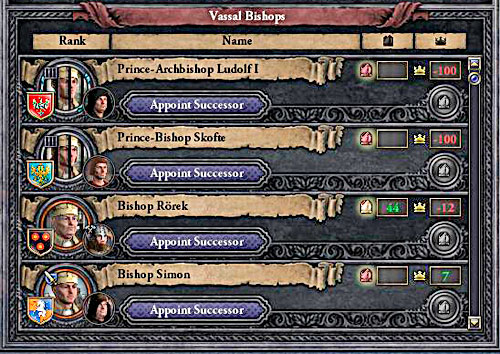 Bishops can be nominated only with a free investiture.
Bishops can be nominated only with a free investiture. If you have a free investiture you can nominate new bishops in the bookmark of religion in the upper part of the screen (screen above). If one of your vassals is the servant of the Church and is making troubles, it's worth to choose good successor and kill the troublesome subordinate. No civil wars guaranteed.
Matter of income from the Church lands is explained in the chapters Economy and Laws: Royal laws.
Once upon a time the Church leader appoints a crusade, the great war campaign against infidels. All Christian rulers will be invited to take part in the war. Crusades differ from other conflicts, that they're connected to big profits: mainly, but not only, in piety points. Every ruler who declare the war at the Church's enemy gains additional bonuses. Besides money gift from the pope or patriarch you gain also prestige. Almost every battle with infidels, getting to the crusade's place , siege gives piety points, prestige and sometimes also moneys.
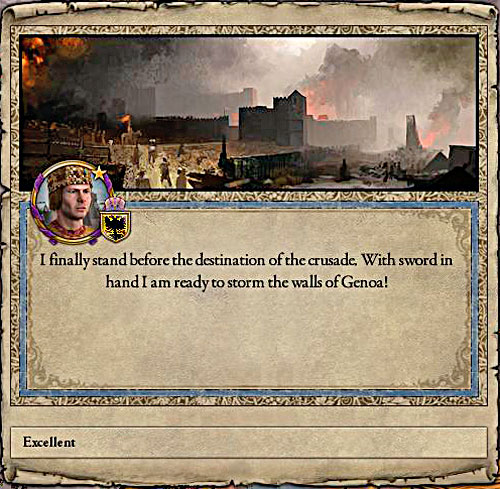 Even getting at the place means piety points and prestige income.
Even getting at the place means piety points and prestige income. The biggest value of crusades is a fact, that they are massive events: many rulers want to endear themselves to the Father of the Church. It's very good, because enemy has to fight with few enemies and can't concentrate only on ne. So you can leave the hardest battles to the other characters and conquer the city which is a crusade's target (500 piety points and conquered lands) and end the war (screen below).
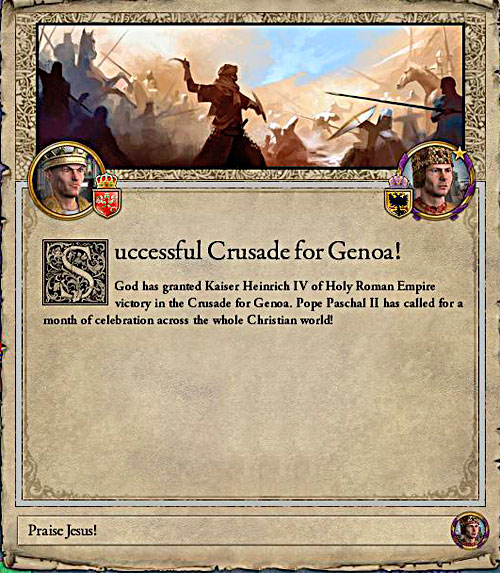 Victory in the crusade make the pope very happy.
Victory in the crusade make the pope very happy.On the other hand as you can guess there is a lot of rivals, what may be problematic. Sometimes you can be forced to play dirty to achieve the success. In such situation you can assassinate the character who is trying to get the victory- away from you (e.g. he sieges the target of the crusade). After that this fraction will have to declare a war once again what requires time.
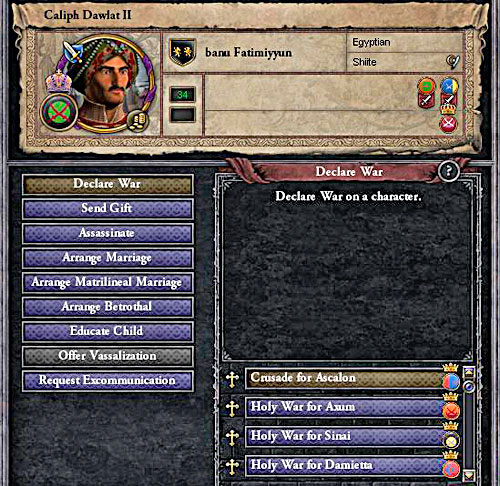 Crusade is a big undertaking, it's worth to prepare for it.
Crusade is a big undertaking, it's worth to prepare for it. When the crusade ends, you have to care about the war trophies. Religion wars have different, not only religious goals. A character who conquer the land, can create his own country on the new lands. Of course it's similarly in the case of Muslims who has jihad instead of crusade.
History of the western Christianity knows a lot of cases when the war about leadership of the Church took place. Schisms and wars between popes weren't anything extraordinary, and long lasting religious conflicts are constantly inscribed in the image of medieval Europe. Crusader Kings II includes this element of history which is presented in both curious and useful way.
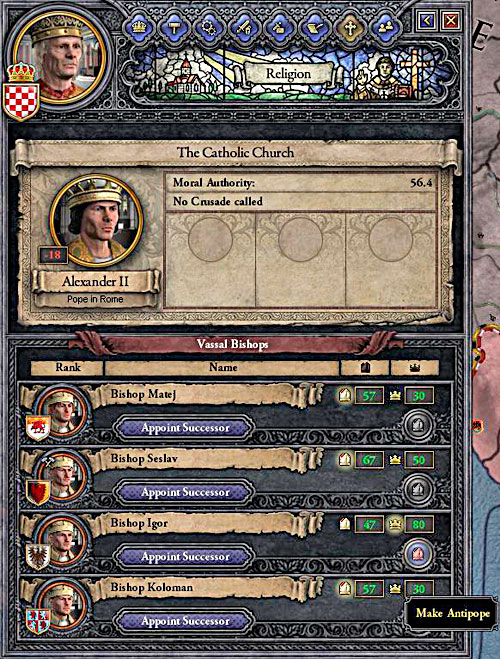 Not everyone agrees to fight against the pope.
Not everyone agrees to fight against the pope.If you're a catholic character and your relations with the pope aren't too well, you can consider appointing the antipope, who is your own candidate for the head of the Church. To do so, you have to fullfill few terms: have a right of free investiture, 500 prestige points to spend and find the priest who'll agree to become an usurper (he has to like you more than the actual pope). Only when you complete all those criterions, you can nominate the antipope (screen above).
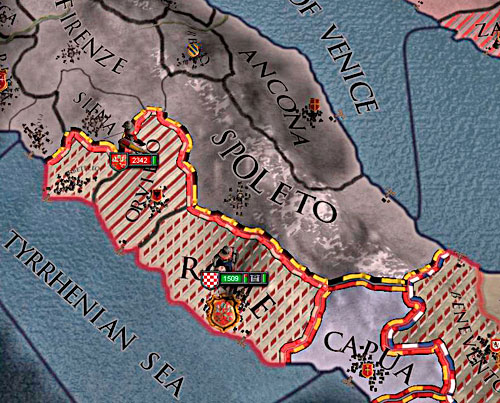 Vatican is rich, so that they can afford expensive mercenaries.
Vatican is rich, so that they can afford expensive mercenaries. What profits are brought up with the antipope? First of all, he is much more submissive than the actual pope so it's easier to persuade him to the divorce or excommunication. The crucial is fast that after nomination only antipope can exclude your subordinates from the Church, because they're no longer subjects of the real pope. It let you on freely operating with the excommunicate in your domain and protecting it from the legal Church.
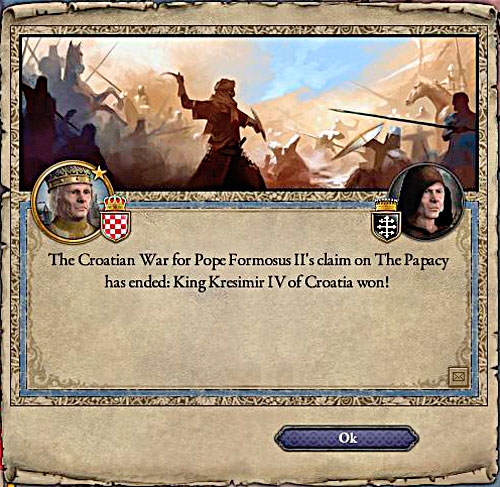 Wars with the popes are fought alone. Catholic rulers will then fear excommunication and they'll disregard an alliance with the player.
Wars with the popes are fought alone. Catholic rulers will then fear excommunication and they'll disregard an alliance with the player.Antipope means also problems; legal Father of the Church won't be happy that he has a rival, so he can declare war or even a crusade against the usurper. Another issue is fact that the kingdom with the antipope won't be trusted by the catholic rulers. Luckily, you can solve this problem. You just need to attack the pope and after winning place your antipope in the Rome. In such way you can move back to the Church with very favorable, new holy father.
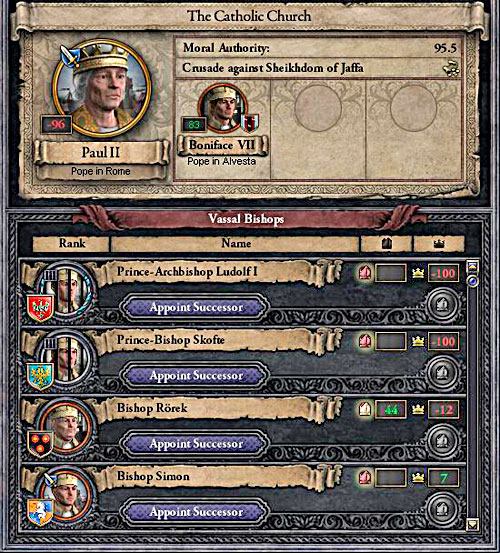 You can appoint successor to the antipope too, like in case of bishops (free investiture).
You can appoint successor to the antipope too, like in case of bishops (free investiture). Despite of possible profits, having an antipope isn't really profitable. Chances of easy divorces and excommunications of vassals won't things for which you can risk a crusade and aversion of all catholic world. That's why it's better to stay pope's sheep than labour over problems.
How to change a religion?
It can be done, but it's long and full of effort operation. You have to begin with proper education of the descendant. If we choose a mentor who is an infidel with a high Learning, there is a big possibility that the child will gain the religion after his mentor. And when your character dies it's enough to play as this infidel son. But it has to be mentioned that such action is totally unprofitable: because your subordinates won't follow your change of religion automatically. What means long and expensive converting of all your subjects in all provinces.
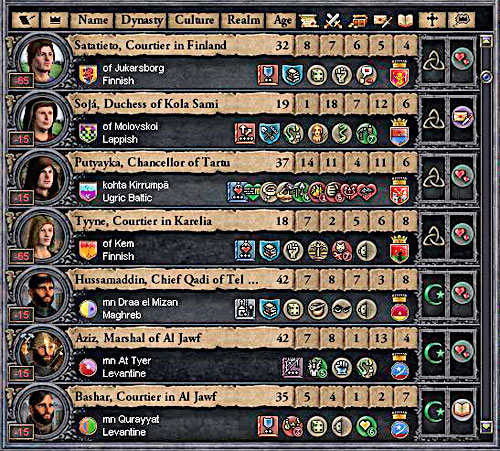 Bringing up the descendant as a pagan can have curious effects.
Bringing up the descendant as a pagan can have curious effects. Easier is to use one of the random events: if one of your bishops decide to change his religion, he'll probably try to convert you. Just agree his proposition.
There are many titles in the game which are given to the particular characters. About what type of title the person has, decides type of his lands. For instance, if the townsman receives the city he'll become a mayor and if the bishopric, then a bishop. For making it easier, every character is titled from the highest title. It means that even if the king has few counties he won't be called a count but the king.
You can get titles by distribution (monarchs gives land) or thanks to the marriages or succession.
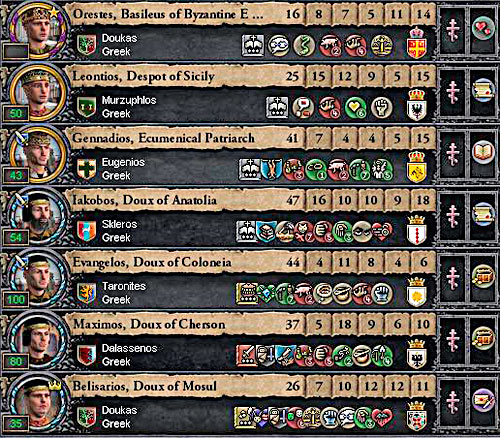 It's easy to get lost in here.
It's easy to get lost in here.As if there are lot of titles and lands, below you can find them in few charts, what makes them more intuitive.
Level I
Range of power: one of estates in the county
Color of character's icon: brown

Name
Type
Other names
Possible estates
Meaning and possibilities
Baron
Feudal lord
Wali
Barony(castle)
Unplayable. The lowest type of feudal lords, with very small meaning.
Bishop
Clergyman
Priest, shaman, mufty, mullah
Bishopric
Unplayable. The lowest type of clergyman. Bishop's children aren't taken into consideration during succession.
Mayor
Townsman
-
City
Unplayable. The lowest type of towsman, very small meaning.
Level II
Range of power: one field on the map (province, called a county in this guide)
Color of character's icon: silver

Name
Type
Other names
Possible estates
Meaning and possibilities
Count
Feudal lords
Earl, Sheikh
County
The weakest playable person. More details in Basics: Choice of person, region and time: Count.
Prince-bishop
Clergyman
Metropolitan, high priest, seid, sheikh, ayatollah
Bishop duchy
Unplayable, managing the province with the bishopric as a dominating structure. His children aren't taken into account during succession.
Lord mayor
Townsman
-
Big city
Unplayable. It's not worth to make a marriage with the Lord mayor, because his position is elective. Besides that he has the same possibilities as a count.
Attention! For making it easier, most of lords from the Level II are called counts and their lands counties in this guide.
Level III
Range of power: duchy which usually contains few provinces. Duchy's owners have no influence on what is happening in those counties unless they are their directly owners (counts, princ-bishops or Lords mayor)!
Color of character's icon: silver with the blue scarfs

Name
Type
Other names
Possible estates
Meaning and possibilities
Duke
Feudal lord
Emir, jarl
Duchy, emirate
Playable, has few provinces. More details in Basics: Choice of person, region and time: Duke
Prince-archbishop
Clergyman
Patriarch, archpriest, great mufty, great ayatollah
Archbishop duchy
Unplayable, managing few provinces but a clergyman. His children aren't taken into account during succession.
Doge
Townsman
-
Republic
Unplayable. It's not worth to make a marriage with the Doge, because his position is elective. Besides that he has the same possibilities as a duke.
Attention! For making it easier, most of lords from the Level III are called dukes and their lands duchies in this guide.
Level IV
Range of power: kingdom (set of provinces and duchies)
Color of character's icon: gold

Name
Type
Other names
Possible estates
Meaning and possibilities
King
Feudal lord
Sultan, Despot
Kingdom
Political leader of the country, one of the most important playable persons in the game. More details in Basics: Choice of person, region and time: King
Pope
Pope
Ecumenical patriarch
Papacy
Unplayable, religious leader of particular cult. Decides about divorces, crusades and excommunication. More in the chapter Religion.
Serene Doge
Townsman
-
Serene Republic
Unplayable, can control other doges and characters form lower level. It's not worth to make a marriage with the Serene Doge, because his position is elective. Besides that he has the same possibilities as a king.
Level V
Range of power: empire (big set of various lands)
Color of character's icon: gold with the violet scarf

Name
Other names
Type
Possible estates
Meaning and possibilities
Emperor
Kaiser, Basileus
Feudal lord
Empire
The highest secular, playable ruler. Only he can control kings. More in the chapter Basics: Choice of person, region and time Kaiser/Basileus
Caliph
-
Clergyman
Caliphat
Religion leader of sunni or shiism, who is simultaneously a secular ruler. His children can inherit the title.
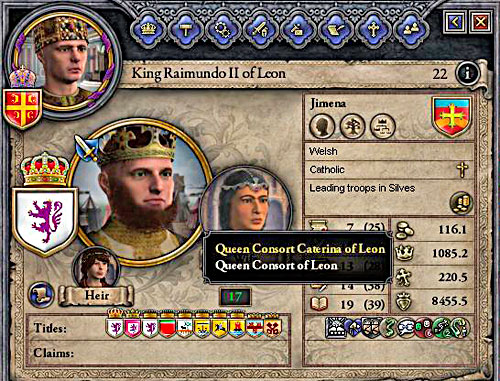 Additional titles have usually no meaning.
Additional titles have usually no meaning.Prince, princess - child of king and queen, with no function. Making a marriage with some princes means an alliance with the whole kingdom. Look at the chapter Succession.
Consort - person wed to the king or queen, but without royal title. No meaning, but his/her children usually can inherit the crown.
Queen Mother - mother of the actual king. Although she has no meaning, but thanks to the marriage with her you can get rights to the crown for your children if you kill all of other heirs (Succession).
Regent - person reigning instead of sick or juvenile ruler. Has no power and his decisions depend on the sovereign.
Captain of the Varangian Guard - only in Byzantic Empire without any real power and lands.
Counts, dukes, kings and emperors. Everyone from this group has other possibilities and meaning, everyone has to follow other priorities. That's why all those characters have a paragraphs below. Of course, ideas which are shown here are only suggestions, maybe you find better solutions. On the following pages you can find methods which are most often successful and safe and also the most effective. But if you want to fight for the power with an effort: free to go. Here it's described how to reach the honours in few steps and keep them.
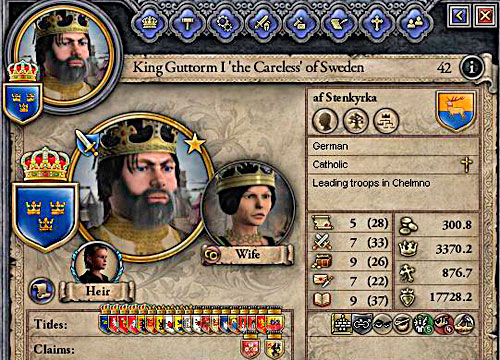 From poor count to the ruler of five different kingdoms - it's possible.
From poor count to the ruler of five different kingdoms - it's possible. The game is so complex and unpredictable that describing all of possibilities is impossible, here you can find the most often occurred events and how to use them. With such advices you should cope with the game. If you do everything correctly, the laurel of the winner will be yours.
Although count seems to be a meaningless character, he should have no problem with riding on a top in fact. You can do it on four ways: forcible solution, voluntary, legal and assassinate (are described below). About what possibilities count has you can read in Basics: Choice of person, region and time: Count.
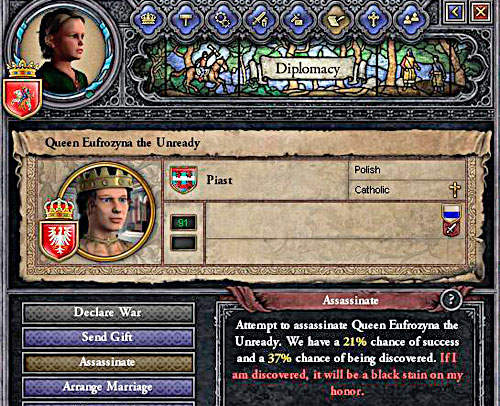 Politics is merciless: if its needed to kill your mother, you have to do it.
Politics is merciless: if its needed to kill your mother, you have to do it.Forcible solution lies on declaring war on the enemy and taking his lands. So it's rather problematic method, because real force confrontation is a risky thing. To improve our chances we should secure ourselves with proper alliances (Diplomacy: Alliances) and only then attack an enemy.
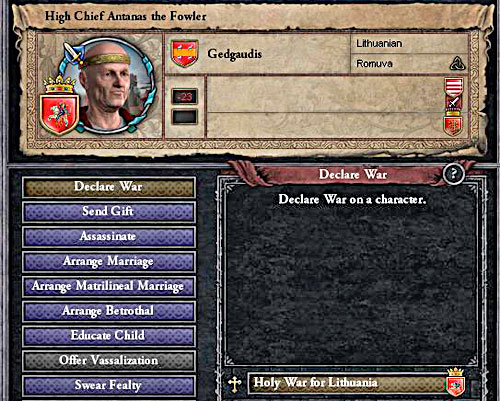 With allies' help war is very easy, even if you're playing as a count.
With allies' help war is very easy, even if you're playing as a count. But remember that not all allies are eager to help in wars. If you attacked an enemy who is too powerful for them (or they like him more than you), you would expect a refusal. So usually it's profitable to attack pagans: no civilized nations like them, so they're an easy target.
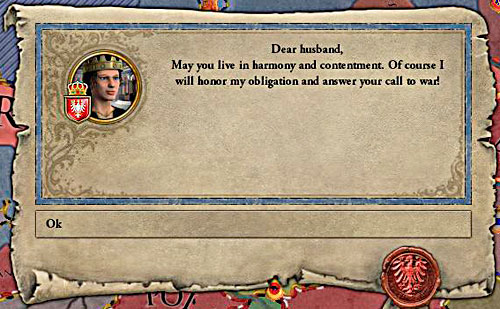 War help is a best wedding anniversary gift!
War help is a best wedding anniversary gift!Volunteer solution is rather easy one but available only for counts who are dependant from the sovereign. Every sovereign can use his wealth as he want for example distributing it to his subordinates. Independently from how you served your lord, you'll sooner or later be granted with new lands, honours and maybe even a social promotion (on a duke). It comes out of a fact that ruler has to care about his opinion among subjects, so he'll try to gain their respect in that way. So benefit as much as you can.
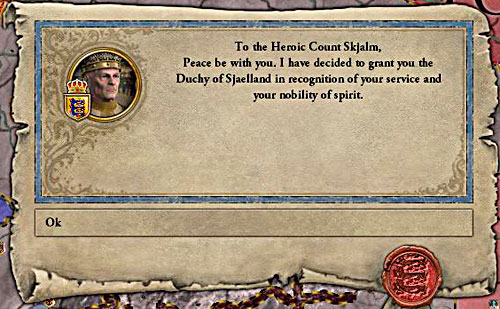 Good service is only a pretence.
Good service is only a pretence. This way is dedicated for players with enormous luck or big diplomatic abilities. Luck is useful, because without violence, assassinations and plots crown is hardly accessible. It comes out of simply reason: every participant want to achieve a success. That's why no one declares careless wars and makes unreasonable marriages. Only a lot of luck may cause that computer's plans won't be successful. But it happens, sometimes, so it's worth to have as many marriages with the children of the kings, as it's possible. Maybe someone will make mistake and you obtain a crown?
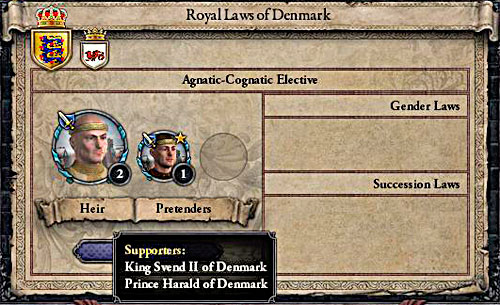 When you win the election, just kill the actual king and take over the throne.
When you win the election, just kill the actual king and take over the throne. Special situation takes place in countries where an election is. In such types of kingdoms you can support your luck with the bribes and sending chancellor to electors for convincing them to your candidature (look at: Council: Chancellor). This method requires heavenly patience: voters are very capricious and they can change their mind in every moment. But remember that you can't achieve the crown with such method: in that case dukes are electors (House: Succession: Election).That's why it's more profitable to choose less honest way.
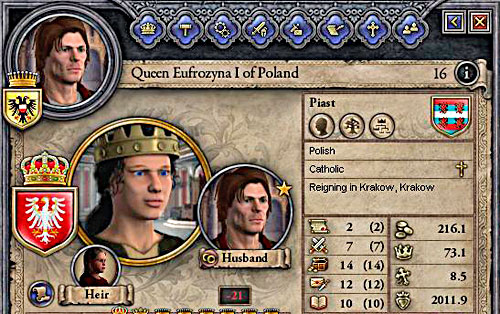 You can "help" your wife to gain the crown.
You can "help" your wife to gain the crown.Assassinate solution is very peaceful at the beginning, but ends up with murdering all heirs. Scheme is usually the same: wed with one of princesses, have a descendant and then kill all her brothers and father. Thanks to that procedure your wife get the crown quickly, and her children will inherit all the country. The most important is fact that all children from this marriage will inherit the House after their father thanks to which you'll be able to control them. It's described in details in the chapter House: How to get a title thanks to the marriage?
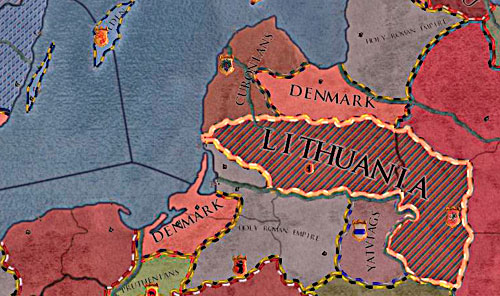 When your ally conquer an enemy, you just need to sign an agreement.
When your ally conquer an enemy, you just need to sign an agreement.Of course there is nothing against having few wars before you take the crown. Count wed to the princess has an alliance with the ruler of the country (usually her father). That's why, even before the social promotion you can seize some additional land with help of your ally. It's all the same as in the chapter Forcible solution.
If you have a territory which is included into some bigger duchy de jure and which hasn't been legitimized, you can establish such duchy (it also works with the kingdoms). In such way the count is automatically promoted to a duke simultaneously gaining a rights to all remaining lands that should be in his duchy. All de jure terrains you can see by clicking the proper filter icon next to the minimap in the right bottom corner of the screen.
 Instead of establishing a duchy, you can usurp it.
Instead of establishing a duchy, you can usurp it.If the county is established, and count occupies most of its territory without having a title of the duke, he can usurp this title. It requires lot of money and piety points, but it's profitable. You do it exactly the same like the establishing of the duchy.
Although dukes are inferior to the monarchs in cases of prestige and abilities, they have quite big range of power and privileges. Many rulers in the Eastern Europe (mostly in Russia) stay dukes to the end of the game, the crown isn't necessary for them. Despite that remember that dukes can rule over only persons with small meaning (I and II level, look to the Glossary), so all monarchs and other dukes will be out of their range. That's why gaining a crown should be a main priority for every ruler.
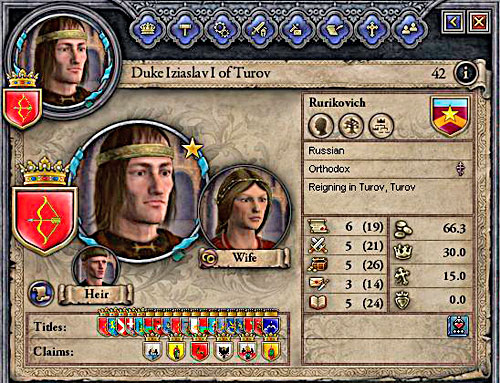 Russian dukes rarely reach the crown
Russian dukes rarely reach the crownYou can cumulate the power on many various ways. Part of them is the same as in the case of counts (previous chapter) but the rest is something new. First of all, as electors dukes can be chosen to be monarchs. What is more, if they have territory big enough which is a part of the kingdom de jure, they can usurp (or establish) its crown. Majority of dukes are closely relatives to each other, what makes assassinations a good solution. There are also more complicated methods (invasion, marriage), but they've been already described in other chapter (House: How to get a title thanks to the marriage? and Military: How to declare a war?).
In countries with the election (for instance the Holy Roman Empire) there is possibility to achieve a power thanks to the voting. To do so, you have to convince electors (list of them is in the list of sovereign's vassals). The easiest way to do that is of course bribery, but also some less direct method are useful. Especially splurge with the power: if you conquer lot of lands quickly, part of electors will vote on you. Also crusades or fight with infidels give you respect. If any of electors is very against you, consider killing or conquering him (when he is your subordinate, he has no vote rights).
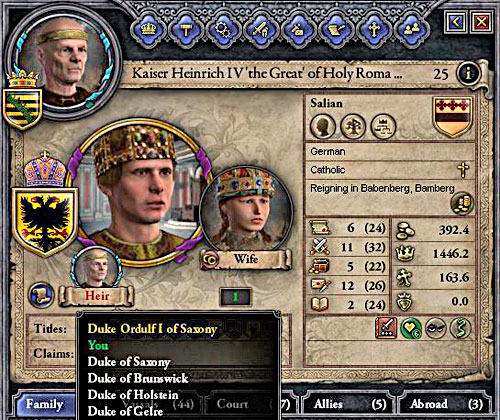 Thanks to the election you can promote from the duke straight to the emperor.
Thanks to the election you can promote from the duke straight to the emperor.Of course to be chosen, you have to be a duke within the kingdom with an election or at least relative to the actual ruler. It means that the characters out of the kingdom have big problems with seizing the power: they have to firstly conquer some part of it and then convince electors. All in all it's possible if you're patient enough.
Another way to enlarge your range of power is simple conquer, which works like in the example of count (previous chapter). But dukes have an advantage: they can declare war on monarchs and even may win it. Another big plus of dukes is that they can easily try to bring down their rulers and get the crown, as it is described n the Military: How to declare a war: Taking over the crown.
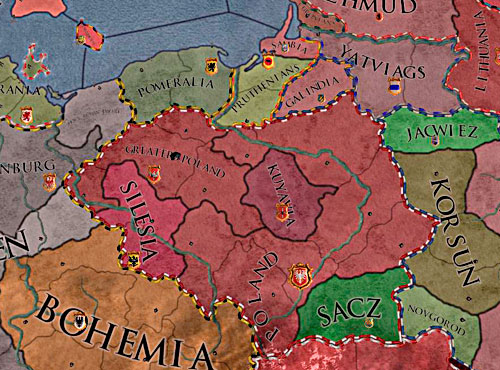 Maybe this time Greater Poland will unify the kingdom?
Maybe this time Greater Poland will unify the kingdom? If you have a marriage with some woman heir of the kingdom, it's also worth to fight for the crown. How to get it is described in the House: How to get a title thanks to the marriage? Of course you doesn't have to limit yourself to the assassinations. If your son has rights to the crown because of succession you can start a war for it (Military: How to declare a war: Vassals' rights to the land).
The easiest of all methods of riding on a top is assassination. Thanks to the few cuts you can obtain huge lands and even a crown. It's especially seen in case of Russian dukes, most of them are brothers or cousins. Playing as one of them it's usually enough to kill the rest to conquer their lands. It's even more interesting on the Iberian Peninsula: in 1066 all local kings are brothers, so when the one dies the rest will get his lands.
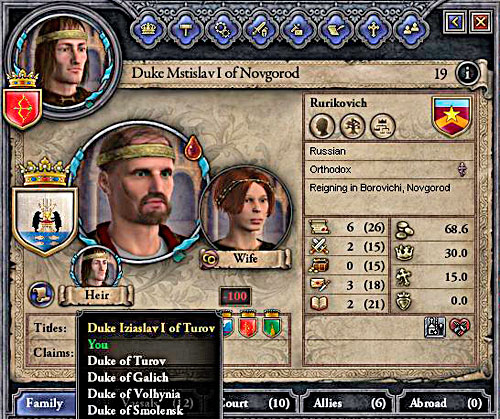 If you can take over son's lands, why not to do so?
If you can take over son's lands, why not to do so?If normal, valid family relations won't be enough, you can help yourself with the marriage. Wedding the princess and killing remaining heirs is a rather easy way for the crown. How to do it you can find in following chapters: House: How to get a title thanks to the marriage? and Riding on a Top: Count: Assassinate solution. In case of doubts, you may look in section Diplomacy: Assassination.
If you have most of some kingdom de jure territory, and it hasn't been established yet, you can make it. It's best seen on the example of the Czech duke, who has almost all lands of Czech kingdom (de jure) but nor him neither no one else has a crown. So it's enough to collect some amount of piety points and money and then bring to life new country. In that way the duke will become the king (screen below).
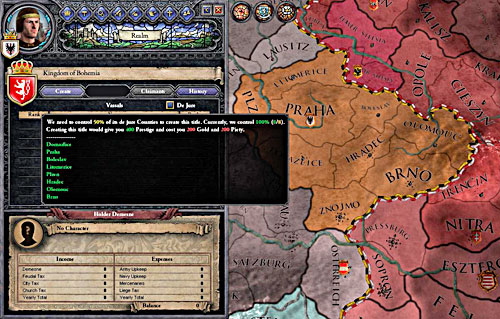 Czechs can create new kingdom very easily: they have all required lands.
Czechs can create new kingdom very easily: they have all required lands. In similar way it works in others countries. If you collect over a half of some kingdom's lands, you can create it. Usually it's connected with some conquers and marriages but it's very profitable.
New problem which you meet during playing as a duke is an issue of holding the kingdom united. It has to mentioned that your vassals are rather weak, and that's why they rebel rarely (but kings have to take them into account). A hitch is sth other: duke can't rule over the other duke , because of their equal status. It means that if you give to any of your subordinates even one, small duchy, it'll become autonomic and completely independent country. Conclusion is simple: you should have the least possible number of duchies (their growth is unavoidable during expansion), because each of them means growth of social disturbances (-10 to relations for every duchy more than the second one). The only one long-term solution is distribution duchies to your vassals, what is connected with losing control. Vicious circle?
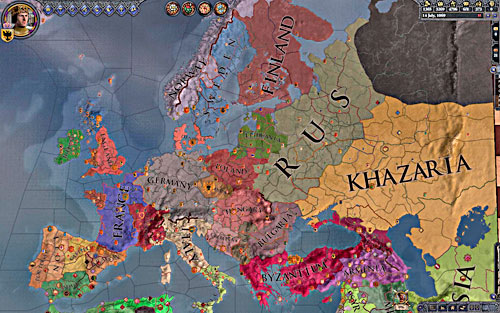 All kingdoms de jure.
All kingdoms de jure. The solution is very simple: become the king. Monarch can control subordinate dukes so giving them lands doesn't mean losing of control. That's why achieving a crown is essential for every duke.
Monarchs are the most important and influential persons in the game. There exist emperors but they're usually too busy with the internal affairs to make some ambitious actions. That's why, kings as owners of large lands and wide rights (e.g. royal laws in Laws) have very different methods to get and keep the power.
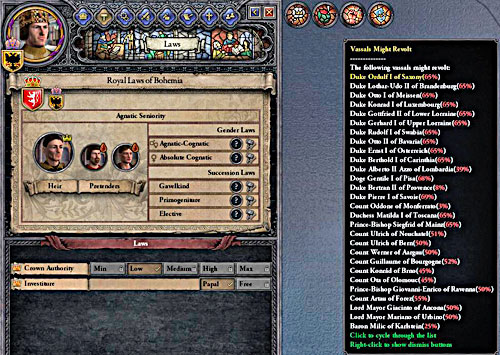 Monarchs and emperors have to fight constantly with their vassals and think about descendants.
Monarchs and emperors have to fight constantly with their vassals and think about descendants. Kings of course can use most of dukes and counts laws and possibilities(previous chapters) but besides that they have some challenges and problems typical for monarchs. Particularly troublesome is issue of keeping an order in the kingdom and succession: both are described below.
If you depend on one of emperors (Byzantium or Holy Roman) you can try to get their crown. You can do it in legal way, by convincing (if there is an election system: Riding on a Top: Duke: Election) or using a war (Military: How to declare a war: Taking over the crown). Despite pretences, usually the second solution is simplest, because it requires less funds: soldiers and mercenaries are cheaper than bribes for all electors.
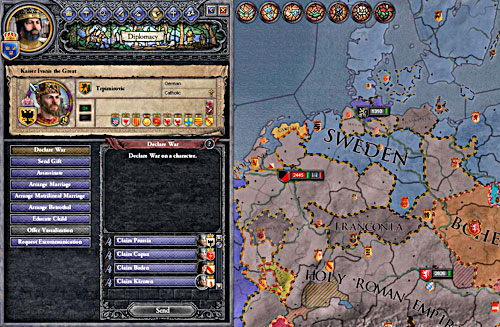 Although big part of empire belongs to the king of Sweden, he can't fight for the emperor's crown.
Although big part of empire belongs to the king of Sweden, he can't fight for the emperor's crown. Getting an emperor's crown when you're not his subject is a tough task. Above all, you can do it only thanks to the voting (if there is a election system) or marriage(other system: House: Marriages: How to get a title thanks to the marriage?). Coup d'etat isn't a solution, if you're not an emperor's subject. It's clearly seen on the screen above: although the king of Sweden has part of the Holy Roman Empire, he can't fight for taking it over.
There is nothing against having few crowns by one monarch: but remember, that only one of those will be his "main", in which he can dictates laws. You can choose the preferable country by clicking on its shield in every monet and unlimited number of times. It's crucial because all you kingdoms have their own political rules, often contradictory to one another. For instance in one kingdom is principate and in the second one seniority. As a ruler of few kingdoms you can decide about succession and royal laws in every of them but not about the normal ones (look: Laws).
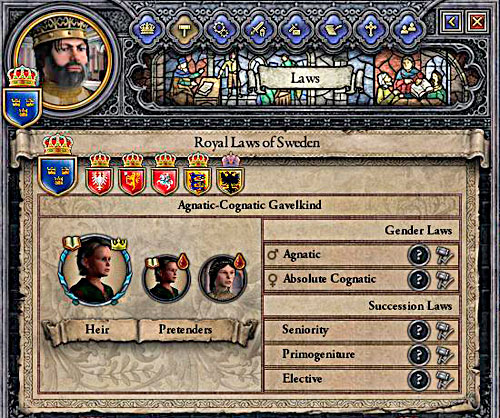 Five crowns and right to vote in the empire. Nice result for the count's grandson.
Five crowns and right to vote in the empire. Nice result for the count's grandson. Next crowns you achieve in the same way like the first one (Riding on a Top: Duke). But remember that every next kingdom makes your subjects more dissatisfied: they'll start demand honours for themselves.
Every player who has steered the monarch for some longer time, for sure met with subjects' revolts. King's vassals have an iritating tendency to set many revolts, separations and coups. When they declare war on you, you can just defeat them and take their lands, or just kill them. But real master of politics can prevent rebellions.
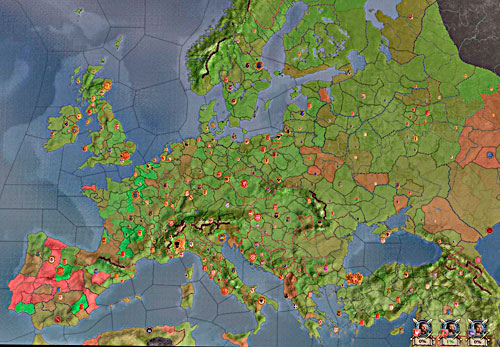 Characters' opinion you can learn by clicking on one of the map's filter (right bottom corner of the screen).
Characters' opinion you can learn by clicking on one of the map's filter (right bottom corner of the screen).First of all, you should use the game's advices. If an icon of the clenched fist appears it means, that part of vassals want to rebel: it's worth to interest about them. Especially useful are delicate methods of persuasion described in the chapter Characters: How to care about human relations? If it isn't enough, use the court spymaster who should detect most dangerous plots, what allows you to imprison plotters (look at: Intrigues: Ambitions and conspiracies, Council: Spymaster and Intrigues: Prisoners). Eventually if the risk of revolt is really danger, you can pass the troublesome vassal to someone else(Characters: How to care about human relations?) You can use an assassin too, of course.
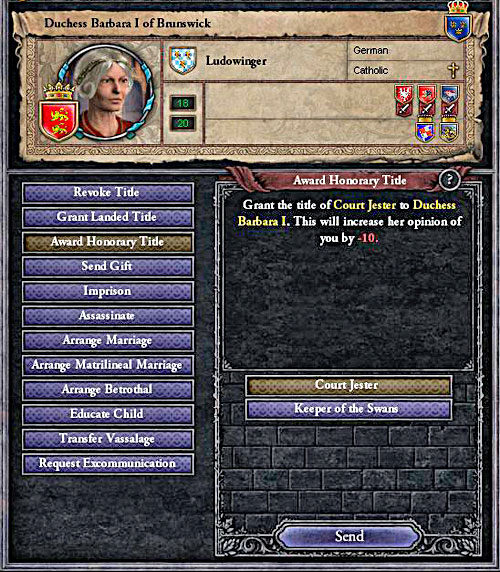 Iritating the subordinates may be profitable.
Iritating the subordinates may be profitable.After all, there are situations in which it's good to make the subordinates revolt. If vassal is old and has no chances for children and his lands will leave your domain according to the succession laws, it's good to provoke him to rebel. There is a one of Honorary Titles dedicated to such goal: court jester.
The basic problem of all kings is inability to pass their power to children: complicated succession, often in few kingdoms, doesn't make it easier. That's why you should care about vassal's opinion and choose such political system which provides non-problematic passing on the crown. The best is of course primogeniture but usually it's enough to have a principate. More about it you can read in the chapter Succession.
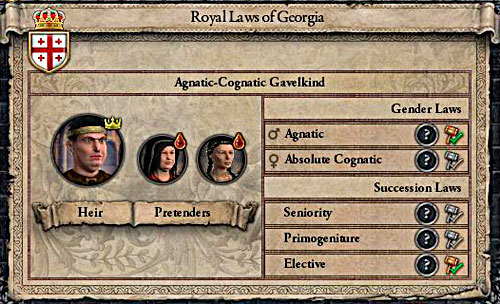 Laws are basic tools to pass on the power.
Laws are basic tools to pass on the power.Rules of passing on the power isn't all; you have to also provide a worthy living to your descendants. There is no secret that you should have minimal number of children what secures country before dividing it on parts and civil war. What is more, just before the death it's good to collect lot of lands which will be handed over the descendant, what makes his life easier. How? He'll be able to distribute those titles, what will calm enraged vassals. Of course methods from Characters: How to care about human relations? are also useful, but not that strong.
Emperors are rather problematic persons. On the one hand they have really huge countries, but on the other hand they have not so strong authority. When you play as an emperor most of time you sacrifice for fights with vassals and securing the crown for you descendants. It's very difficult, because law systems in both empires aren't too profitable and difficult to change. That's why, before starting any expansion or foreign politics at all, focus on what is happening in your territory.
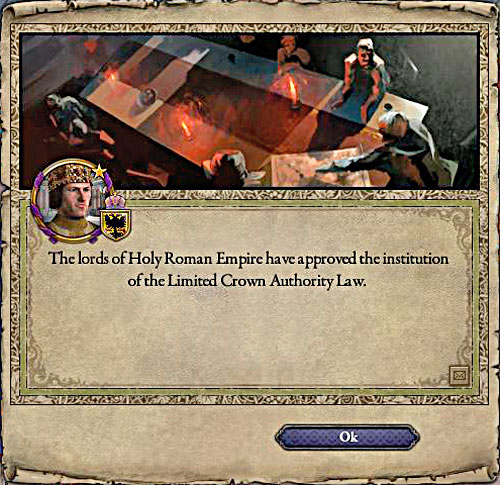 Only an emperor with enough authority can manage his empire properly.
Only an emperor with enough authority can manage his empire properly. Emperors are giants on clay legs: their power range is huge (the can control kings) but the possibility of exaction orders isn't that good. As a matter of fact, being an emperor means having constant wars and convincing vassals to you goals: it's not to attractive model of game. But when we secure our position, we can play like a monarch, but much more powerful.
When you play as a german emperor, the first thing to do are changing the crown authority and political system. At the beginning, the system in force is an election and the ruler has the minimal authority (look: Laws). To play comfortable, you need to change both those things. Usually it's better to start form changing an authority to the low (it lets you take lands away from vassals).
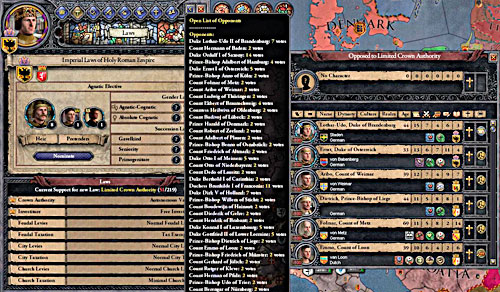 There are people to be convinced...
There are people to be convinced...This change is essential. Without it you can't take the lands from vassals what means that you have no tool of persuasion. Collecting lot of lands and distributing it to the most important persons in the country is a base, only thanks to that you can count on serious changes in the empire. During convincing nobles it's even good to hand over them the most precious lands, because changing the political system is much more important. So bribe as many voters as you can, using all available methods.
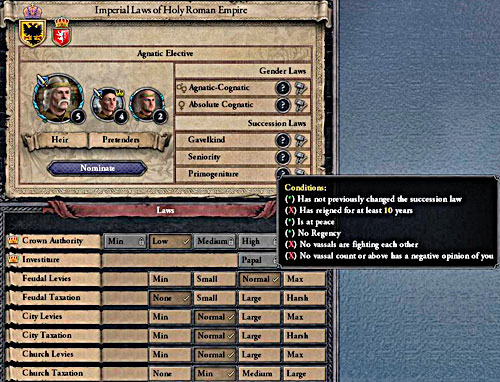
You have to fullfill all six terms (look at: House: Succession: Principate).
When you set low crown authority you have to change the succession way from election to the principate (look at: House: Succession: Principate). Only then you can be sure that the emperor's crown will be handed over your son. To change the political system, you have to care about positive relations with all vassals, beginning from the counts and above (list of them you can see after clicking on the emperor) do not be at war and wait until vassals stop fighting with each other (it's one of the terms). The last one term can be very problematic, because the empire is almost constantly bathed in blood. So, if you fullfill all conditions besides this one, consider killing an annoying vassal, what should stop the war and let you change the law.
Byzantium Basileus is in much better situation than his german equivalent. From the beginning he has high crown authority (it's even worth to decrease it!) and principate as an actual rule of succession. So internal problems goes to the background (you deal with them just like the king) and the external politics gets on meaning. Byzantium is surrounded by enemies from almost every direction. Especially dangerous are Muslim rulers, who often decides on jihad or just invade Greek estates. Fight with Arabs is an essential part of the game over your politics.
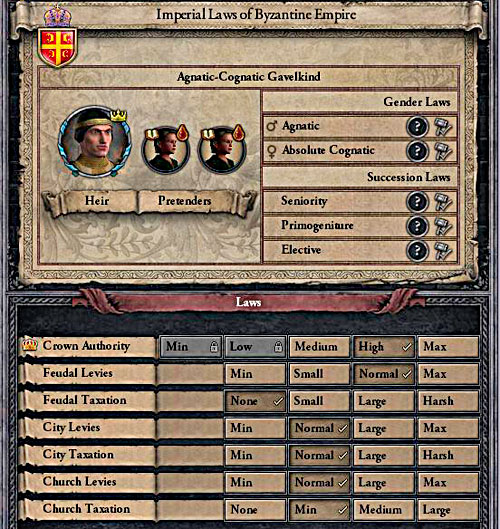 Laws in Byzantium are more than beneficial.
Laws in Byzantium are more than beneficial.A big problem for a Byzantium emperor is a fact that he is an orthodox, what causes distrust of catholic monarchs and simultaneously limited your possibilities. For instance orthodoxes can't summon knight orders. Change of a cult is a bad idea (look at: Religion: Problem?) because it means a civil war.
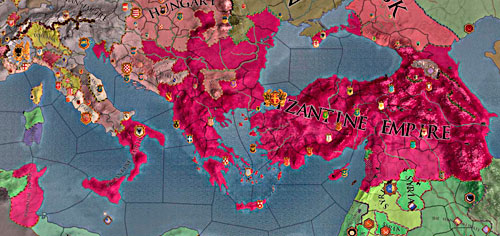 Roman Empire once again?
Roman Empire once again?Emperor's politics should be bipolar: you should conquer Arab's lands and addict from you as many catholic rulers as you can. It's easiest on the Italian Peninsula and northern Balkans, but you can try achieve some further lands (like Georgia or Hungary). It's quite simple as you can addict them from you and control them.
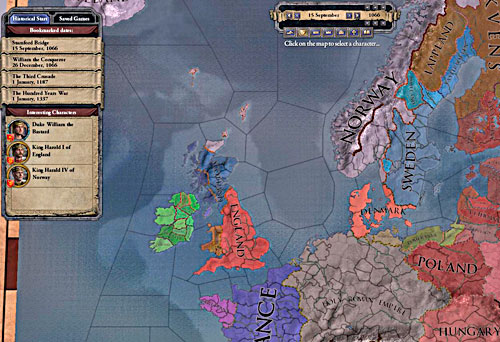 England was attacked from two sides.
England was attacked from two sides.First scenario took place in 1066 and tells about invasion of Wilhelm called also the Conquerer. You can play not only him, but also the legal king of England (Haroldem) or the Norwegian ruler, Harald.
Wilhelm's campaign is very simple: you just need to invade England and stay there. Admittedly, you have to fight with two enemies at once (Harold and Harald) but they are busy fighting with each other because of what they're not problematic.
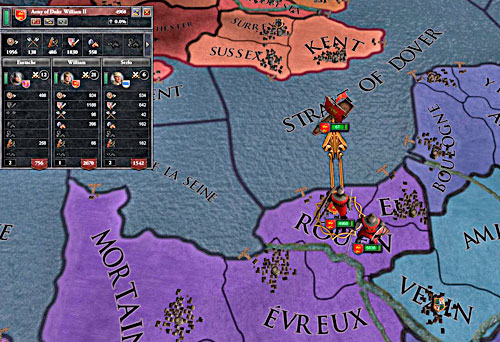 Two assaults groups are optimal.
Two assaults groups are optimal.The first thing to do is to throw your forces over the La Manche Channel. Usurper's army is so big, that it requires dividing on at least two parts or they won't get on ships. Ships you recruit by clicking on the seaside province and choosing the ship icon.
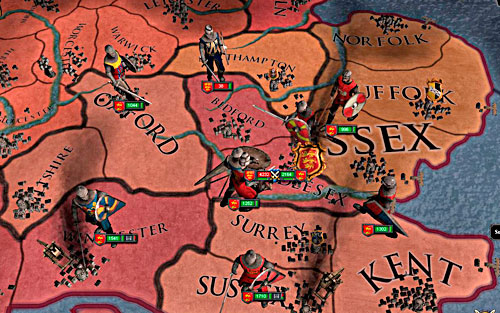 English has no chances against Conquerer.
English has no chances against Conquerer.After landing, you have to divide your armies ASAP to occupy the biggest territory they can in the lowest time. There is a small chance that Harold decides to defend. In such case, join troops into one powerful army and smash enemy. When the king is defeated divide your army again and continue sieges.
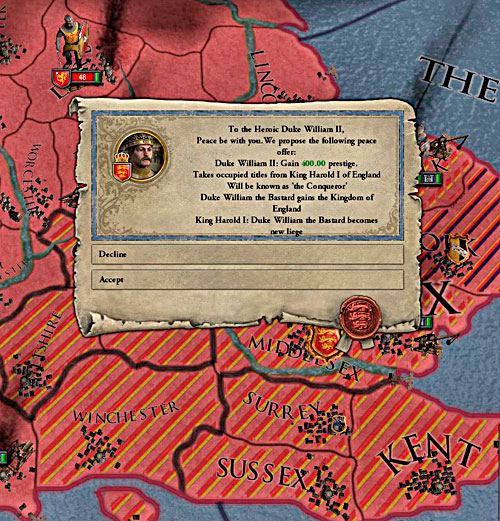 England won't stand long.
England won't stand long.The further course of the campaign is very easy: just conquer next lands and fight enemy's armies (also Norwegian!). Sooner or later Harold gives up and the crown goes to the Wilhelm. Then start a war with the Harald, Norwegian king. But it's better to send an assassin than take part in the open conflict. In such way conquest of the England ends and the normal game begins.
Harold's mission is the most difficult one. He has to defeat two invaders at once. Although he has a big army, he has no chances with any of opponents. That's why he shouldn't begin an open battle but use a trick. Most of described below option you can do during the active pause.
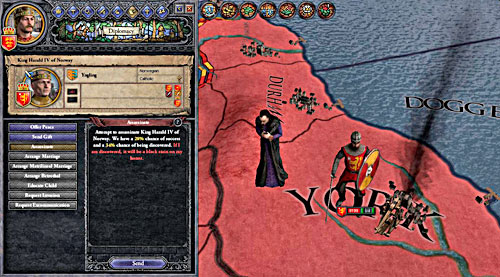 Harald is in the York, send a spymaster there.
Harald is in the York, send a spymaster there. First thing you should do is sending a court spymaster to the province with the Norwegian king. Agent should set up there a spy network. Then murder enemy's king what ends the war with Norway and your only problem remains Wilhelm.
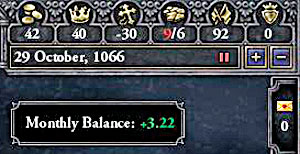
Next step should be... sending all of your army to homes. Cost of maintaining them is too high and sooner or later Harold will be bankrupt. After releasing him, kingdom starts generating incomes (screen above).
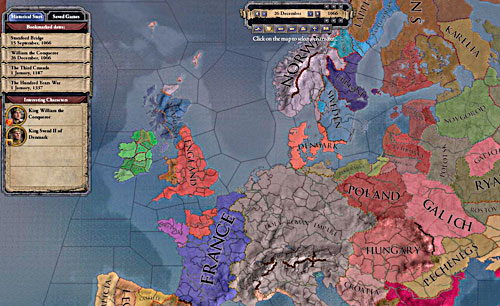 German princess is a good choice: she'll bring lot of money.
German princess is a good choice: she'll bring lot of money. But it's still to little gold: assassins are expensive (50 gold). Luckily, Harold has a son without wife, which you should change quickly. During choosing you should look at wed's age (she must be an adult!) and not an alliance, because no one will fight against Wilhelm. And that's why you should choose moneys as a just married gift.
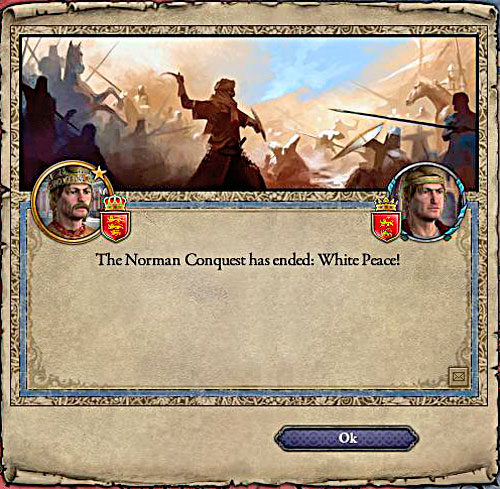 One dagger is worth more than thousands swords.
One dagger is worth more than thousands swords. When the wedding is done and you collect 50 gold, it's enough to kill Wilhelm (not-conqueror-any-longer) and play normally from now on.
Playing as a Norway is very easy: they have lot of gold and quite big army which is already on the enemy's territory. The only one problem is Wilhelm. There is possibility that he'll get the English crown first. Of course, we can't let that happen: assassinate him!
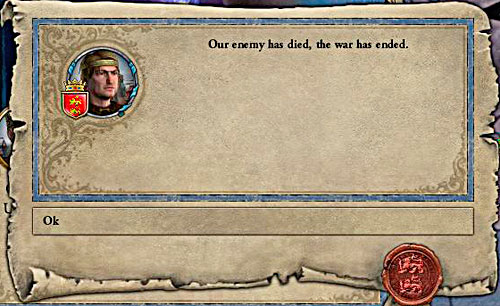 We need to get rid of an enemy, before he become our rival.
We need to get rid of an enemy, before he become our rival. When the Conqueror is dead, you have to wait in York for an English attack. Although Harold has bigger army, he'll lose the battle. Mainly because he had to cross the river. Of course, you have to chase him and kill all people you can. It'll make our further expansion easier.
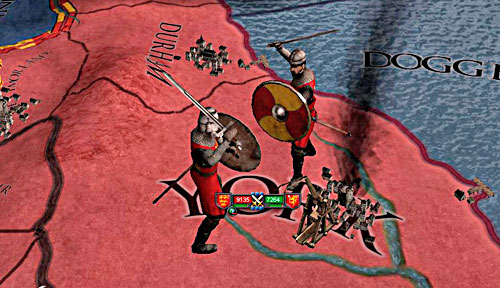 Battle of Stamford Bridge.
Battle of Stamford Bridge. After destroying main English forces you have to be as bossy as you can and attack as many castles as it possible simultaneously. If your forces are too small, you can hire mercenaries.
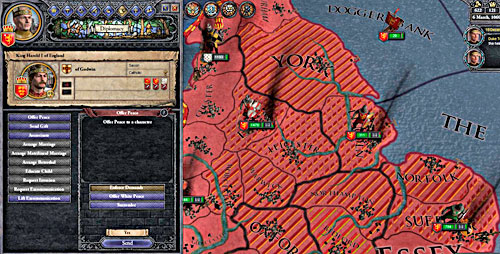 Dispersed forces means victory.
Dispersed forces means victory.Next you just have to look after sieges and wait until Harold gives up. But remember that castles are sieged only if there is more attackers than defenders.
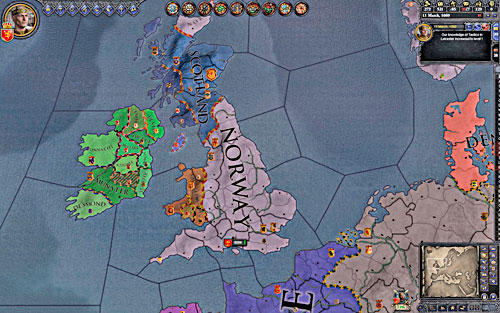 Vikings win!
Vikings win!When the war ends, Norway gains new lands and king can start thinking about further invasions.
 You can start game in the 1067, it doesn't matter for real.
You can start game in the 1067, it doesn't matter for real. Scenario begins at the moment of Wilhelm's the Conquerer win and has no assumptions, it's just a sandbox. Only player decides what he'll do. Below you can find few suggestions.
Firstly, even before you unclick the pause, you should calm enraged subjects. Wilhelm has a lot of lands so he should distribute it (but not more than one land per person). If it isn't enough, use Honorary Titles.
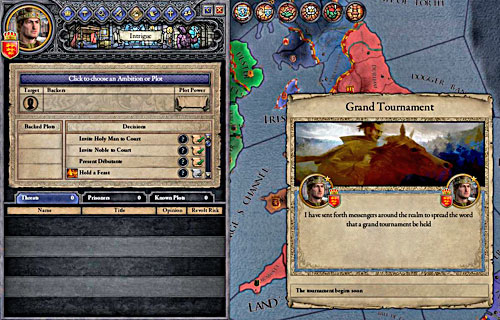 Grand Tournament is a good way to calm subordinates.
Grand Tournament is a good way to calm subordinates. When the disturbances are the past, you can create few duchies: they'll guarantee a flow of prestige points and can be useful in the future.
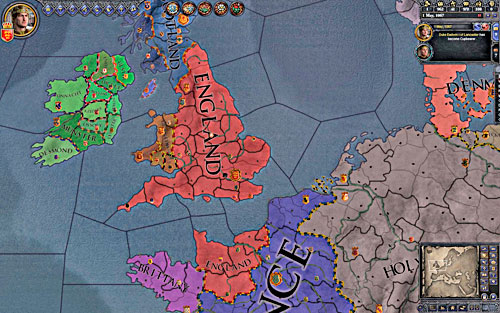 Wilhelm has to care not only about England but also about his lands in the Normandy.
Wilhelm has to care not only about England but also about his lands in the Normandy. Further on you can play in normally way, just as it is described in the main part of the guide.
Svend, Danish king has rights to the English throne and he can take it over from Wilhelm the Conquerer. It's difficult and tiresome task, but possible (if you're patient enough).
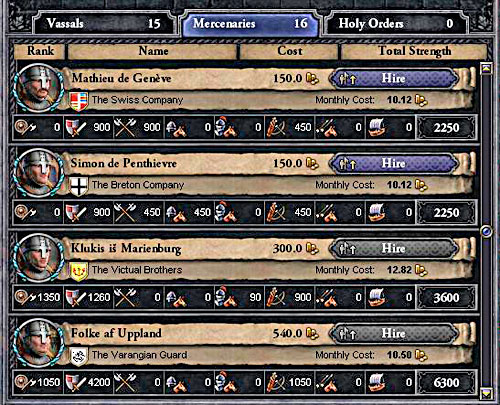 Without mercenaries you have no chances.
Without mercenaries you have no chances. You should begin from few marriages: it won't end up with any alliance but infusion of money will be useful. You can think also about changing crown authority for some higher or about increasing number of troops your subordinates should sent you. Then prepare to the war, there is no sense in waiting with it, because only at the beginning Wilhelm is rather vulnerable (few civil wars). Later it will be much more difficult task.
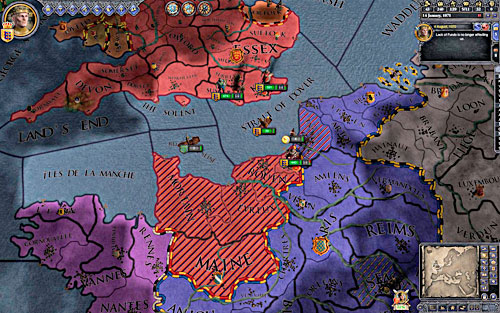 Normandy is essential not only in the Mass Effect.
Normandy is essential not only in the Mass Effect. Invasion you should begin in the Normandy. Why? Simple: on Islands Wilhelm has most of his army and you wouldn't have chances (Wilhelm has huge amount of money, which he spends on mercenaries).
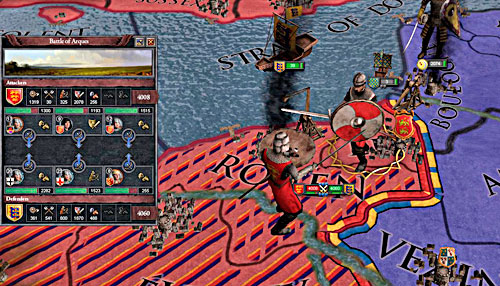 English will for sure try to regain their Normandian lands.
English will for sure try to regain their Normandian lands. When Wilhelm see what's happening, he'll try to rescue his lands. In this moment Svend should hire mercenaries and send them to the Normandy. Even if they die, they should stop enemy's counterattack. Only this is their task.
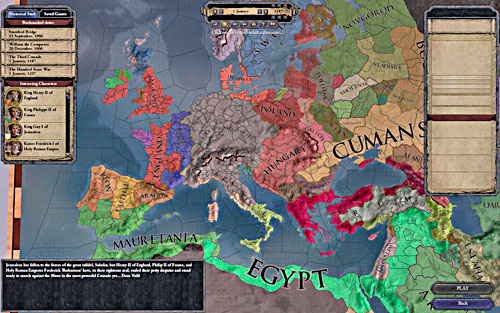 Constant attacking enemies coasts should be effective.
Constant attacking enemies coasts should be effective. If you keep Normandy, you can attack British Islands, but the important is to do so in few places at once. When enemy's forces will be getting closer, move your troops to the ships. Loading is quicker than march, so you can easily overtake Wilhelm about few steps.
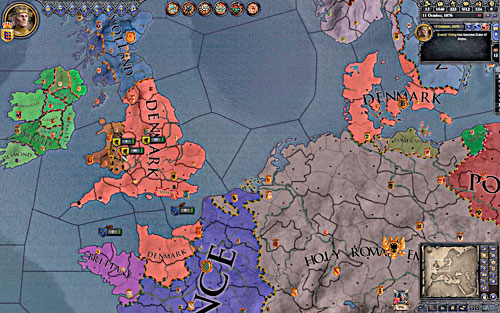 Denmark is a power!
Denmark is a power!Your lands in Normandy are crucial: with every day they increase you point advantage, and when it reach 100 points, you can finish war and take over the English crown.
 World full of challenges.
World full of challenges.The Third Crusade is also a sandbox. There are no wars (at least at the beginning) and there are no forced goals. You can do whatever you want.
England, France, Germany and Hungary are countries who are busy with their own affairs and don't have to take part in the events on the Near East. In principle, they have no interest there any no claims. That's why play those factions as in sandbox: make yourself a goal and try to fullfill it.
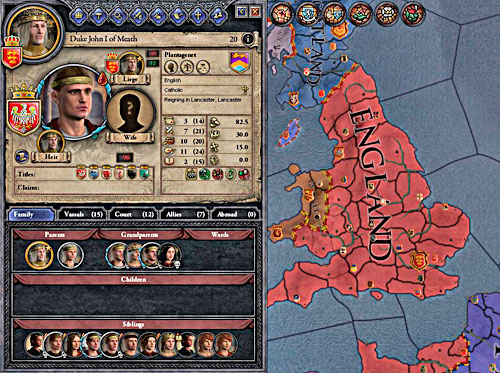 At the beginning, decrease number of descendants.
At the beginning, decrease number of descendants. Independently from what you want to do, begin from calming subordinates. You can distribute titles and bribe subjects. When it's done, you can start normal gaming. What is worth to say, that the most of vassals have no descendants so their lands will be yours again after their death. Sometimes it's useful to speed up their kicking the calendar.
Jerusalem is a real sieged fortress: playing this fraction means constant defending against hordes of infidels. It's problematic, because most of your kingdom is also muslim, and revolts often. That's why fast converting of the subjects is sth essential.
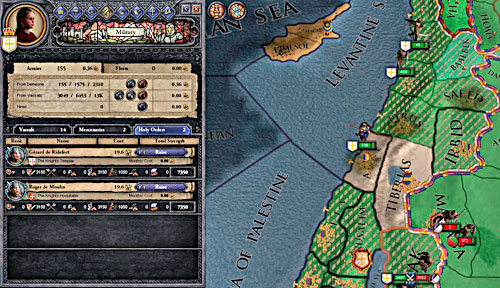 Most of citizens are muslims: without mercenaries and knight orders it's hard to create sensible army.
Most of citizens are muslims: without mercenaries and knight orders it's hard to create sensible army. The only hope lies in knight orders: you can hire for little piety points and as you're defender, it'll be very cheap. Also vassals can be useful here, they can bring up more troops than the king.
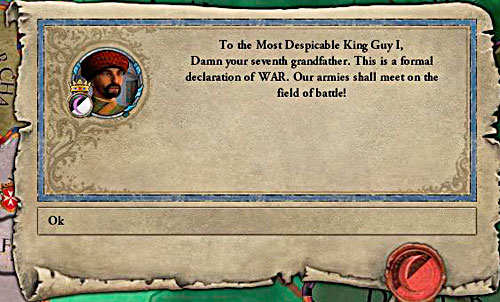 This statement is so often, that you'll stop noticing it.
This statement is so often, that you'll stop noticing it. Despite it, playing as a Jerusalem isn't too attractive. Even if you protect yourself with alliances it's almost totally concentrated on defending your lands. You can't even direct any advanced politics because of thousands Arabs attacking from every direction.
Byzantium is in the similar situation to the Jerusalem, but it can't count on knight orders and allies from Europe (catholics don't like orthodoxes). What is more, emperor has to take into account strong internal opposition, mostly because high crown authority (which you should lower ASAP).
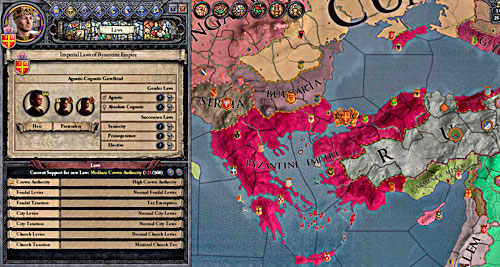 Vassals will be against even if the new regulations will work for them.
Vassals will be against even if the new regulations will work for them. Byzantium has no claims and no declared war, so it can leads the politics in the various ways. Recommended is calming social disturbances (by land distribution) and softening of laws. Then you can think about conquering Rum (it's independent from two caliphats, so it's rather easy target). Conquered lands should open gates to the further expansion.
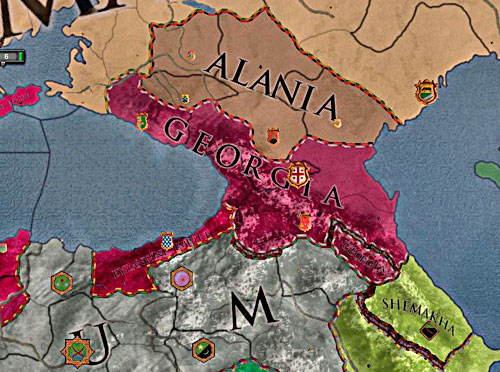 Georgia can be useful ally during wars with infidels, especially in case of the Rum.
Georgia can be useful ally during wars with infidels, especially in case of the Rum. The only country with which you can make a solid alliance is Georgia, the orthodox country on the east from Byzantium. But it's rather tiny helper than war titan.
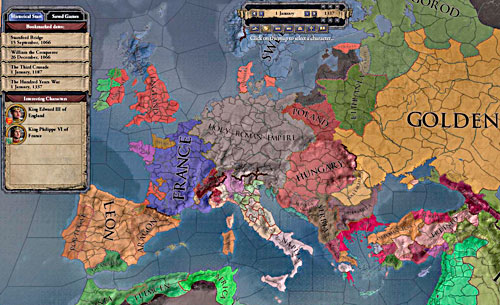
During the Hundred Years War there are two sides of conflict: England and France. Although there is no war, the conflict is unavoidable.
England has big army advantage thanks to which they have no problems with defeating French. You should attack from two directions: through the La Manche Channel (most forces from Islands) and near Bordeaux (part of your lands). Rushing from two sides, you'll flank enemy.
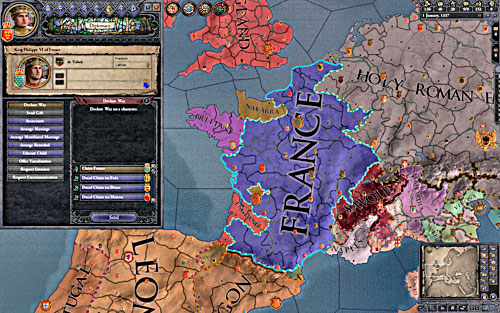 Be ambitious!
Be ambitious!Enemy has very big armies, with at least 10 thousand soldiers each. So you have to make your troops at least that numerous. Despite that, it's worth to march widely, what increases tempo of conquering. Most of French garrisons have big crews (2000 people) so their conquering will be time consuming and demanding.
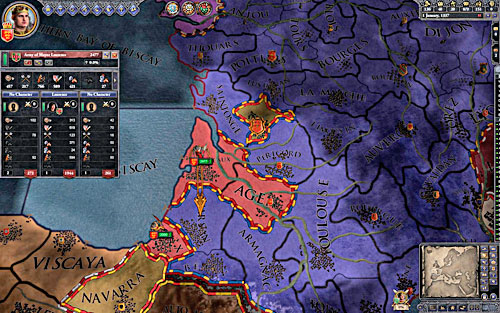 One of attacks should go from the south, it should surprise an enemy.
One of attacks should go from the south, it should surprise an enemy. The Hundred Years War doesn't require too much finesse. You just need to crush enemy with number of your armies and conquer his castles. Mercenaries are also useful, so use them often!
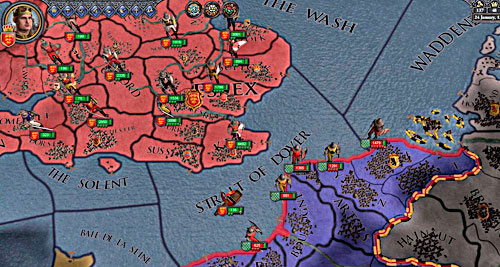 French expect invasion. Smash them!
French expect invasion. Smash them!During fighting with the Philip VI (king of France) you can act like a saboteur: harm his relations with subjects (chancellor's ability), kill his nobles and even king himself (it doesn't end the war!). It can be useful, especially that the next king will have to fight against rebelled vassals.
I'd like to write sth about heroic French defence, but it is nonsense. They shouldn't start the war at all. Enemy has huge advantage in army, money and influences. Also in the case of losing nothing terrible happens to them: they'll just lose rights to the French crown. If French lose, English will conquer all their country.
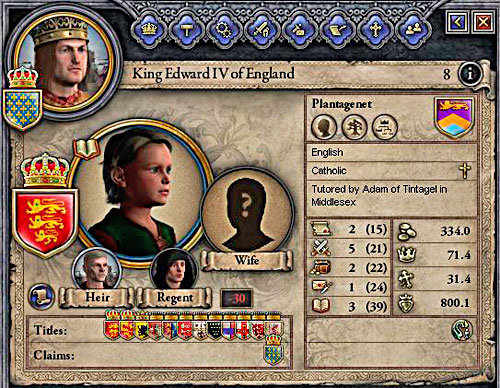 Edward's son also has rights to the French crown.
Edward's son also has rights to the French crown. Is there any way out? Yes, you just need to kill king of England, Edward III and his son (who also has rights to the French crown). In this simple way you can end the conflict which could last many years and ends (in the best case!) with the status quo. That's why finish the issue once for good with an assassination.
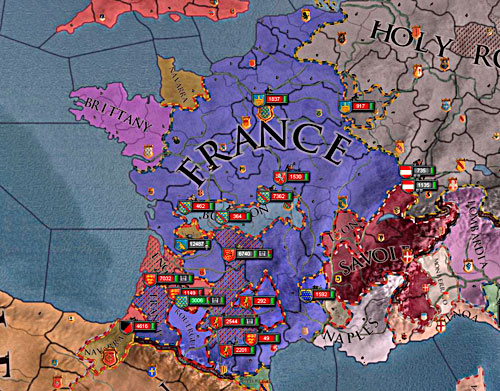 English invasion and civil war. What more do you need?
English invasion and civil war. What more do you need? If anyone tries to fight with England anyway, I have small remark. Edward III will do everything to reach the crown, even to the assassination. What is curious, if the king of France dies, the war doesn't end, because it's about the kingdom which is something more than a private property. Of course when the Philip VI dies and the crown goes to his son, almost all of his vassals will declare a civil war. With such opposition you have no chances at all.


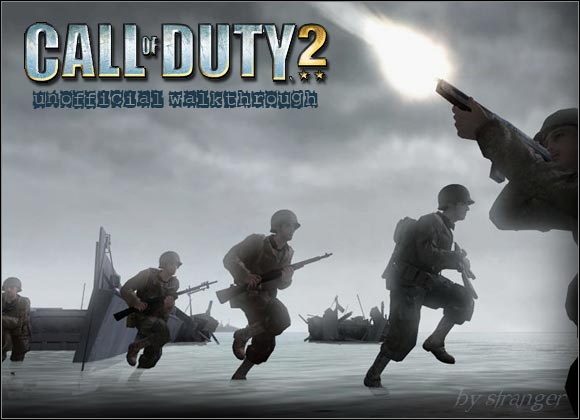

 Call of Duty: Modern Warfare 2 Game Guide & Walkthrough
Call of Duty: Modern Warfare 2 Game Guide & Walkthrough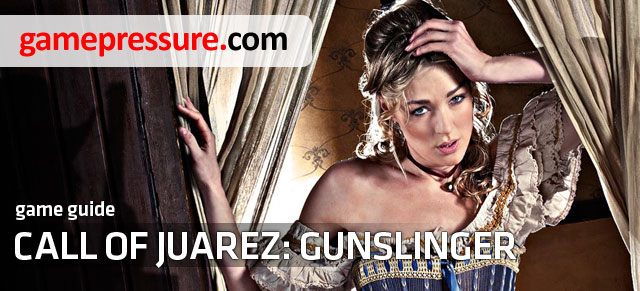 Call of Juarez: Gunslinger Game Guide & Walkthrough
Call of Juarez: Gunslinger Game Guide & Walkthrough Cube World Game Guide & Walkthrough
Cube World Game Guide & Walkthrough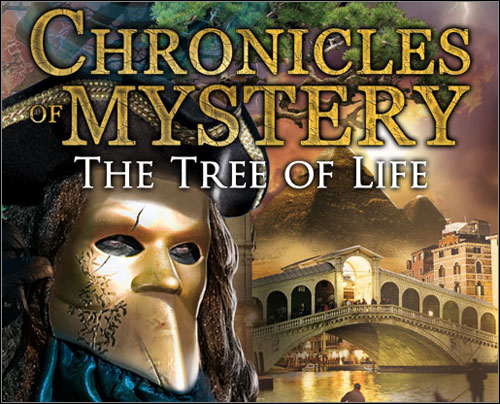 Chronicles of Mystery: The Tree of Life Game Guide & Walkthrough
Chronicles of Mystery: The Tree of Life Game Guide & Walkthrough Colin McRae: DIRT Game Guide & Walkthrough
Colin McRae: DIRT Game Guide & Walkthrough